Содержание
- 2. Modern English Part II 1. Sentences 2. Adverbial Clauses 3. Adjective Clauses 4. Noun Clauses 5.
- 3. Objectives The objective of this course is to help students learn English grammatical points by means
- 4. Status This course emphasizes on the structure of English sentences and provides the students with information
- 5. 1. Sentences
- 6. Types of Sentences 1. Simple sentence Contains one full subject and predicate. Takes the form of:
- 7. Types of Sentences a request Please close the door. (The subject you is understood.) an exclamation
- 8. Types of Sentences 2. Compound sentence Contains two or more sentences joined into one by: Cont…
- 9. Types of Sentences Cont…
- 10. Types of Sentences When such sentences are joined coordinately, they are each called independent clauses. 3.
- 11. Types of Sentences A dependent clause contains a full subject and predicate beginning with a word
- 12. Types of Sentences Cont…
- 13. Types of Sentences 3. Compound-complex sentence - Contains two or more independent clauses and one or
- 14. Coordination within sentences – WITH AND, or BUT
- 15. Subordination within sentences – Nominal, Adjectival, or Adverbial Elements
- 16. Subordination within sentences – Nominal, Adjectival, or Adverbial Elements Cont…
- 17. Subordination within sentences – Nominal, Adjectival, or Adverbial Elements Cont…
- 18. Subordination within sentences – Nominal, Adjectival, or Adverbial Elements Cont…
- 19. Types of Sentences A phrase consists of a group of words performing a single function. A
- 20. Types of Sentences A phrase that begins with a form from a verb (either a participle
- 21. 1.1 Requests and Commands (Imperative Mood) The simple form of the verb is used for requests,
- 22. 1.1 Requests and Commands (Imperative Mood) First and second person together: Let’s open the door. Let’s
- 23. 1.1 Requests and Commands (Imperative Mood) An adverb may precede the imperative verb: Always open that
- 24. 1.1 Requests and Commands (Imperative Mood) Changing sentences to imperative form. Example: a) You must cook
- 25. 1.1 Requests and Commands (Imperative Mood) b) You shouldn’t do your homework when you’re tired. Don’t
- 26. 1.1 Requests and Commands (Imperative Mood) Other examples: a) You will first go to the post
- 27. 1.1 Requests and Commands (Imperative Mood) b) To get the right color, you must mix equal
- 28. 1.1 Requests and Commands (Imperative Mood) c) You and I should take care of this right
- 29. 1.2 Exclamatory Sentences Exclamations may begin with what or how. What – a noun ends the
- 30. 1.2 Exclamatory Sentences How – an adjective or adverb ends the exclamatory phrase How graceful she
- 31. 1.2 Exclamatory Sentences The subject and the verb in an exclamatory sentence retain normal word order
- 32. 1.2 Exclamatory Sentences Changing some statements to exclamations. Example: a) She has a pleasant personality What
- 33. 1.2 Exclamatory Sentences Other examples: a) She has long eyelashes. What long eyelashes she has! b)
- 34. 1.2 Exclamatory Sentences Notes: 1) Use how with much, many. How many books this author has
- 35. 1.3 Joining Sentences Coordinately (Compound Sentences) Sentences or clauses may be joined coordinately by punctuation alone,
- 36. 1.3 Joining Sentences Coordinately (Compound Sentences) Cont…
- 37. 1.3 Joining Sentences Coordinately (Compound Sentences) Cont… Note that a semicolon replaces the period of the
- 38. 1.3 Joining Sentences Coordinately (Compound Sentences) If both clauses are short, the comma may be omitted
- 39. 1.3 Joining Sentences Coordinately (Compound Sentences) Combining sentences in the three ways - by punctuation alone,
- 40. 1.3 Joining Sentences Coordinately (Compound Sentences) John was sick, but he came to school. (Anyhow is
- 41. 1.4 Joining Sentences with Conjunctive Adverbs (Compound Sentences) Conjunctive Adverbs
- 42. 1.4 Joining Sentences with Conjunctive Adverbs (Compound Sentences) A. Combining sentences with the conjunctive adverbs. Moreover,
- 43. 1.4 Joining Sentences with Conjunctive Adverbs (Compound Sentences) Otherwise Example: We must all eat the proper
- 44. 1.4 Joining Sentences with Conjunctive Adverbs (Compound Sentences) B. Joining sentences by the coordinate conjunctions and,
- 45. 1.4 Joining Sentences with Conjunctive Adverbs (Compound Sentences) Mr. Smith is an intelligent and stimulating teacher,
- 46. 1.4 Joining Sentences with Conjunctive Adverbs (Compound Sentences) c) but (concession) There are many people who
- 47. 1.4 Joining Sentences with Conjunctive Adverbs (Compound Sentences) or I cannot give you an order for
- 48. 1.4 Joining Sentences with Conjunctive Adverbs (Compound Sentences) C. Joining sentences by the subordinate conjunctions if,
- 49. 1.4 Joining Sentences with Conjunctive Adverbs (Compound Sentences) b) although (concession) Although there are many people
- 50. 1.4 Joining Sentences with Conjunctive Adverbs (Compound Sentences) c) because (cause) Because there is no demand
- 51. 1.5 Abridgements in Clauses of Short Agreement Clauses may be abridged by substituting an auxiliary for
- 52. 1.5 Abridgements in Clauses of Short Agreement Cont… Such abridgement is especially common in clauses of
- 53. 1.5 Abridgements in Clauses of Short Agreement Cont…
- 54. 1.5 Abridgements in Clauses of Short Agreement Cont… Note the reversal of subject and auxiliary after
- 55. 1.6 Parallel Construction Word, phrases, or clauses joined by the coordinate conjunctions and, or, but have
- 56. 1.6 Parallel Construction Her long illness and slow recovery made her very despondent. She doesn’t like
- 57. 1.6 Parallel Construction Parallel forms are also required with the paired coordinate conjunctions (correlatives) – both…and,
- 58. 1.6 Parallel Construction Elements contrasted with not are likewise put in parallel form. He always does
- 59. 1.6 Parallel Construction Exercise: Correct the item in parentheses so that they are grammatically parallel to
- 60. 1.6 Parallel Construction Example: I like the painting but not (how it is framed). I like
- 61. 1.6 Parallel Construction 1. He spends his summer weekends either playing tennis or (at the beach).
- 62. 1.6 Parallel Construction 2. Wanting to accomplish something and (if you actually accomplish it) may not
- 63. 1.7 “Dangling” Constructions Many introductory structures that do not contain their own “subjects” within them depend
- 64. 1.7 “Dangling” Constructions Preparing breakfast in too much of a hurry, she burned the toast. After
- 65. 1.7 “Dangling” Constructions Such introductory elements usually correspond to the predicate parts of simple sentences. If
- 66. 1.7 “Dangling” Constructions Examples: Preparing breakfast in too much of a hurry, the toast was burned.
- 67. 2. Adverbial Clauses
- 68. Cont… 2. Adverbial Clauses
- 69. Cont… 2. Adverbial Clauses
- 70. Cont… 2. Adverbial Clauses
- 71. Cont… 2. Adverbial Clauses
- 72. Cont… 2. Adverbial Clauses
- 73. Cont… 2. Adverbial Clauses
- 74. 2.1 Types of Adverbial Clauses An adverbial clause consists of a subject and predicate introduced by
- 75. 2.1 Types of Adverbial Clauses Examples: I was in south America last year. During this time
- 76. 2.1 Types of Adverbial Clauses While (or When) I was in South America last year, I
- 77. 2.2 Verbs in Time Clauses: Future Time The present tense is used in clauses expressing future
- 78. 2.2 Verbs in Time Clauses: Future Time The present perfect tense may occur in future time
- 79. 2.3 Verbs in Time Clauses: Past Time A past when clause may be used either with
- 80. 2.3 Verbs in Time Clauses: Past Time
- 81. 2.3 Verbs in Time Clauses: Past Time
- 82. 2.4 Conditional Clauses with Unless In may sentences, unless is the equivalent of if…not.
- 83. 2.4 Conditional Clauses with Unless If you don’t get off my property, I’ll call the police.
- 84. 2.5 Real Conditions (1) Future Time Real conditions are conditions that are possible to be realized.
- 85. 2.5 Real Conditions (1) Future Time 1) With future main verb – If the weather is
- 86. 2.6 Real Conditions (2): General Time Real conditions may be used in general statements about repeated
- 87. 2.6 Real Conditions (2): General Time Cont…
- 88. 2.6 Real Conditions (2): General Time Note that for general time, the present tense is used
- 89. 2.7 Unreal Conditions (Contrary to Fact) Cont… Such conditions are either impossible to realize or are
- 90. 2.7 Unreal Conditions (Contrary to Fact) Cont…
- 91. 2.8 Conditional Clauses Beginning with Were, Had, Should In unreal conditions, and in real conditions with
- 92. 2.8 Conditional Clauses Beginning with Were, Had, Should If we had known about this sooner, or
- 93. 2.8 Conditional Clauses Beginning with Were, Had, Should If you should need more money, or Should
- 94. 2.9 Mixed Time In Unreal Conditions A conditional clause containing a past unreal form may be
- 95. 2.9 Mixed Time In Unreal Conditions If the boy had listened to his parents last year,
- 96. 2.9 Mixed Time In Unreal Conditions More Examples: 1) I would be angry if you had
- 97. 2.10 Unreal Conditions in Sentences with But, Or, Otherwise Unreal conditions may be put in a
- 98. 2.10 Unreal Conditions in Sentences with But, Or, Otherwise 1) Present unreal condition – If I
- 99. 2.10 Unreal Conditions in Sentences with But, Or, Otherwise I don’t know his address, or I
- 100. 2.10 Unreal Conditions in Sentences with But, Or, Otherwise 2) Past unreal condition – If I
- 101. 2.10 Unreal Conditions in Sentences with But, Or, Otherwise I didn’t know his address, or I
- 102. 2.11 Adverbial Clauses of Result with So, Such, Such A Cont…
- 103. 2.11 Adverbial Clauses of Result with So, Such, Such A Cont…
- 104. 2.11 Adverbial Clauses of Result with So, Such, Such A Cont… But: so much trouble, so
- 105. 2.12 Adverbial Clauses of Manner The verbs in manner clauses beginning with as if or as
- 106. 2.12 Adverbial Clauses of Manner The subjunctive forms indicate that the speaker is more doubtful about
- 107. 2.12 Adverbial Clauses of Manner Cont…
- 108. 2.12 Adverbial Clauses of Manner The past subjunctive refers to time that is simultaneous with that
- 109. 2.12 Adverbial Clauses of Manner Exercise: Replace this way in the first sentence with a manner
- 110. 2.12 Adverbial Clauses of Manner Cont… Examples:
- 111. 2.12 Adverbial Clauses of Manner Cont…
- 112. 2.12 Adverbial Clauses of Manner Cont…
- 113. 2.13 Phrasal Conjunctions in Adverbial Clauses Cont…
- 114. 2.13 Phrasal Conjunctions in Adverbial Clauses Cont…
- 115. 2.13 Phrasal Conjunctions in Adverbial Clauses Cont…
- 116. 3. Adjective Clauses
- 117. Cont… Adjective Clauses
- 118. Cont… Adjective Clauses
- 119. Cont… Adjective Clauses
- 120. Cont… Adjective Clauses
- 121. Cont… Adjective Clauses
- 122. Cont… Adjective Clauses
- 123. Adjective clauses are also called relative clauses. Other words that may introduce adjective clauses are: Adjective
- 124. Cont… Adjective Clauses
- 125. An adjective clause consists of a subject and a predicate that modifies a preceding noun or
- 126. The introductory word who or that refers to a person, which or that to a thing,
- 127. 3.2 Punctuation of Adjective Clauses Cont…
- 128. 3.2 Punctuation of Adjective Clauses Cont…
- 129. 3.2 Punctuation of Adjective Clauses Cont…
- 130. 3.3 Case of Relative Pronouns Introducing Adjective Clauses Cont…
- 131. 3.3 Case of Relative Pronouns Introducing Adjective Clauses Cont…
- 132. 3.3 Case of Relative Pronouns Introducing Adjective Clauses Cont…
- 133. 3.3 Case of Relative Pronouns Introducing Adjective Clauses Cont…
- 134. 3.4 Relative Pronouns as Object of Prepositions Examples:
- 135. 3.5 Relative Pronouns Patterning Like Some of Which
- 136. 3.5 Relative Pronouns Patterning Like Some of Which
- 137. 3.6 Number of the Verb after a Phrase Beginning with One of The
- 138. 3.6 Number of the Verb after a Phrase Beginning with One of The
- 139. 3.8 Adjective Clauses Used in Definition
- 140. 3.8 Adjective Clauses Used in Definition Cont…
- 141. 4. Noun Clauses
- 142. Cont… Noun Clauses
- 143. Cont… Noun Clauses
- 144. Cont… Noun Clauses
- 145. Cont… Noun Clauses
- 146. Cont… Noun Clauses
- 147. 4.1 Sequence of Tenses in Noun Clauses (1) A noun clause consists of a subject and
- 148. 4.1 Sequence of Tenses in Noun Clauses (1) One of its most common functions is as
- 149. 4.1 Sequence of Tenses in Noun Clauses (1) If such a verb in the past tense,
- 150. 4.1 Sequence of Tenses in Noun Clauses (1) Cont…
- 151. 4.1 Sequence of Tenses in Noun Clauses (1) B. Indirect Speech – Noun Clauses from Questions
- 152. 4.2 Sequence of Tenses in Noun Clauses (2) Example: He denies that he took the money.
- 153. 4.3 Noun Clauses Objects From Statements, Questions, Exclamations Example: a) The package has arrived. He said
- 154. 4.3 Noun Clauses Objects From Statements, Questions, Exclamations Example: b) Can they afford to buy a
- 155. 4.3 Noun Clauses Objects From Statements, Questions, Exclamations Example: d) What a terrible cold she has!
- 156. 4.4 Noun Clauses After Wish (1) Referring to Present Time After the verb wish, a that
- 157. 4.4 Noun Clauses After Wish (1) Referring to Present Time Wishes referring to present time are
- 158. Wishes with WOULD Wishes with would often represent present-to-future time. Would is used for a wish
- 159. 4.5 Noun Clauses After Wish (2) Referring To Past Time Wishes referring to past time are
- 160. 4.5 Noun Clauses After Wish (2) Referring To Past Time Example: 1) She lives in the
- 161. 4.6 Noun Clauses With Infinitive Abridgement Abridgement with infinitives occurs most often with noun clause objects
- 162. 4.6 Noun Clauses With Infinitive Abridgement The agent in an abridged noun clause object is either:
- 163. 4.6 Noun Clauses With Infinitive Abridgement 2) the object of the main verb He told me
- 164. 4.7 That Clauses After Verbs of Urgency That clauses after verbs like suggest, request, require, urge,
- 165. 4.7 That Clauses After Verbs of Urgency This simple form is used regardless of the tense
- 166. 4.8 That Clauses After Adjectives of Urgency The simple form of the verb is used in
- 167. 4.8 That Clauses After Adjectives of Urgency It is important that each student fill out a
- 168. 4.9 Changing Famous Statements To Indirect Speech Exercise: Changing statements into indirect speech by making each
- 169. 4.9 Changing Famous Statements To Indirect Speech Example: 1) Fools rush in where angels fear to
- 170. 4.10 Changing Famous Statements To Indirect Speech Example: 2) God helps those that help themselves. (Benjamin
- 171. 4.10 Changing Famous Statements To Indirect Speech Example: 3) Poverty is the parent of revolution and
- 172. 5. Participial Phrases
- 173. Cont… Participial Phrases
- 174. Cont… Participial Phrases Position of Participle: After the noun being modified
- 175. Cont… Participial Phrases
- 176. Cont… Participial Phrases
- 177. Cont… Participial Phrases
- 178. Cont… Participial Phrases
- 179. Cont… Participial Phrases
- 180. Cont… Participial Phrases
- 181. 5.1 Forms of Participles (1)
- 182. 5.1 Forms of Participles (1)
- 183. 5.1 Forms of Participles (1) Participles are made negative by placing not before them – not
- 184. 5.1 Forms of Participles (1) Present Participle (example, offering) The time of the main verb determines
- 185. 5.1 Forms of Participles (1) Example: The woman who is washing the dishes is our new
- 186. 5.1 Forms of Participles (1) Past Participle (example, offered) The time of the main verb determines
- 187. 5.1 Forms of Participles (1) Example: Doctors often recommend rabies shots for anyone who is bitten
- 188. 5.1 Forms of Participles (1) Progressive Passive Participle (example, being offered) This participle expresses present action.
- 189. 5.1 Forms of Participles (1) Perfect Participial Forms (examples, having offered, having been offering, having been
- 190. 5.1 Forms of Participles (1) Example: Anyone who has talked to him once will be convinced
- 191. 5.2 Forms of Participles (2) Exercise: Change the adjective clauses to participial phrases, using one of
- 192. 5.2 Forms of Participles (2) 1) The girl who is making the most noise is my
- 193. 5.2 Forms of Participles (2) 2) The general, who had been warned of the enemy’s approaching
- 194. 5.3 Punctuation And Position Of Participial Phrases Participial phrases that appear after the nouns they modify
- 195. 5.3 Punctuation And Position Of Participial Phrases depending on whether the phrase is restrictive (narrows down
- 196. 5.3 Punctuation And Position Of Participial Phrases Restrictive – A student hoping to finish college in
- 197. 5.4 Participial Phrases In Two-part Objects of Verbs Some verbs are followed by two-part objects, the
- 198. 5.4 Participial Phrases In Two-part Objects of Verbs The police caught the young boy stealing a
- 199. 5.4 Participial Phrases In Two-part Objects of Verbs Verbs of Perception BEHOLD, FEEL, HEAR, LISTEN TO,
- 200. 5.5 Participial Phrases To Express Means of Manner Participial phrases used in final position may express
- 201. 5.5 Participial Phrases To Express Means of Manner By sometimes precedes the participle. Such participial phrases
- 202. 5.5 Participial Phrases To Express Means of Manner Exercise: Use the words in parentheses to form
- 203. 5.5 Participial Phrases To Express Means of Manner Exercise: 2) The men amused themselves (tell, stories,
- 204. 5.6 Participial Phrases As Alternatives For Adverbial Clauses Like adverbial clauses, participial phrases may indicate time
- 205. 5.6 Participial Phrases As Alternatives For Adverbial Clauses Cont… Time Cause
- 206. 5.6 Participial Phrases As Alternatives For Adverbial Clauses Cont… Time Cause
- 207. 5.6 Participial Phrases As Alternatives For Adverbial Clauses After and because may be implied simultaneously in
- 208. 5.6 Participial Phrases As Alternatives For Adverbial Clauses The time word may also be placed before
- 209. 5.6 Participial Phrases As Alternatives For Adverbial Clauses Exercise: A) Expand the participial phrases to adverbial
- 210. 5.6 Participial Phrases As Alternatives For Adverbial Clauses Example: a) Having shopped all day, she was
- 211. 5.6 Participial Phrases As Alternatives For Adverbial Clauses Example: b) Playing golf in the afternoon heat,
- 212. 5.6 Participial Phrases As Alternatives For Adverbial Clauses Exercise: B) Change the adverbial clauses of time
- 213. 5.6 Participial Phrases As Alternatives For Adverbial Clauses Example: a) Because they were impressed by the
- 214. 5.6 Participial Phrases As Alternatives For Adverbial Clauses Example: b) While he was walking in the
- 215. 5.7 Instructions With HAVE + PAST PARTICIPLE
- 216. 6. Gerund Phrases
- 217. Modern English - Part 6 / Gerund Phrases Cont… 6. Gerund Phrases Gerund phrases may perform
- 218. Modern English - Part 6 / Gerund Phrases Cont… 6. Gerund Phrases
- 219. Cont… 6. Gerund Phrases
- 220. Cont… 6. Gerund Phrases
- 221. Cont… 6. Gerund Phrases
- 222. 6.1 Forms of Gerunds Gerunds are participial forms used in noun function. All forms of the
- 223. 6.1 Forms of Gerunds Like the participle, the gerund may be made negative by placing not
- 224. Cont… 6.1 Forms of Gerunds General Forms Present participle – offering Passive progressive - being offered
- 225. Cont… 6.1 Forms of Gerunds Exercise: Supply the active or the passive gerund form of the
- 226. Cont… 6.1 Forms of Gerunds Examples: a) (Be) being honest at all times is not always
- 227. Cont… 6.1 Forms of Gerunds 1) (Tell) Telling a little white lie is sometimes preferable to
- 228. Cont… 6.1 Forms of Gerunds 3) (Not do) Not doing one’s work properly may be worse
- 229. Cont… 6.1 Forms of Gerunds Perfect forms Active--- having offered, having been offering Passive--- having been
- 230. Cont… 6.1 Forms of Gerunds Supplying the perfect active or passive form of the verb in
- 231. Cont… 6.1 Forms of Gerunds Example: b) After (clear) having been cleared through customs, he immediately
- 232. 6.2 “Subjects” in Gerund Phrases In gerund phrases, original subjects and objects in full sentences are
- 233. 6.2 “Subjects” in Gerund Phrases Thus the full sentence The hunter shot the birds becomes the
- 234. 6.2 “Subjects” in Gerund Phrases A form like the hunter’s, which represents the original subject, will
- 235. 6.2 “Subjects” in Gerund Phrases A form like of the birds, which represents the original object,
- 236. 6.2 “Subjects” in Gerund Phrases A gerund phrase may be used without its “subject” included in
- 237. 6.2 “Subjects” in Gerund Phrases No “Subject” Included In the Gerund Phrase The agent for such
- 238. 6.2 “Subjects” in Gerund Phrases 2) Understood from the general context – He suggested eating dinner
- 239. 6.2 “Subjects” in Gerund Phrases We thanked them for making such a generous contribution. (The agent
- 240. Cont… 6.2 “Subjects” in Gerund Phrases Exercise: Make a “subjectless” gerund phrase out of the words
- 241. Cont… 6.2 “Subjects” in Gerund Phrases 1) He doesn’t enjoy (drive, night). He doesn’t enjoy driving
- 242. 6.2 “Subjects” in Gerund Phrases “Subject” in Inflected Possessive Form The girl resents her sister’s getting
- 243. Cont… 6.2 “Subjects” in Gerund Phrases Exercise: Make a gerund phrase out of the words in
- 244. Cont… 6.2 “Subjects” in Gerund Phrases Examples: a) The doctor recommended (we, move, dryer climate). The
- 245. Cont… 6.2 “Subjects” in Gerund Phrases b) (the general, slap, wounded soldier) caused quite a scandal.
- 246. Cont… 6.2 “Subjects” in Gerund Phrases 1) (they, break-off, negotiations, so soon) was quite unexpected. Their
- 247. Cont… 6.2 “Subjects” in Gerund Phrases 2) No one was aware of his presence because of
- 248. 6.2 “Subjects” in Gerund Phrases “Subject” an OF Phrase A gerund phrase with an of phrase
- 249. 6.2 “Subjects” in Gerund Phrases If the subject represents a live being, it may be put
- 250. 6.2 “Subjects” in Gerund Phrases However, only the inflected form is used if the “subject” is
- 251. 6.2 “Subjects” in Gerund Phrases and only the of phrase is used if the “subject” is
- 252. Cont… 6.2 “Subjects” in Gerund Phrases Exercise: Make a gerund phrase out of the words in
- 253. Cont… 6.2 “Subjects” in Gerund Phrases Examples: a) He was awakened by (the dog, bark). He
- 254. Cont… 6.2 “Subjects” in Gerund Phrases b) (the pipes, burst) was caused by the extreme cold.
- 255. Cont… 6.2 “Subjects” in Gerund Phrases Examples: 1) She was deeply touched by (the wounded men,
- 256. Cont… 6.2 “Subjects” in Gerund Phrases 2) (lake, freeze over) occurred earlier than usual this year.
- 257. 6.3 THE + GERUND + OF PHRASE “OBJECT” If the precedes the gerund, the “object” is
- 258. 6.3 THE + GERUND + OF PHRASE “OBJECT” The storing of the merchandise became a problem
- 259. Cont… 6.3 THE + GERUND + OF PHRASE “OBJECT” Usually the phrase beginning with the has
- 260. Cont… 6.3 THE + GERUND + OF PHRASE “OBJECT” Exercise: Make a gerund phrase out of
- 261. Cont… 6.3 THE + GERUND + OF PHRASE “OBJECT” Example: The school administration is opposed (shorten,
- 262. Cont… 6.3 THE + GERUND + OF PHRASE “OBJECT” Example: 1) The office boy is responsible
- 263. Cont… 6.3 THE + GERUND + OF PHRASE “OBJECT” 2) (address, those letters) will take a
- 264. 6.4 Gerund Phrase Objects of Verbs Certain verbs may be followed by gerund phrase objects.
- 265. 6.4 Gerund Phrase Objects of Verbs The most common of these verbs are: acknowledge, admit, anticipate,
- 266. 6.4 Gerund Phrase Objects of Verbs …resent, resist, risk, stop, suggest, understand. The perfect gerund is
- 267. Cont… 6.4 Gerund Phrase Objects of Verbs Exercise: Make a gerund phrase out of the words
- 268. Cont… 6.4 Gerund Phrase Objects of Verbs Example: I enjoy (play, piano). I enjoy playing the
- 269. Cont… 6.4 Gerund Phrase Objects of Verbs 1) I anticipated (have, some trouble, with them). I
- 270. 6.5 Gerund Phrase Objects of Prepositions Gerund phrases may function as prepositional objects (We plan on
- 271. 6.5 Gerund Phrase Objects of Prepositions or as objects in adverbial prepositional phrases (After listening to
- 272. 6.5 Gerund Phrase Objects of Prepositions Gerund Phrases as Prepositional Objects Exercise: Supply the required preposition
- 273. 6.5 Gerund Phrase Objects of Prepositions Examples: He was accused (kill) of killing his neighbor. 1)
- 274. 6.5 Gerund Phrase Objects of Prepositions Gerund Phrases Objects in Adverbial Prepositional Phrases Exercise: Make gerund
- 275. 6.5 Gerund Phrase Objects of Prepositions Examples: On (hear, bad news), she began to weep uncontrollably.
- 276. 6.5 Gerund Phrase Objects of Prepositions Examples: 1) You must cover the pan before (put, it,
- 277. 6.5 Gerund Phrase Objects of Prepositions 2) Because of (he, fail, to pay, his taxes), he
- 278. 6.6 Adjectives-From-Adverbs in Gerund Phrases An adverb may remain unchanged when used in initial or final
- 279. 6.6 Adjectives-From-Adverbs in Gerund Phrases His wife was shocked at his recklessly breaking the law. His
- 280. 6.6 Adjectives-From-Adverbs in Gerund Phrases Often, however, adverbs are transformed to adjectives that precede the gerund.
- 281. 6.6 Adjectives-From-Adverbs in Gerund Phrases This adjective form is required in the the + gerund +
- 282. 6.6 Adjectives-From-Adverbs in Gerund Phrases Exercise: In each sentences, replace this with a gerund phrase made
- 283. 6.6 Adjectives-From-Adverbs in Gerund Phrases Example: a. He handled the affair discreetly. The company appreciated this.
- 284. 6.6 Adjectives-From-Adverbs in Gerund Phrases 1. He coughed violently. This kept him awake all night. His
- 285. 6.6 Adjectives-From-Adverbs in Gerund Phrases 2. All the prisoners were ruthlessly killed. He was shocked at
- 286. Modern English - Part 8 / Absolute Constructions 8. Absolute Constructions
- 287. Cont… Absolute Constructions TYPES OF ABSOLUTE CONSTRUCTIONS
- 288. Cont… Absolute Constructions TYPES OF ABSOLUTE CONSTRUCTIONS
- 289. Modern English - Part 8 / Infinitive Phrases Cont… Absolute Constructions TYPES OF ABSOLUTE CONSTRUCTIONS 2.
- 290. Modern English - Part 8 / Infinitive Phrases Cont… Absolute Constructions TYPES OF ABSOLUTE CONSTRUCTIONS
- 291. Modern English - Part 8 / Infinitive Phrases Cont… Absolute Constructions TYPES OF ABSOLUTE CONSTRUCTIONS 3.
- 292. Modern English - Part 8 / Infinitive Phrases Cont… Absolute Constructions TYPES OF ABSOLUTE CONSTRUCTIONS
- 293. 8.1 With Absolute Constructions The word with (or its negative without) may initiate an absolute construction,
- 294. 8.1 With Absolute Constructions Such with absolutes generally have the same kind of predicates as absolutes
- 295. 8.1 With Absolute Constructions With the police on all sides of them and ready to shoot,
- 296. 8.2 Position Of Absolute Constructions As loose nonrestrictive elements, the absolute constructions may occupy all three
- 297. 8.2 Position Of Absolute Constructions However, certain of absolutes are more likely to appear in one
- 298. Modern English - Part 8 / Infinitive Phrases Cont… 8.2 Position Of Absolute Constructions
- 299. Modern English - Part 8 / Infinitive Phrases Cont… 8.2 Position Of Absolute Constructions
- 300. 9. Abstract Noun Phrases
- 301. Cont… Abstract Noun Phrases Abstract noun phrases may perform all nominal function.
- 302. Cont… Abstract Noun Phrases Abstract noun phrases may perform all nominal function.
- 303. Cont… Abstract Noun Phrases
- 304. 9.1 Form Of Abstract Nouns Nouns that are used as the grammatical head of abstract noun
- 305. 9.2 “SUBJECTS” IN ABSTRACT NOUN PHRASES “Subjects” in abstract noun phrases are used in the same
- 306. 9.3 “Objects” In Abstract Noun Phrases (1) In an abstract noun phrase, an original direct object
- 307. 9.3 “Objects” In Abstract Noun Phrases (1) The execution of the prisoners will cause much public
- 308. 9.4 “Objects” In Abstract Noun Phrases (2) Some original direct objects of finite verbs require preposition
- 309. 9.4 “Objects” In Abstract Noun Phrases (2)
- 310. 9.4 “Objects” In Abstract Noun Phrases (2) Exercise: Change the words in parentheses into an abstract
- 311. 9.4 “Objects” In Abstract Noun Phrases (2) Example: a) (he, prefer, only daughter) is very obvious.
- 312. 9.4 “Objects” In Abstract Noun Phrases (2) Example: 1) (damage, flooded area) was so great that
- 313. 9.4 “Objects” In Abstract Noun Phrases (2) 2) (he, answer, questions) were not entirely satisfactory to
- 314. 9.5 SPECIAL “COMPLEMENTS” OF NOUNS IN ABSTRACT NOUN PHRASES Prepositional phrases, infinitive phrases or that noun
- 315. 9.5 SPECIAL “COMPLEMENTS” OF NOUNS IN ABSTRACT NOUN PHRASES Cont…
- 316. 9.5 SPECIAL “COMPLEMENTS” OF NOUNS IN ABSTRACT NOUN PHRASES Cont…
- 317. 9.6 ADJECTIVE – FROM – ADVERBS In Abstract Noun Phrases -Ly adverbs are changed to adjectives
- 318. 9.6 ADJECTIVE – FROM – ADVERBS In Abstract Noun Phrases They interrupted his speech continually becomes
- 319. 9.7 Abstract Noun Phrases As Alternatives For Dependent Clause The abstract noun phrase may be the
- 320. 9.7 Abstract Noun Phrases As Alternatives For Dependent Clause That her husband failed to keep his
- 321. 10. Appositive Phrases
- 322. Cont… Appositive Phrases An appositive phrase consists of a predicate complement used alone without a subject
- 323. Cont… Appositive Phrases COMPLEMENTS FORMING THE GRAMMATICAL HEAD OF APPOSITIVE PHRASES
- 324. Cont… Appositive Phrases
- 325. Cont… 10.1 Changing Adjective Clauses To Appositive Phrases Adjective clauses containing a form of be may
- 326. Cont… 10.1 Changing Adjective Clauses To Appositive Phrases The young man, who is now a lawyer
- 327. 10.2 “Complements” Of Appositive Nouns And Adjectives “Complements” of Appositive Nouns Appositive nouns may be followed
- 328. Cont… 10.2 “Complements” Of Appositive Nouns And Adjectives
- 329. Cont… 10.2 “Complements” Of Appositive Nouns And Adjectives
- 330. Cont… 10.2 “Complements” Of Appositive Nouns And Adjectives Exercise: Form a appositive noun phrase out of
- 331. Cont… 10.2 “Complements” Of Appositive Nouns And Adjectives Example: Ten Main Street, the address (the envelope),
- 332. Cont… 10.2 “Complements” Of Appositive Nouns And Adjectives 1) The United States, a country (its frontiers,
- 333. Cont… 10.2 “Complements” Of Appositive Nouns And Adjectives 2) Philadelphia, the city (Brotherly Love) is actually
- 335. Скачать презентацию



















































































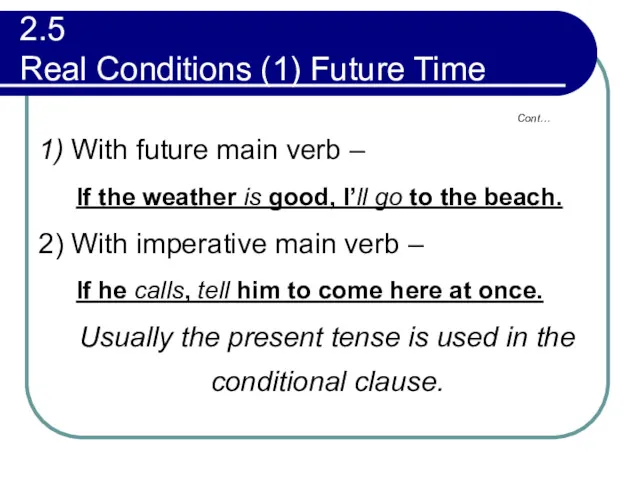

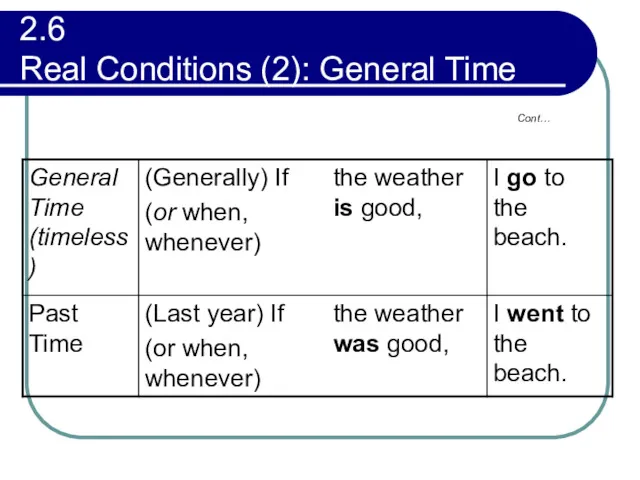
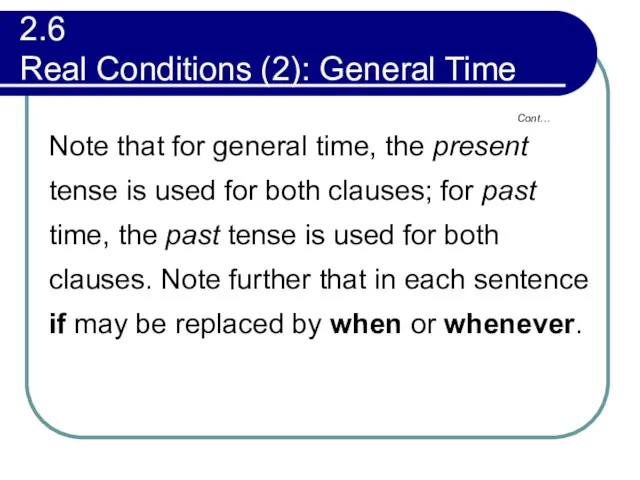
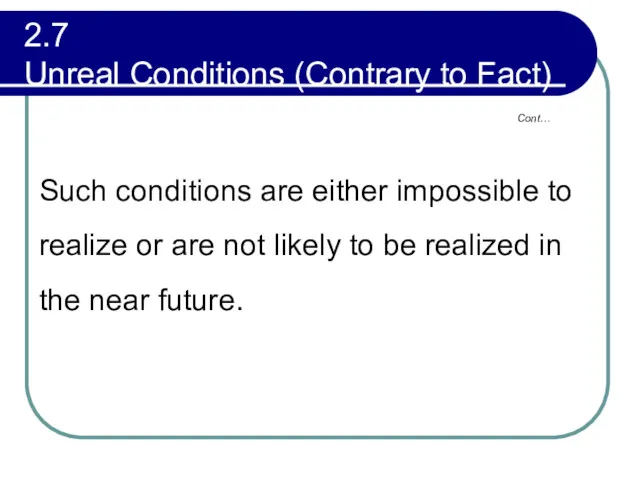
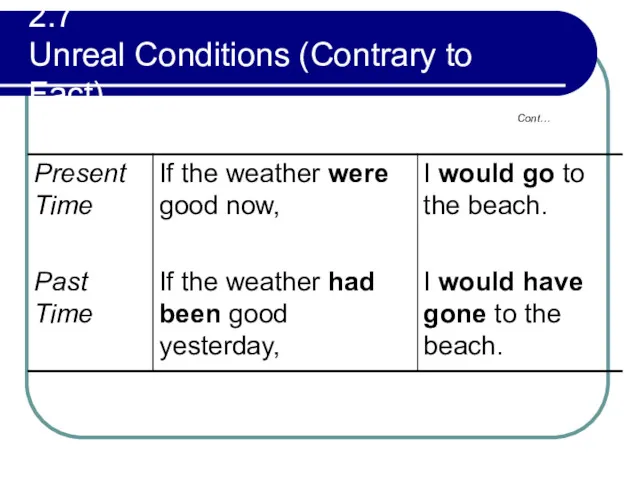
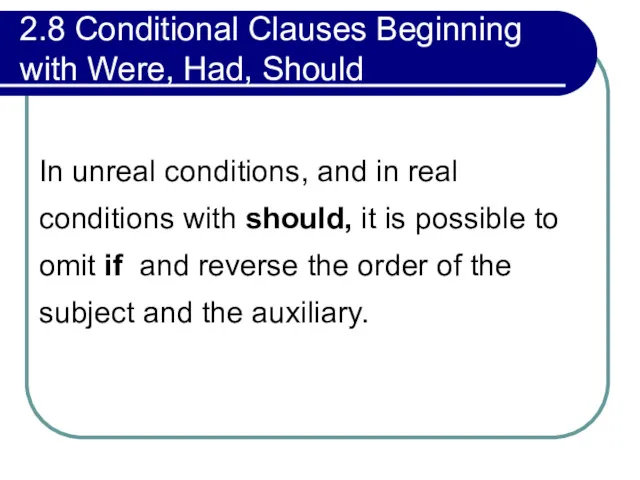
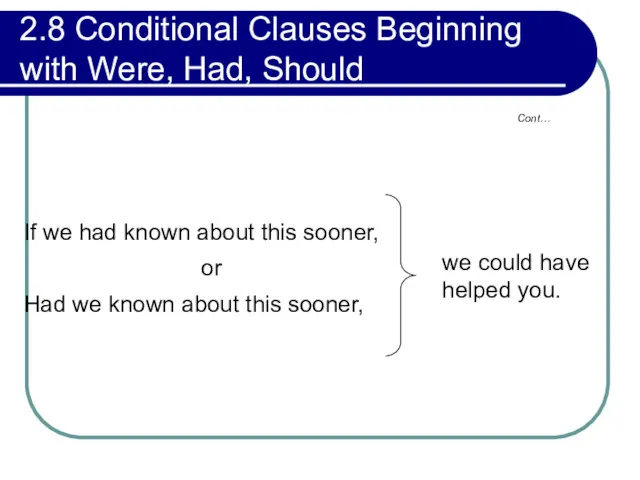
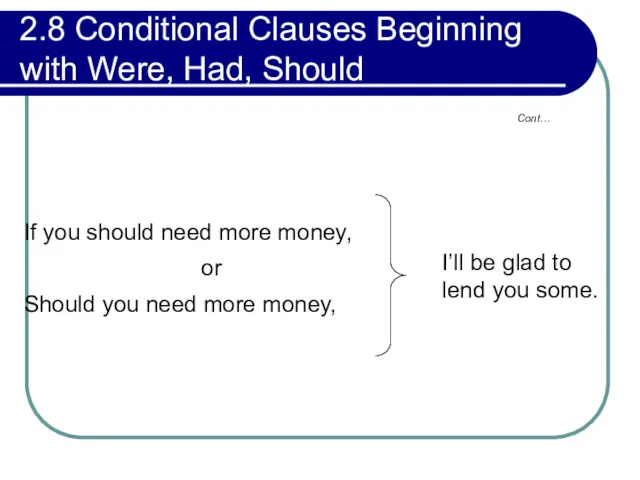
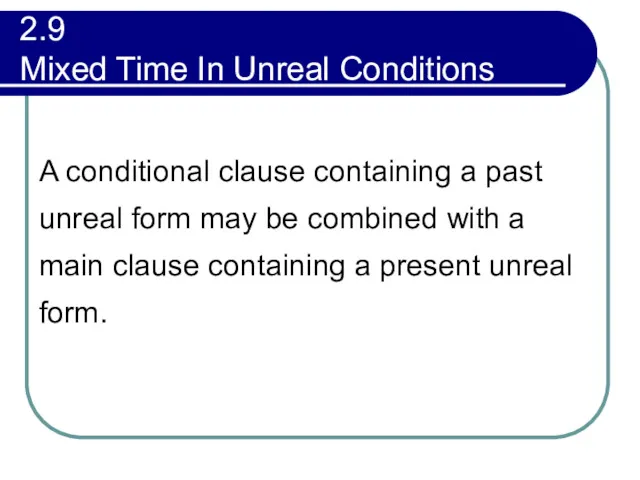
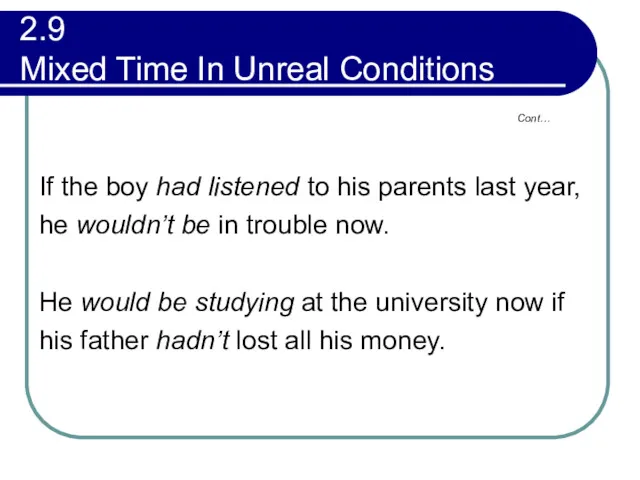
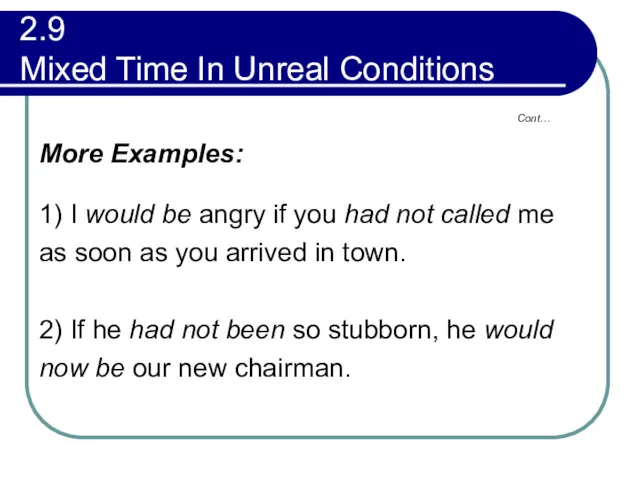
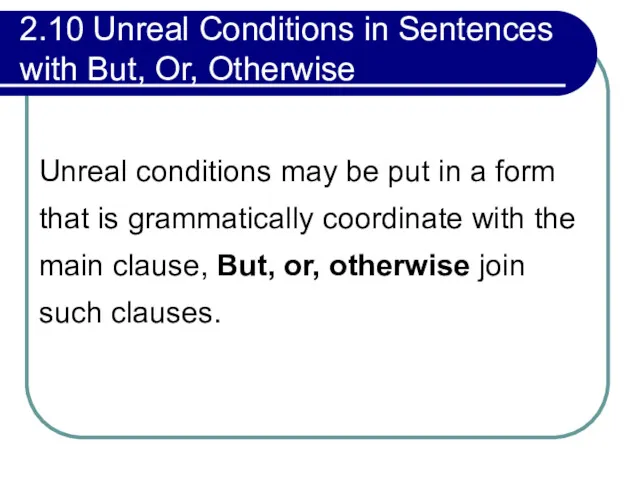
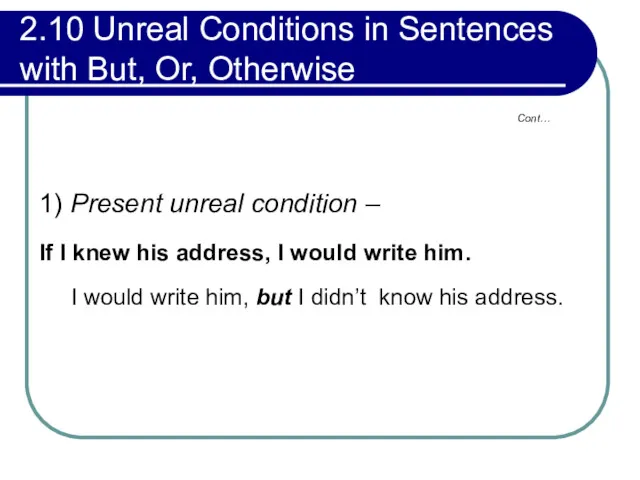
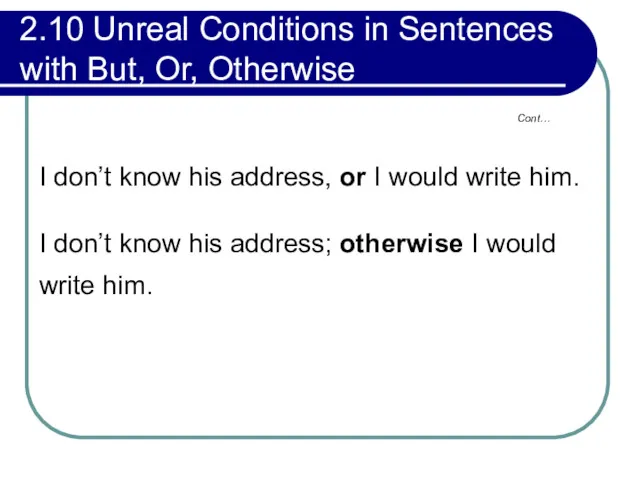
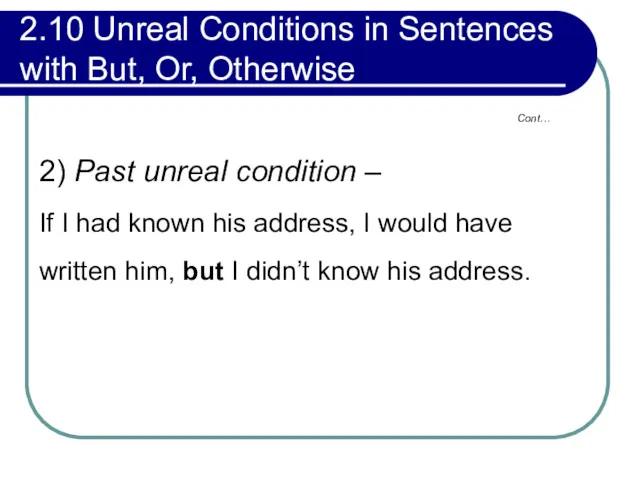
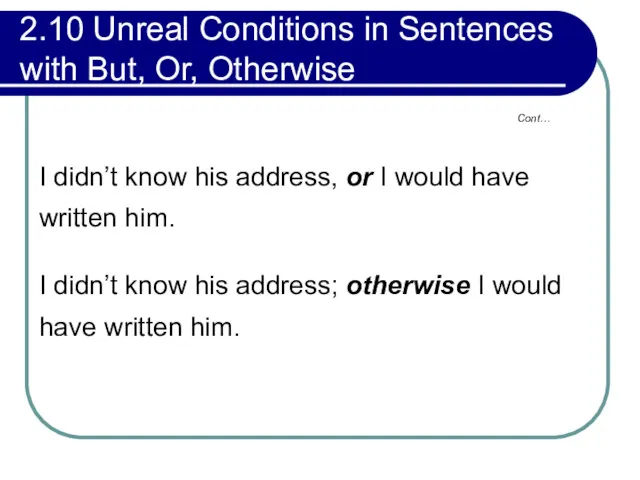
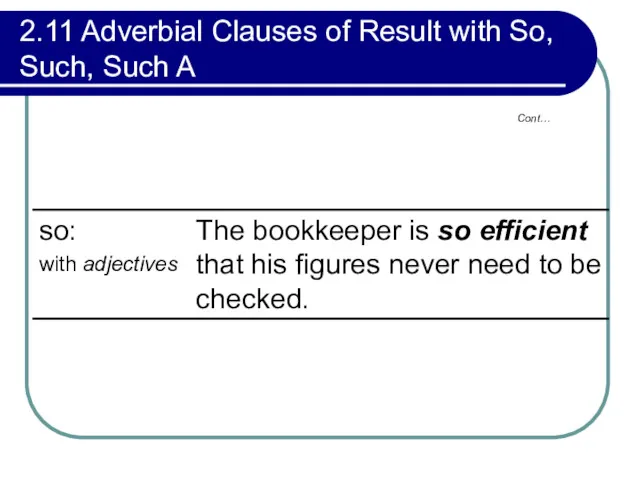
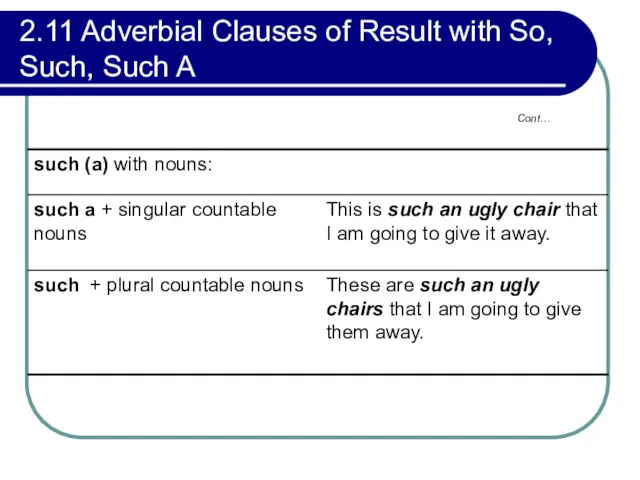
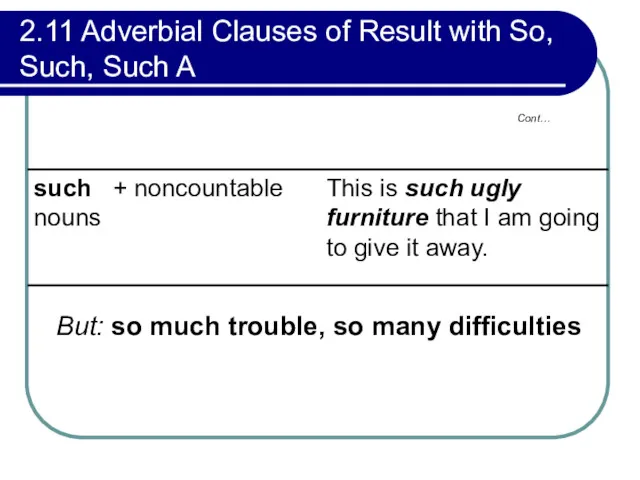
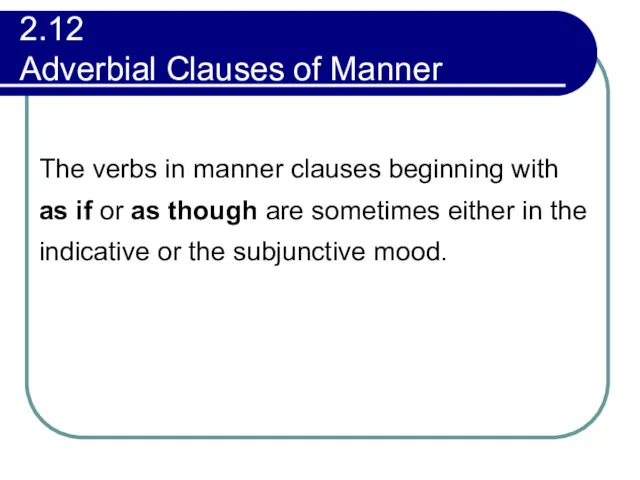
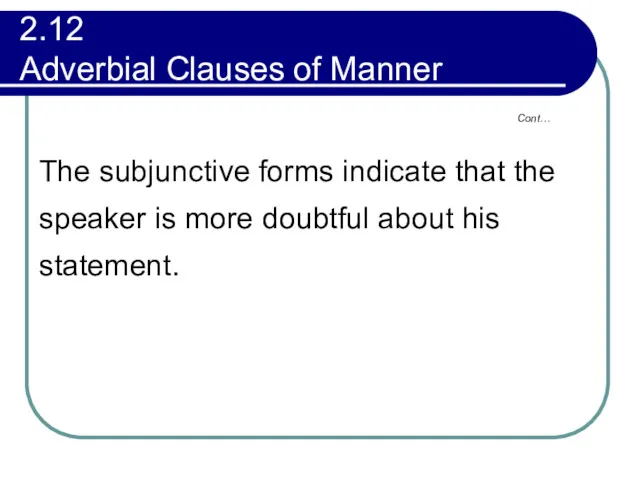
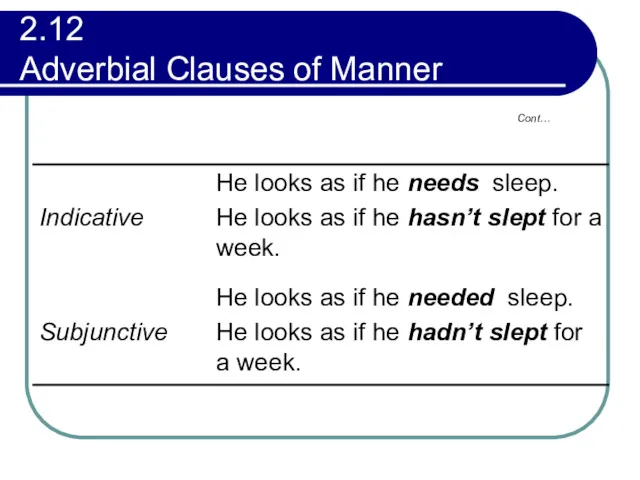
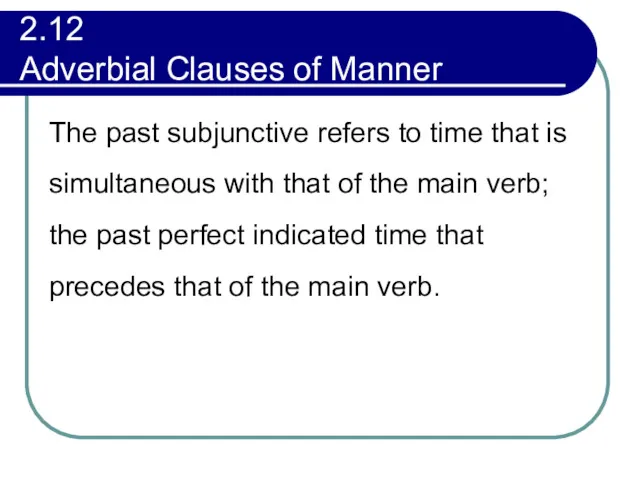
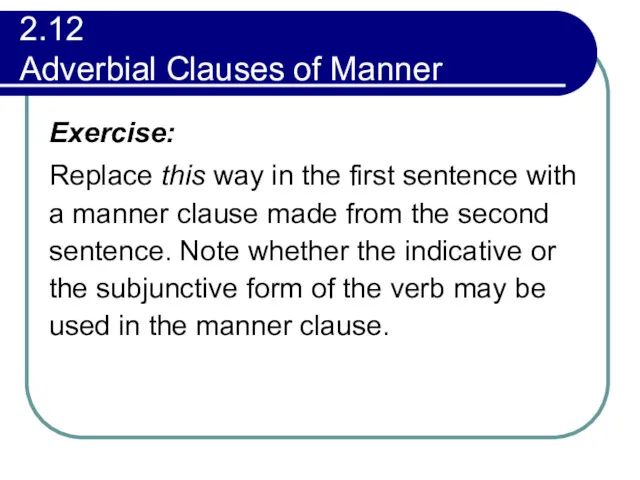
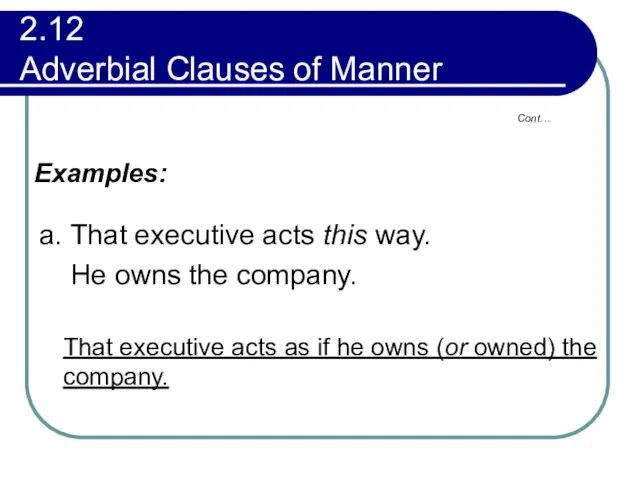
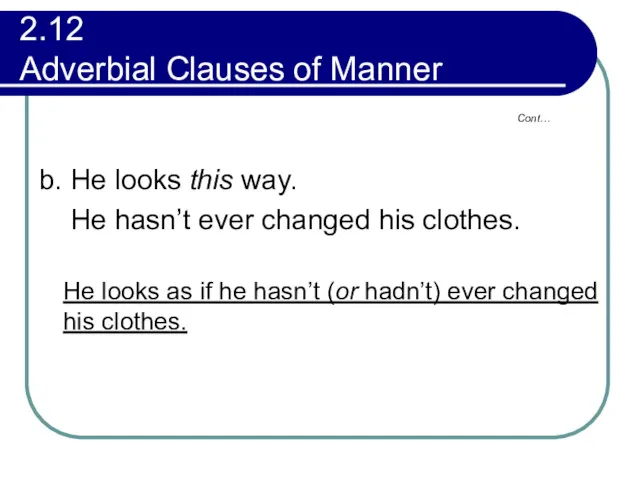
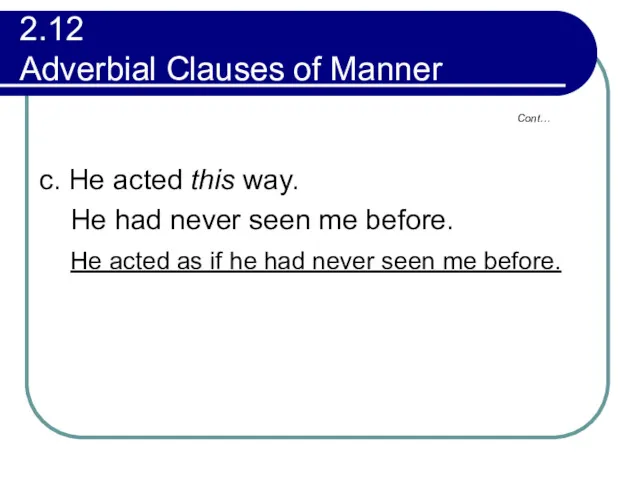
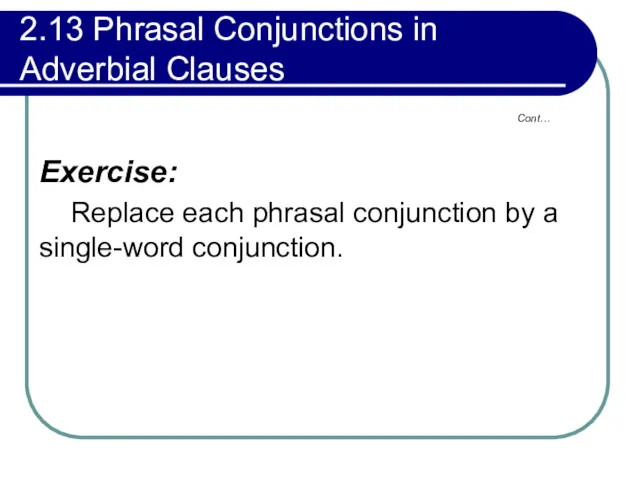
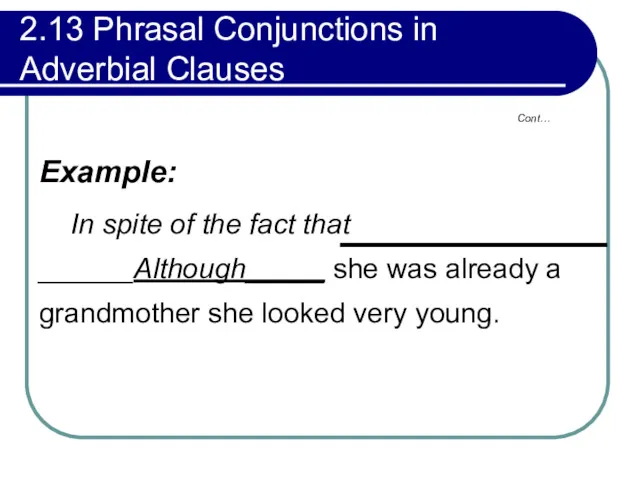
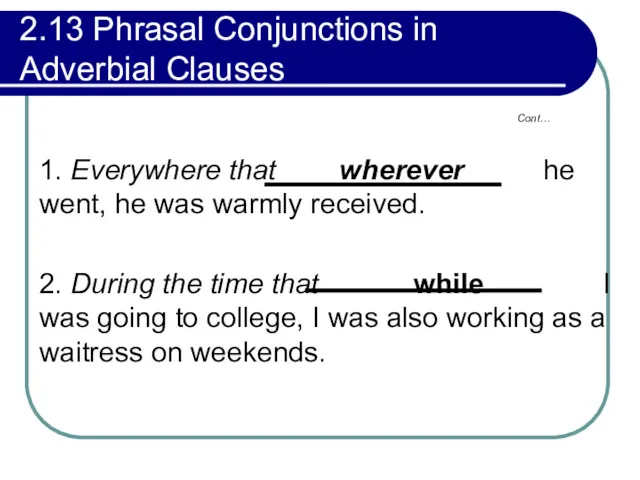
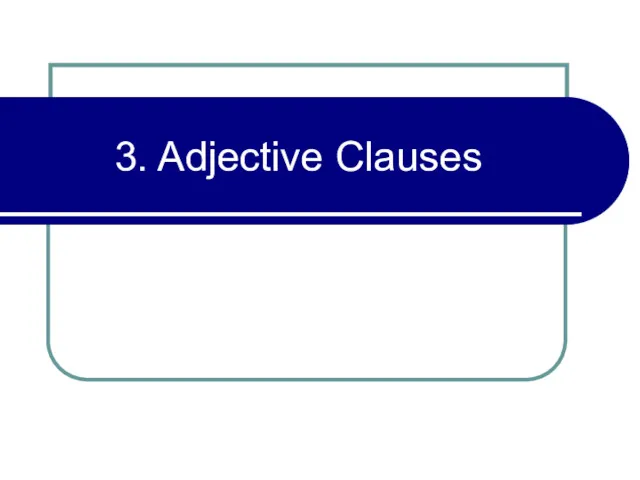
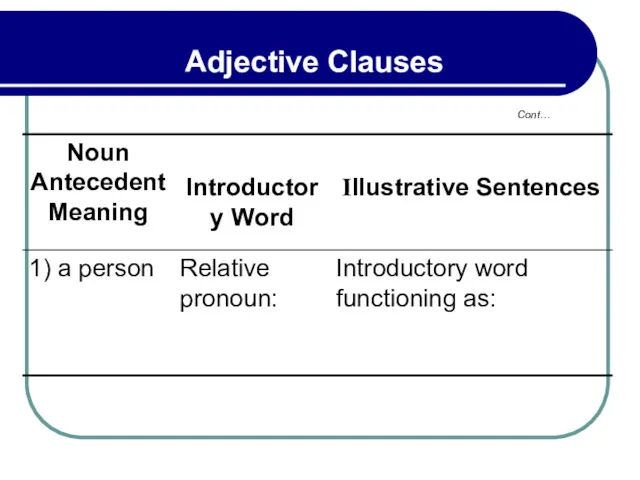
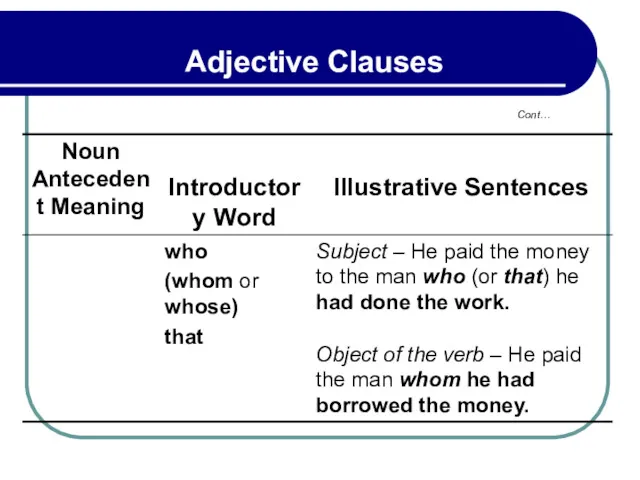
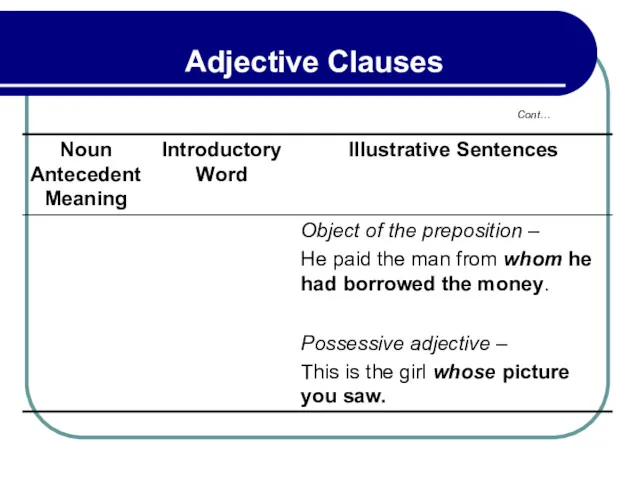
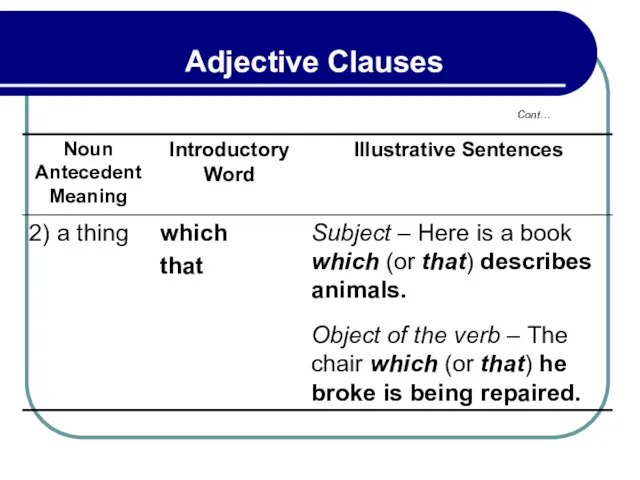
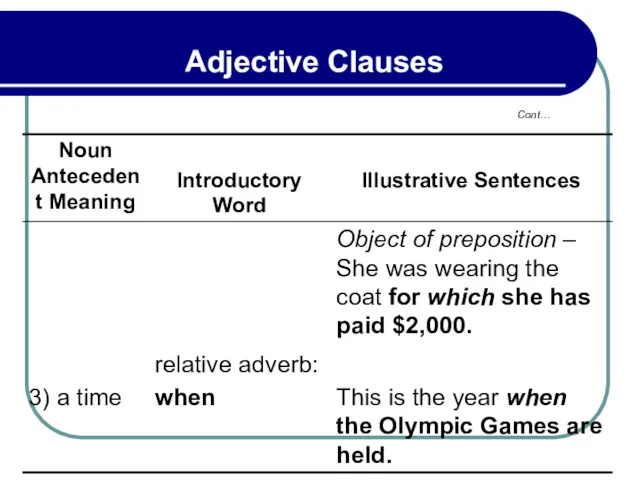
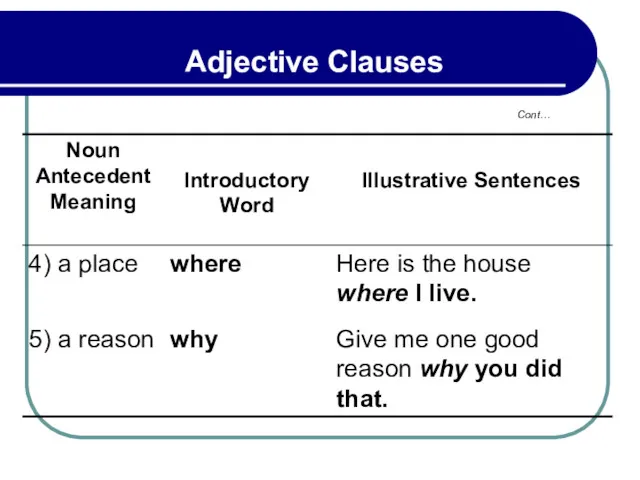
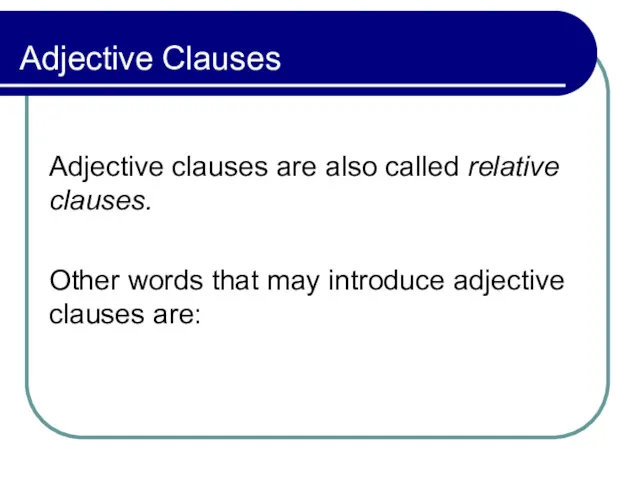
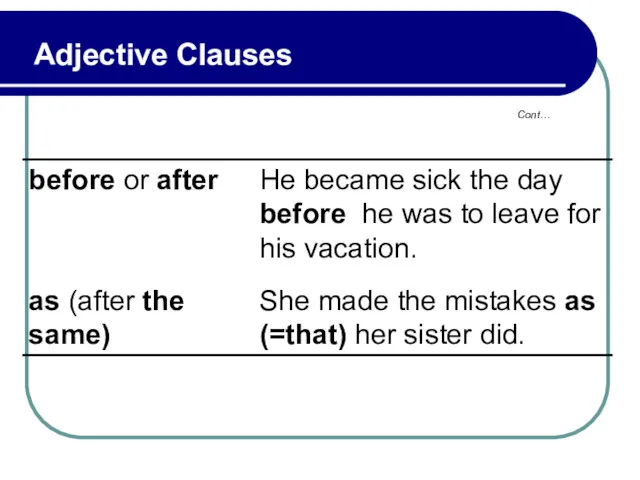
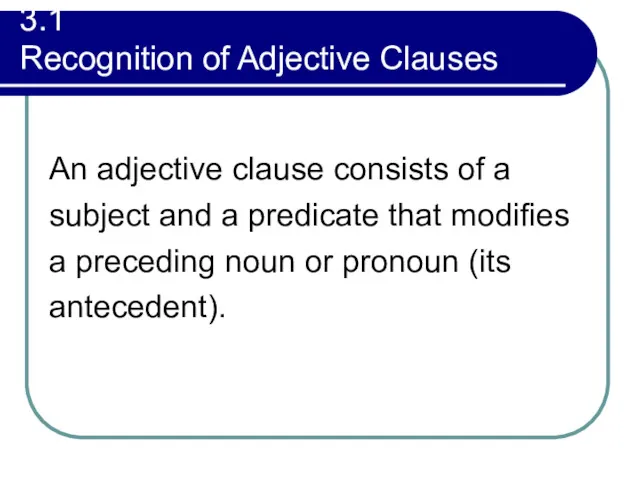
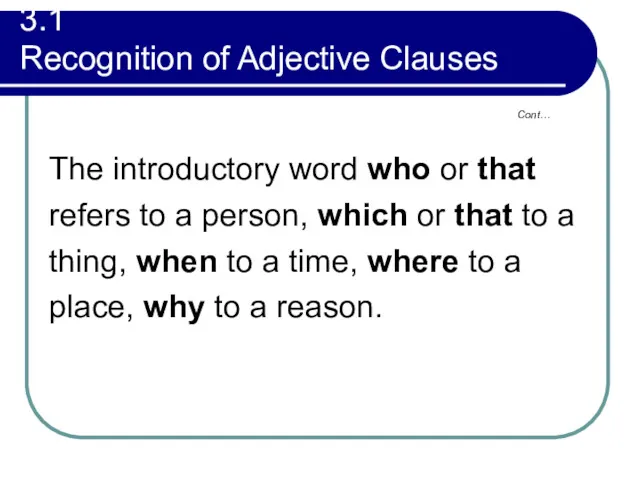
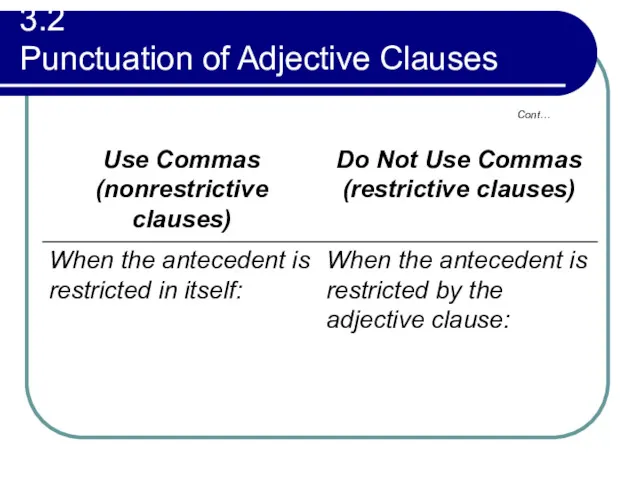
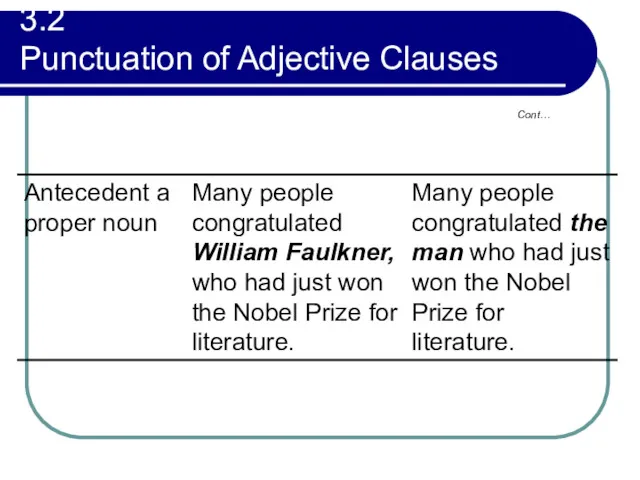
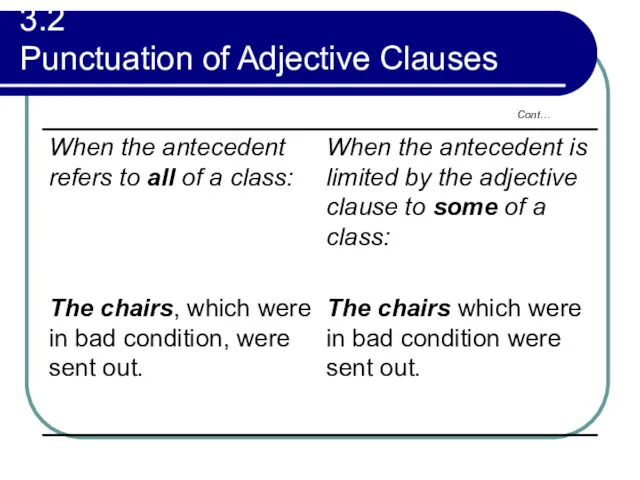
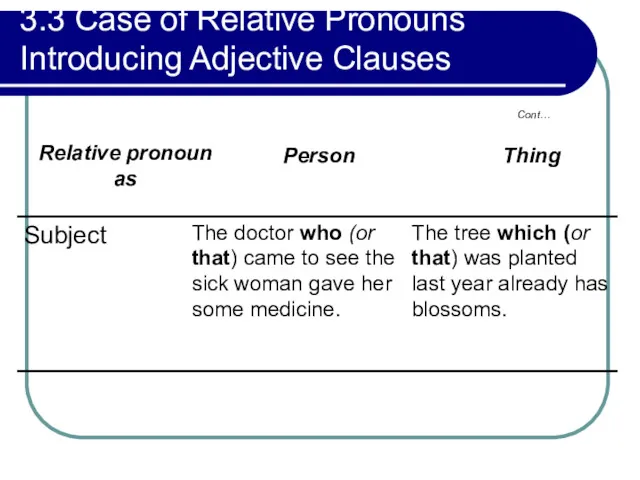
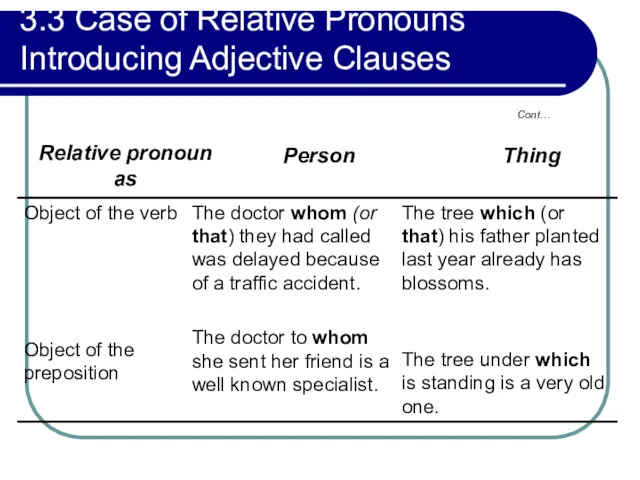
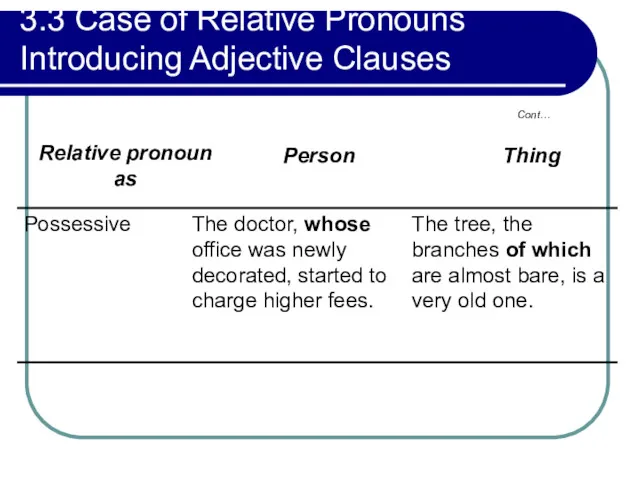
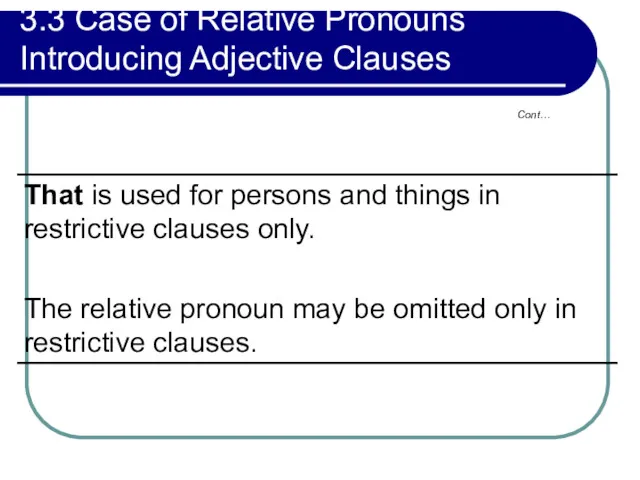
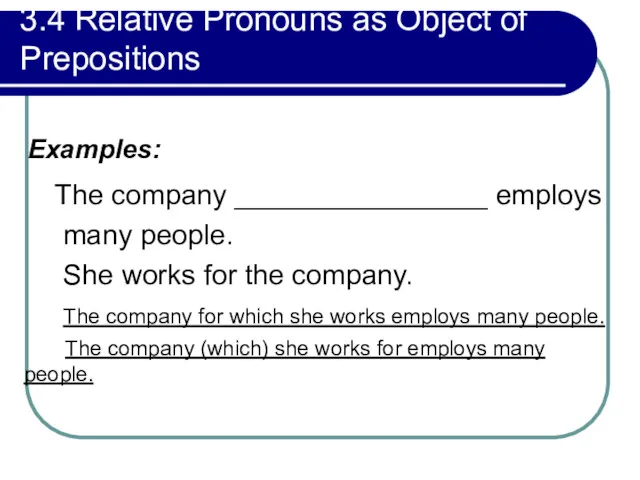
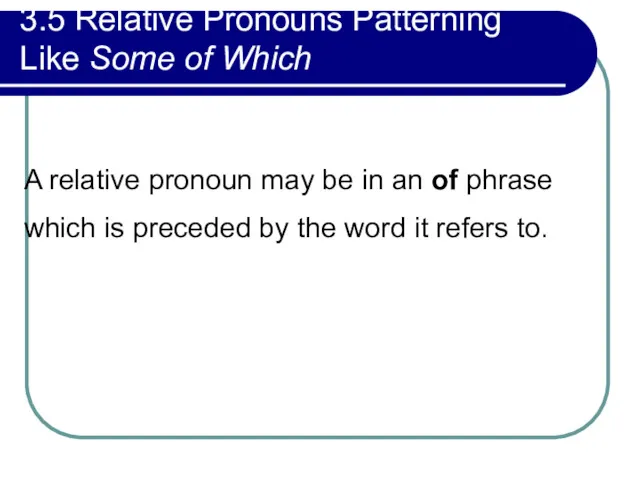
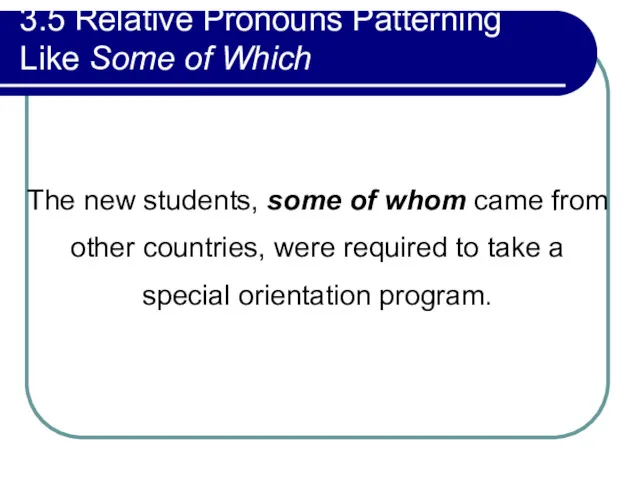
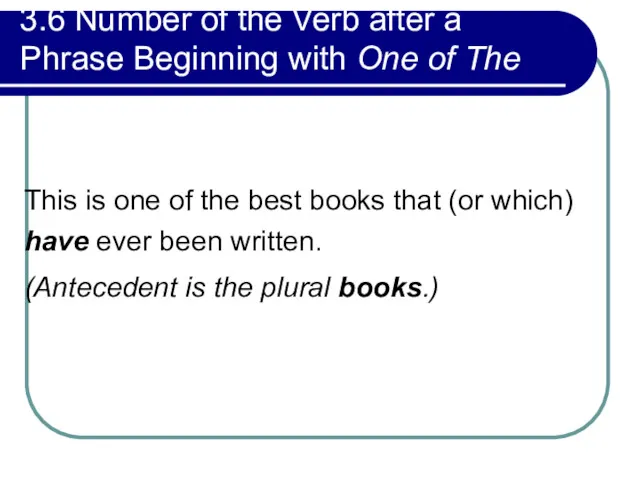
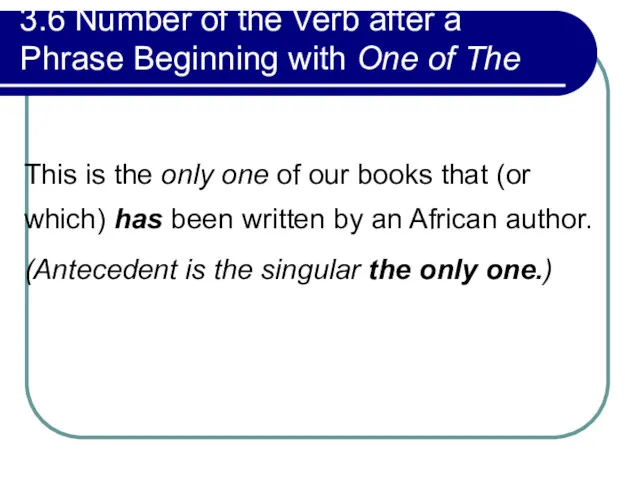
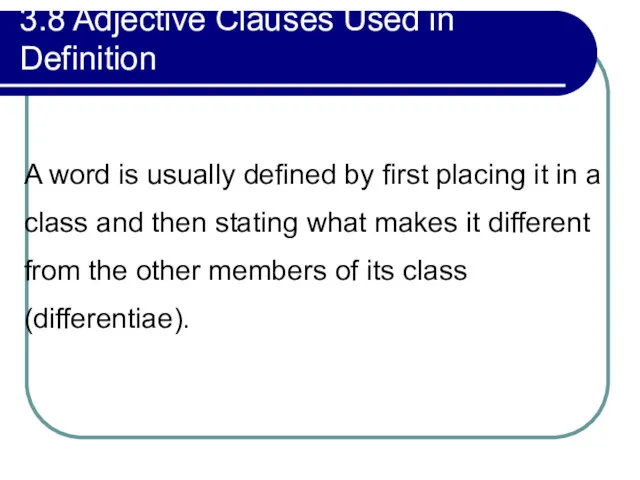
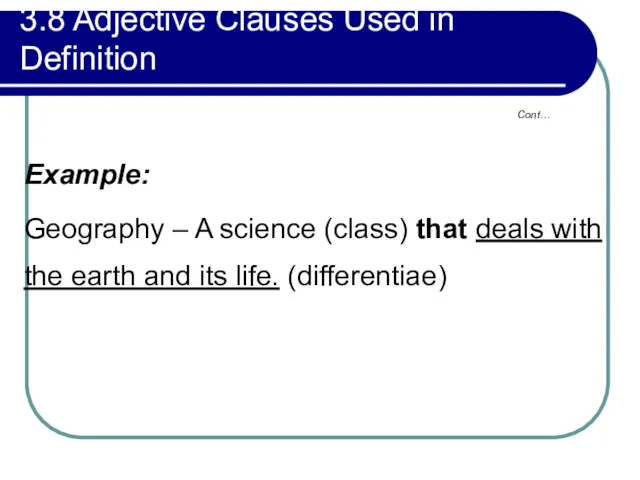
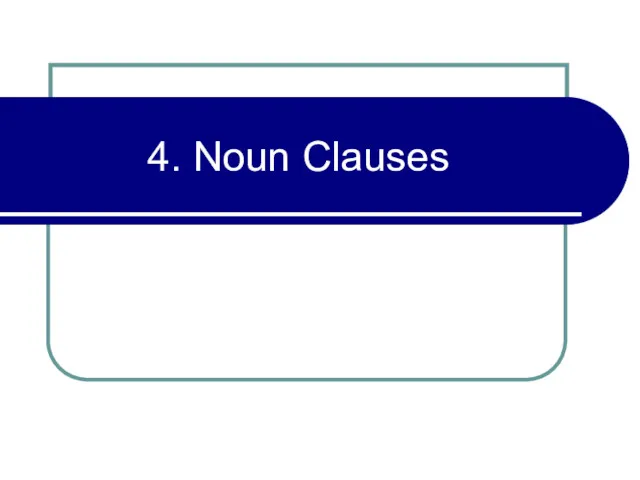
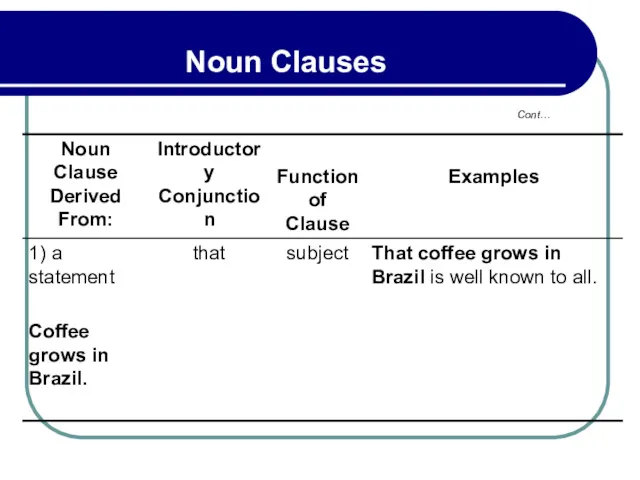
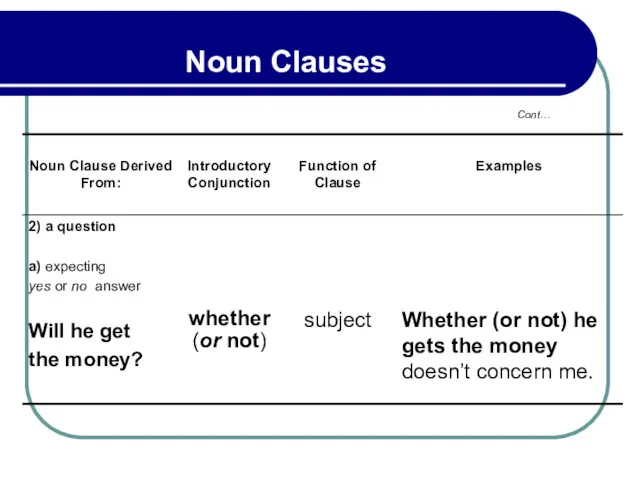
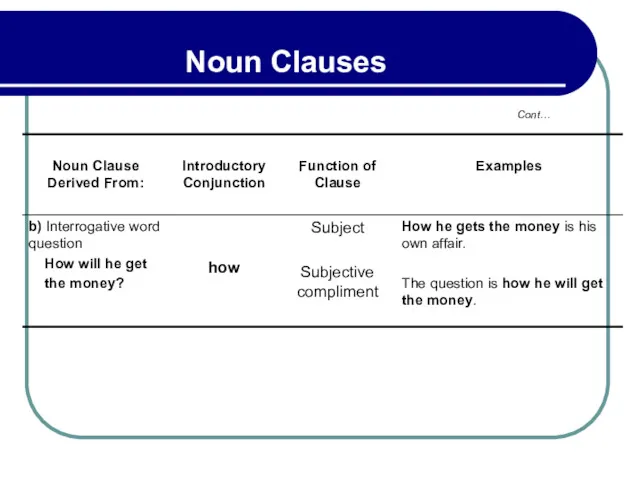
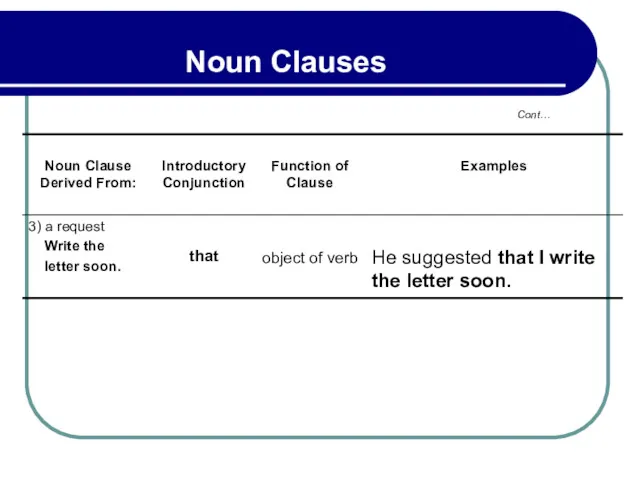
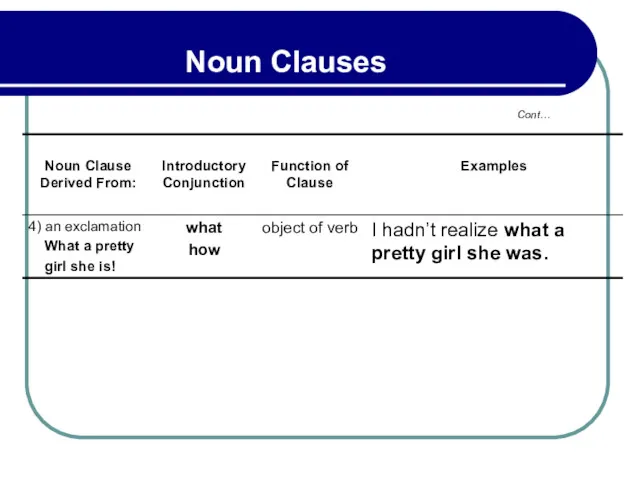
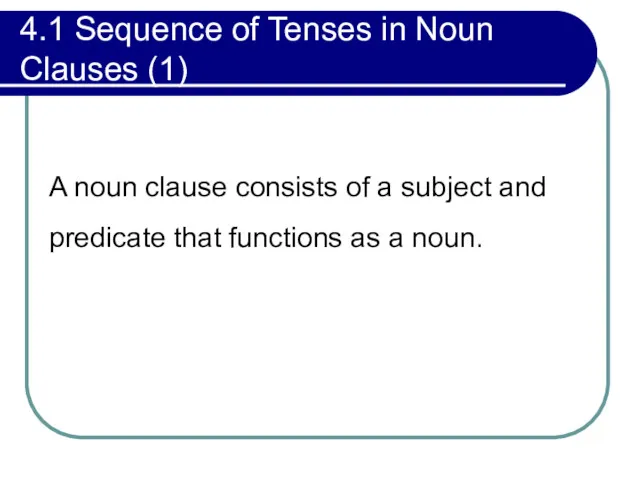
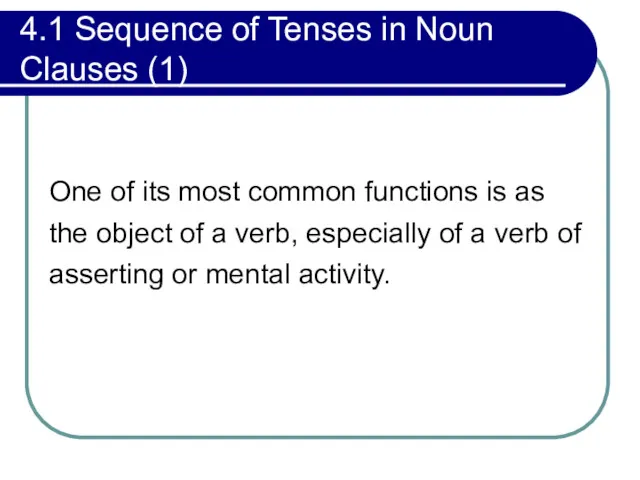
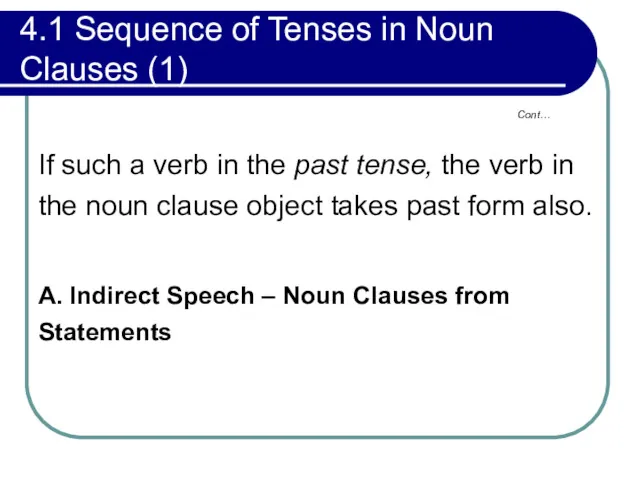
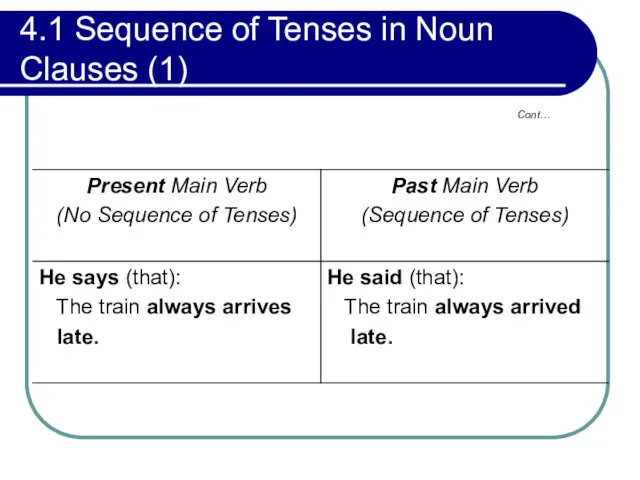
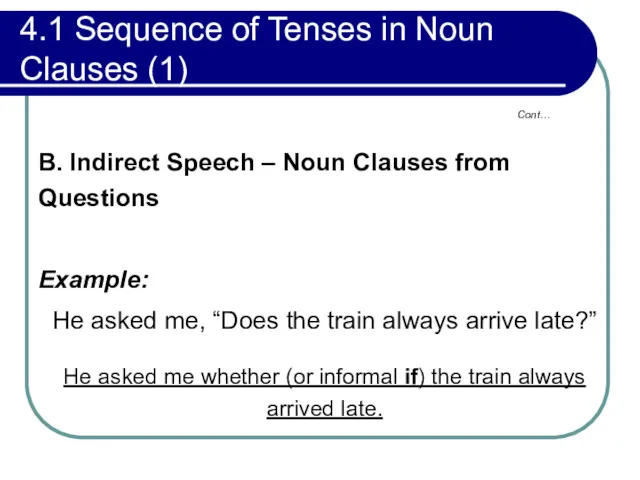
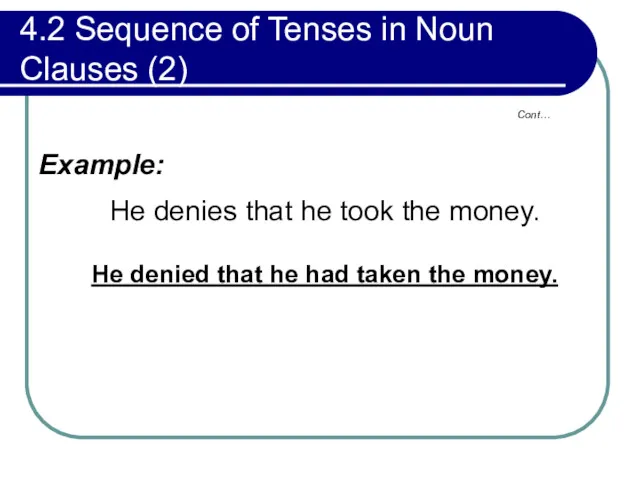
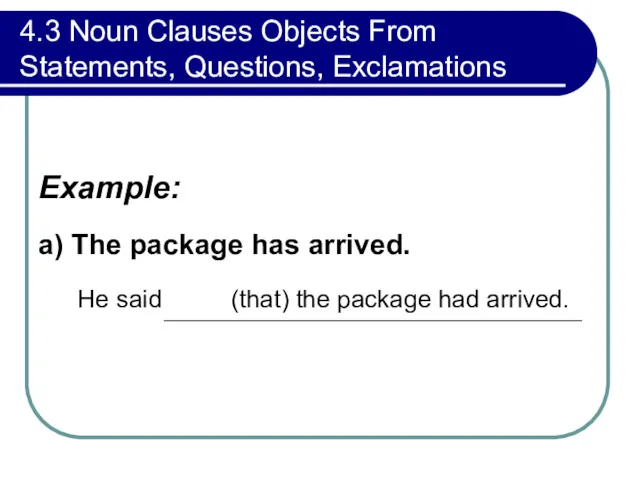
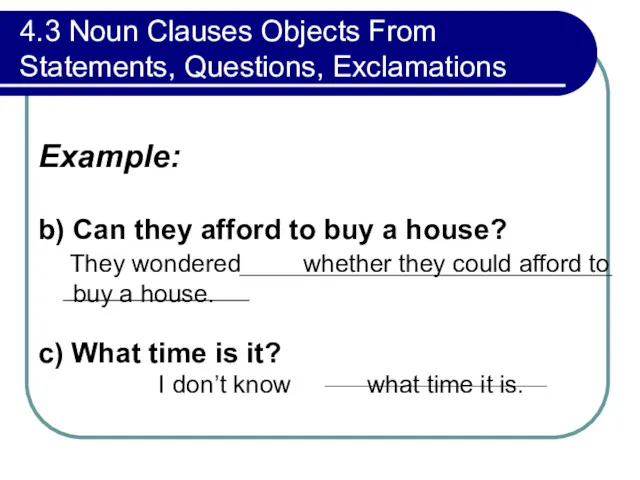
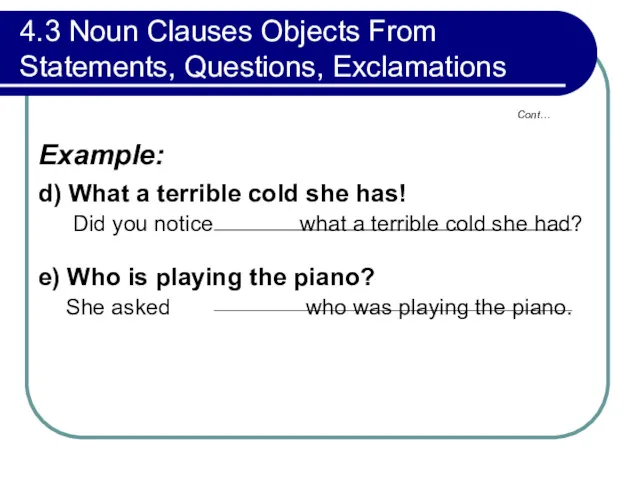
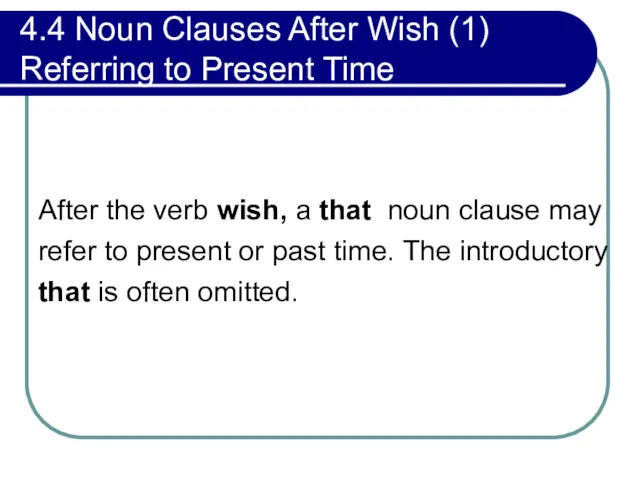
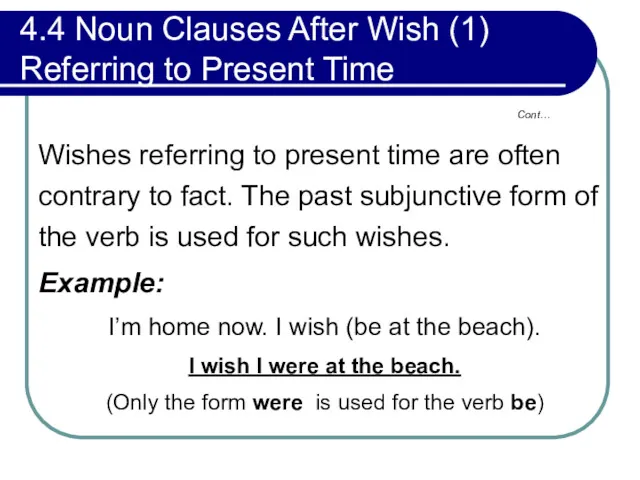
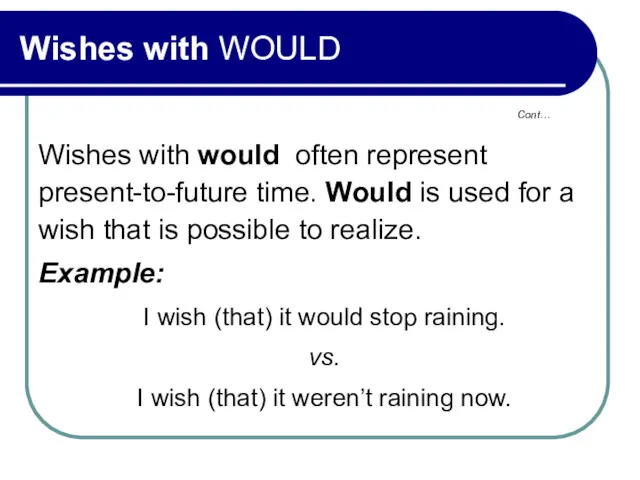
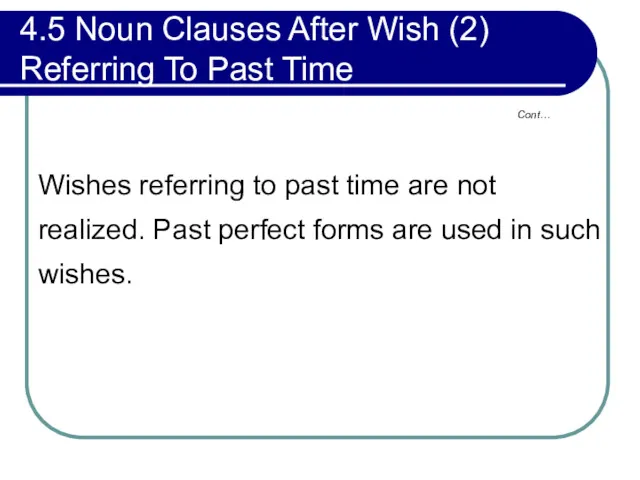
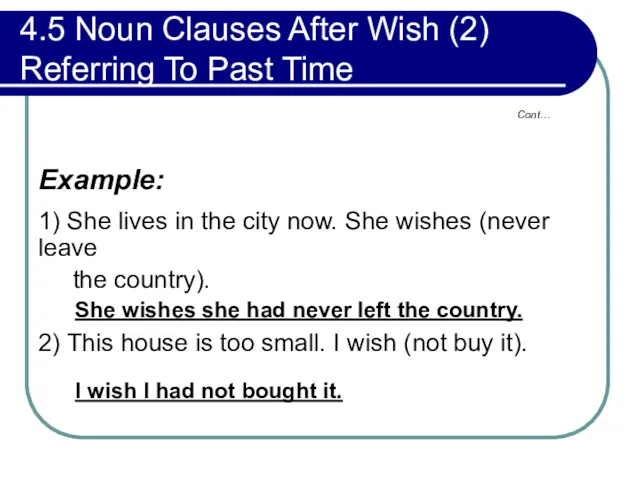
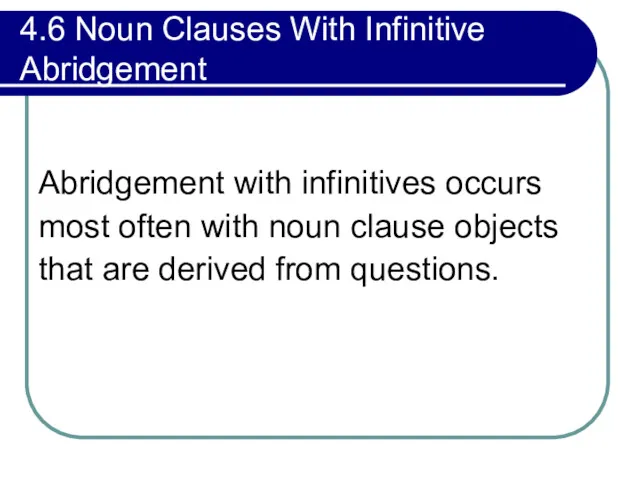
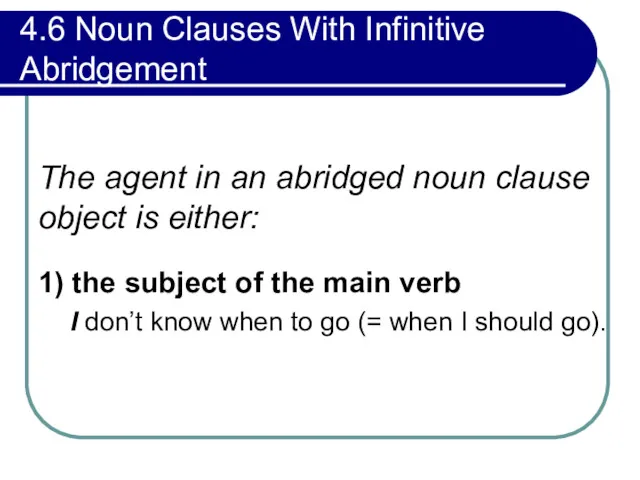
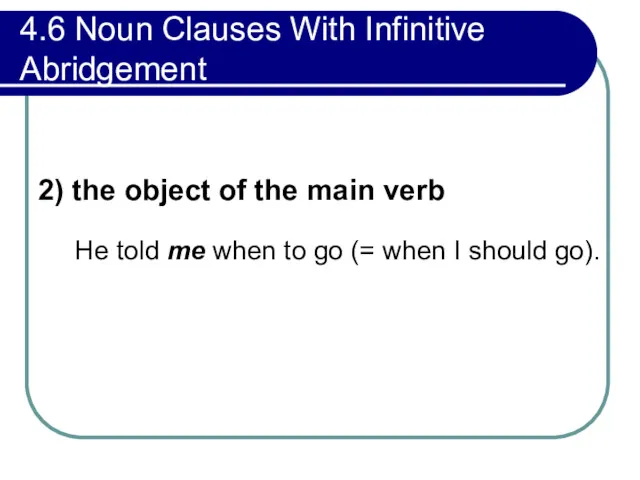
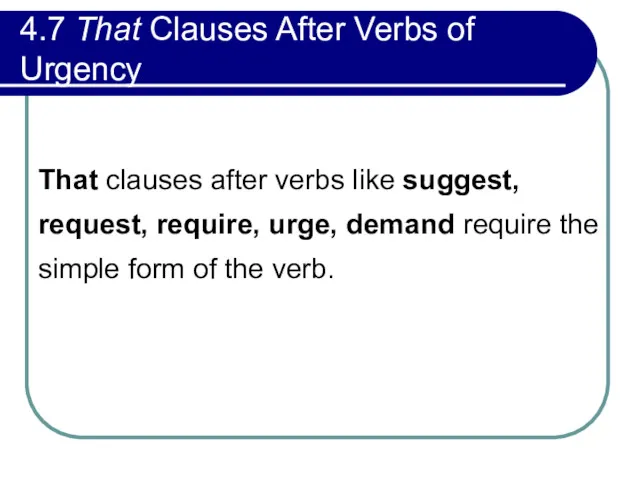
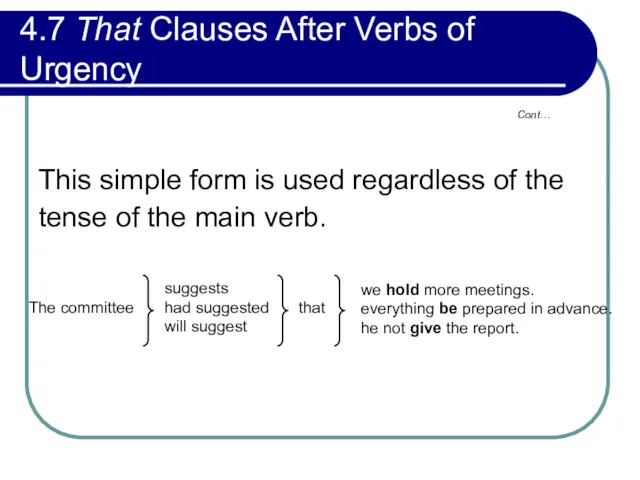
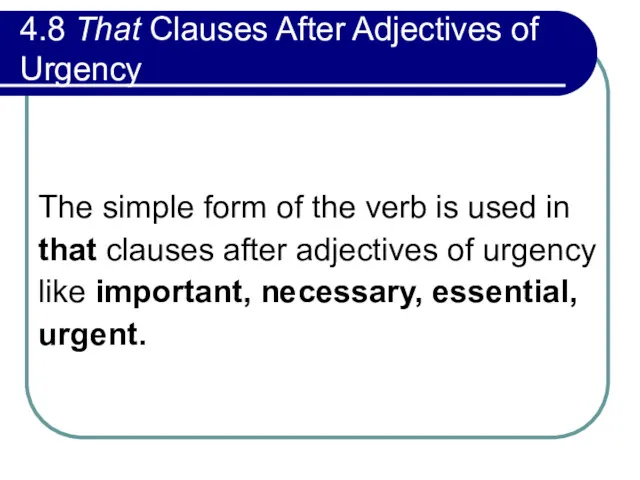
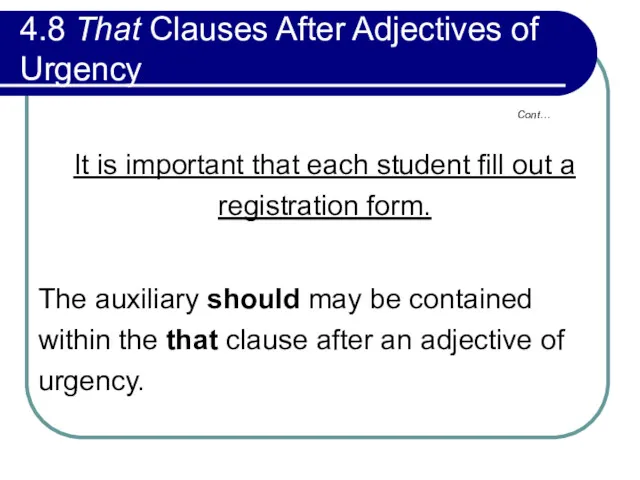
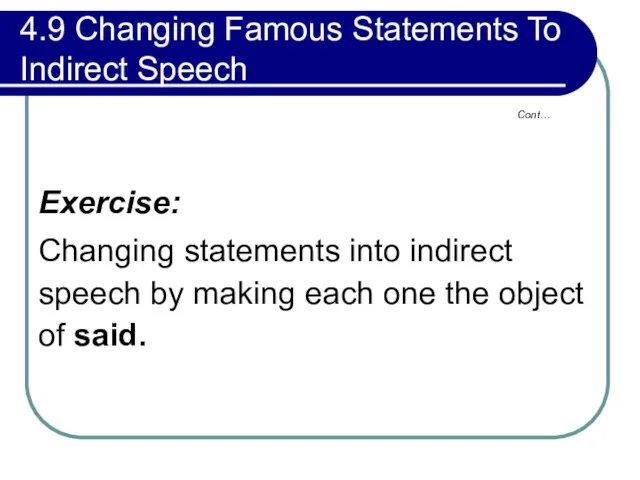
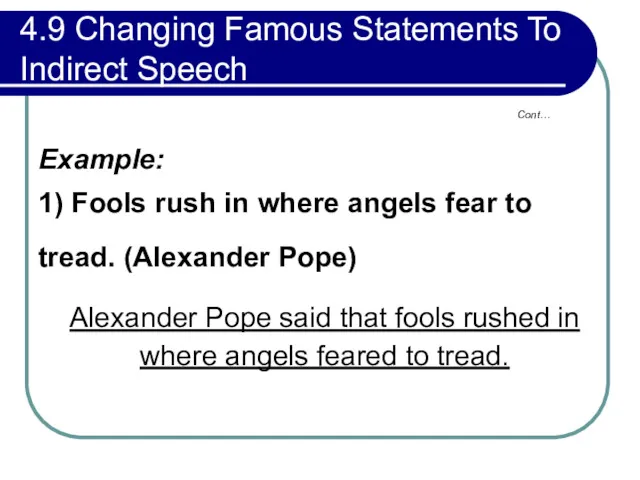
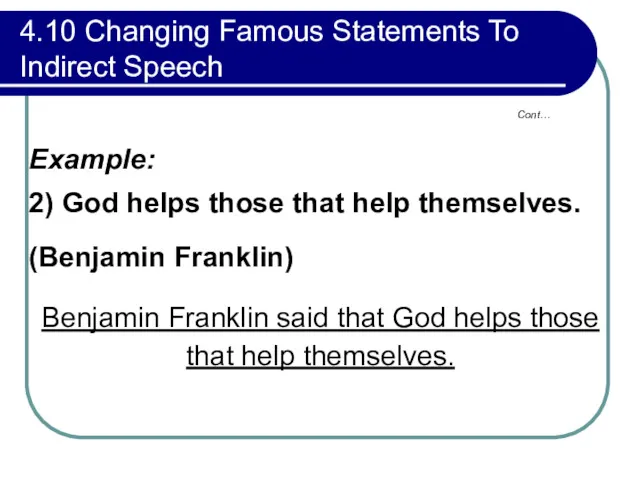
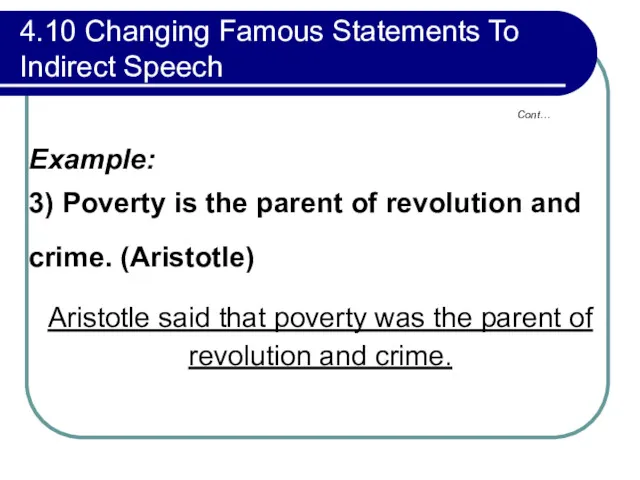
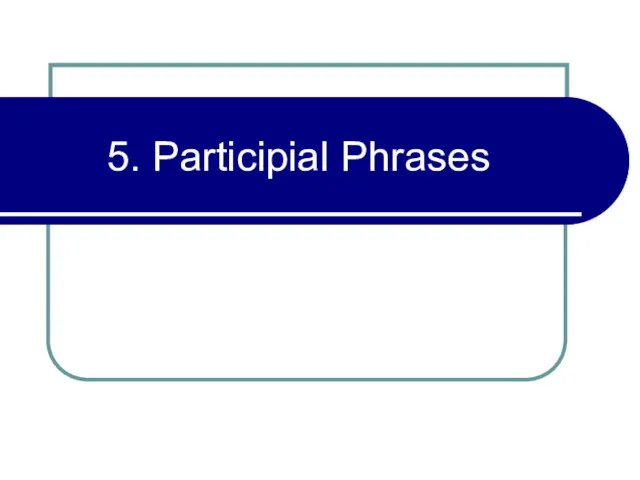
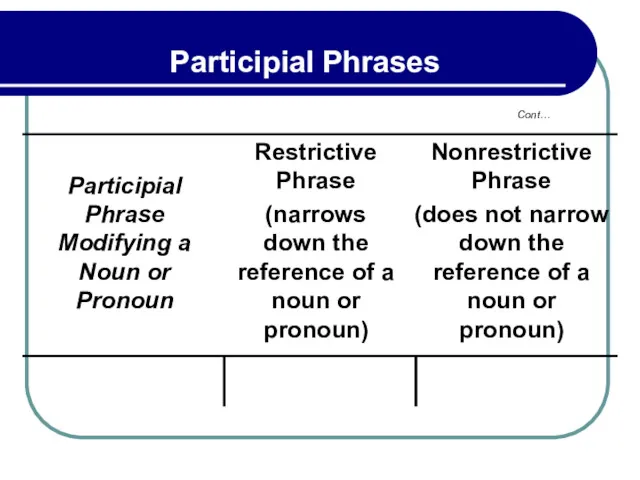
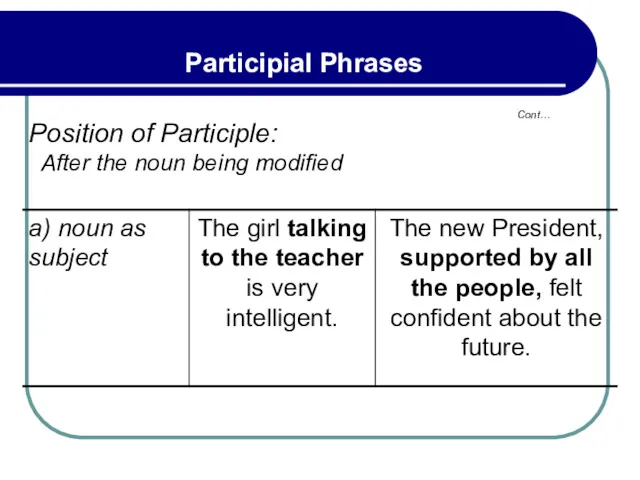
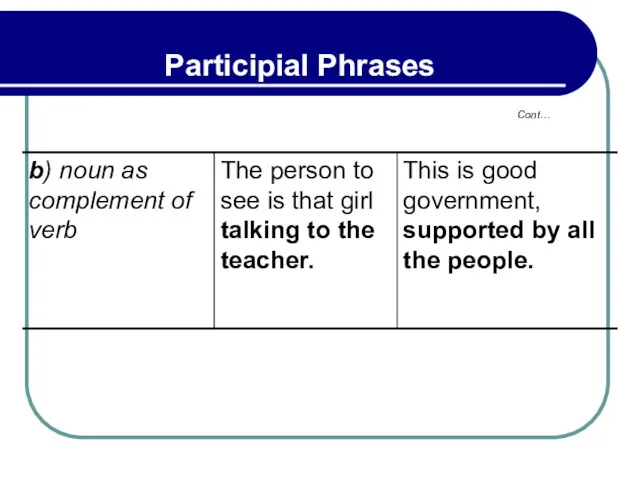
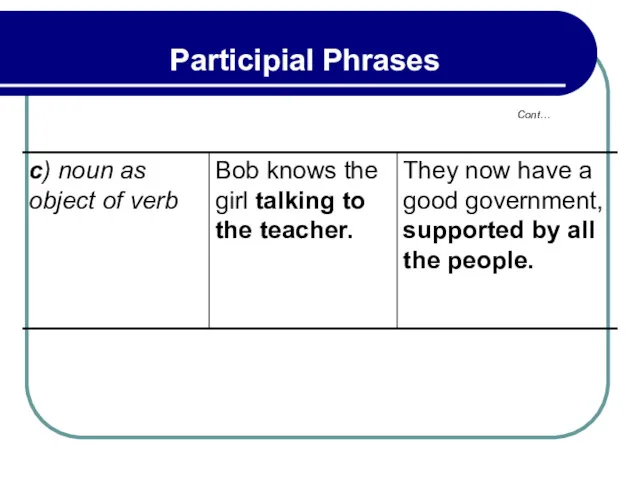
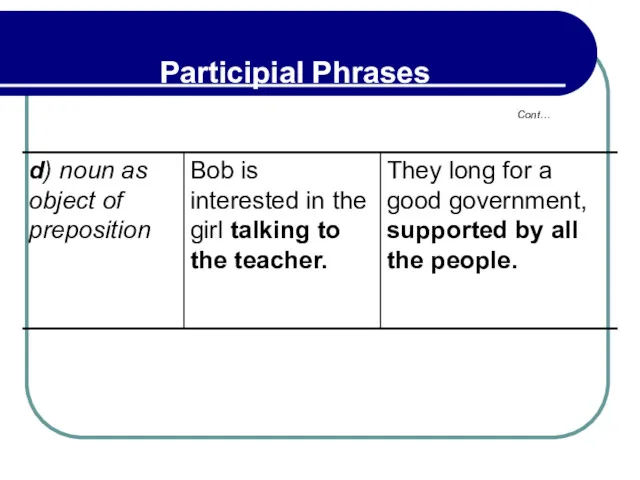
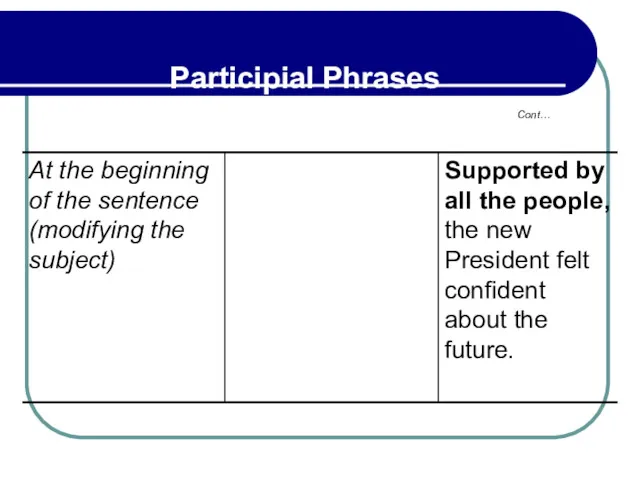
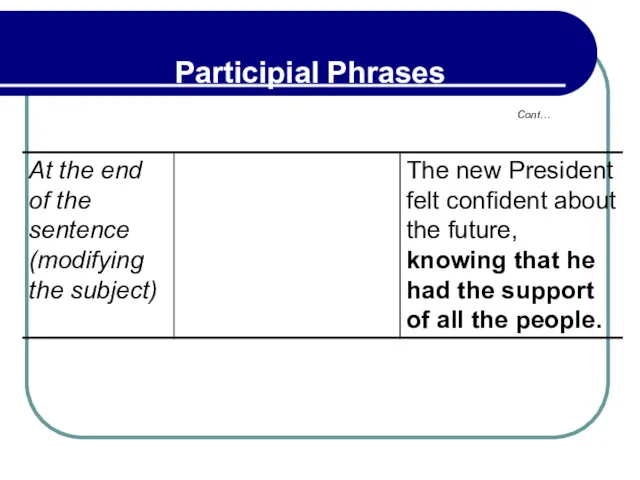
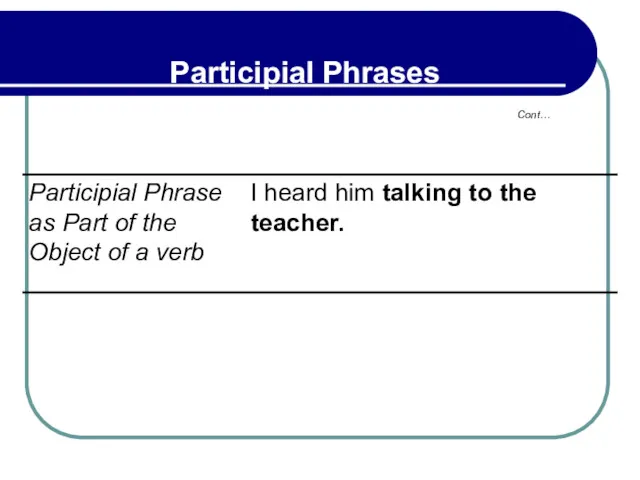
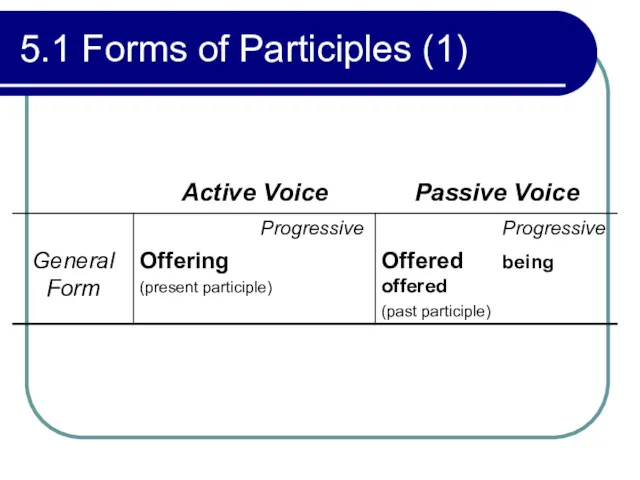
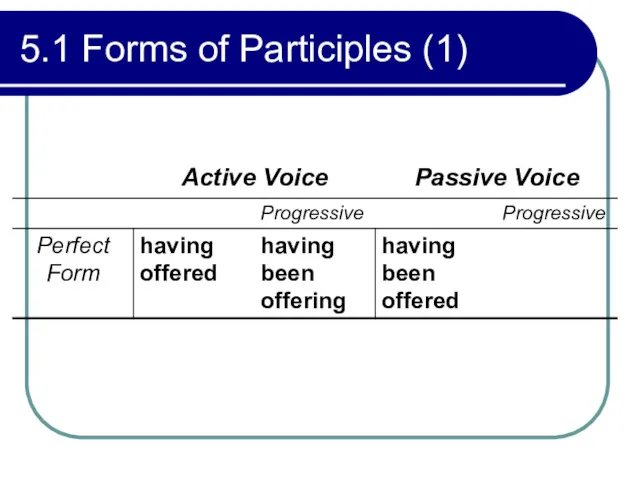
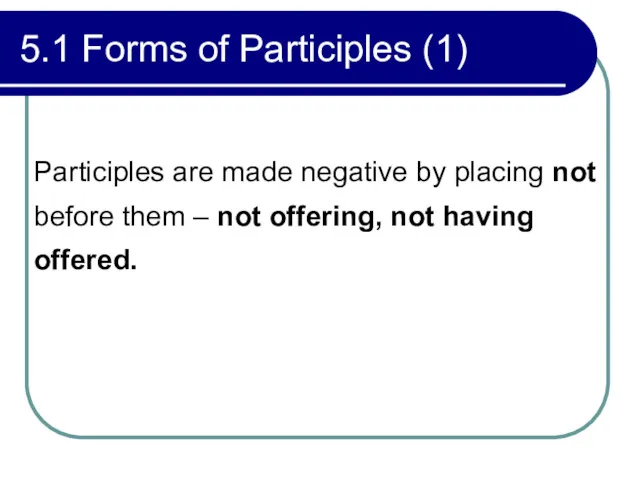
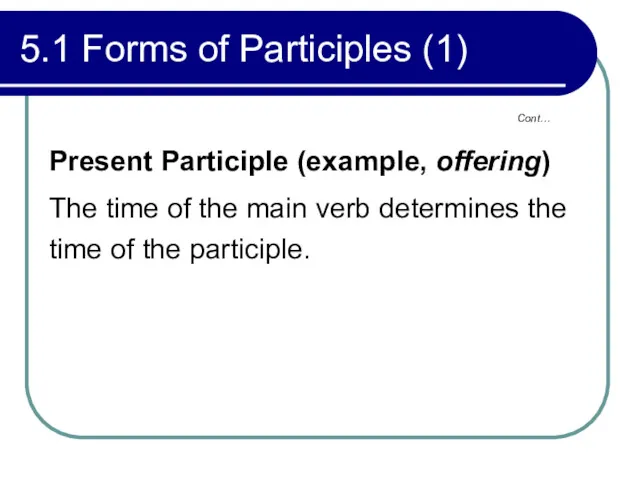
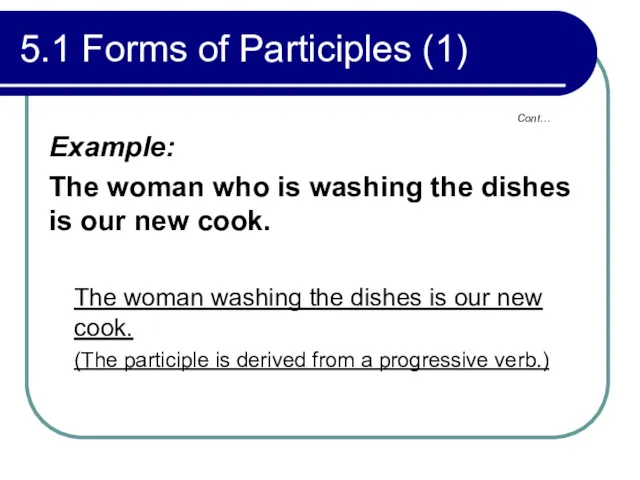
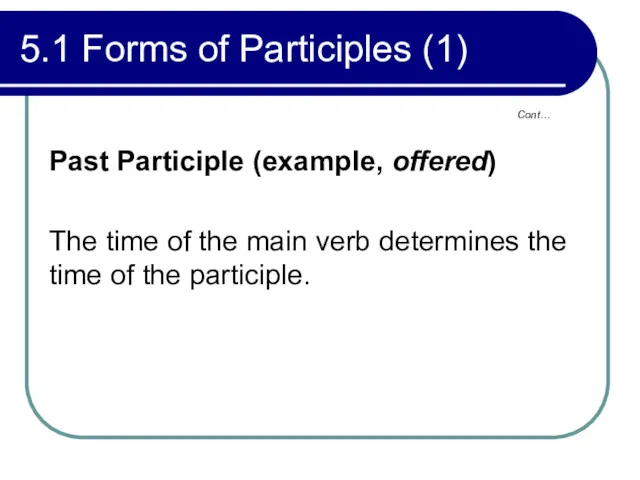
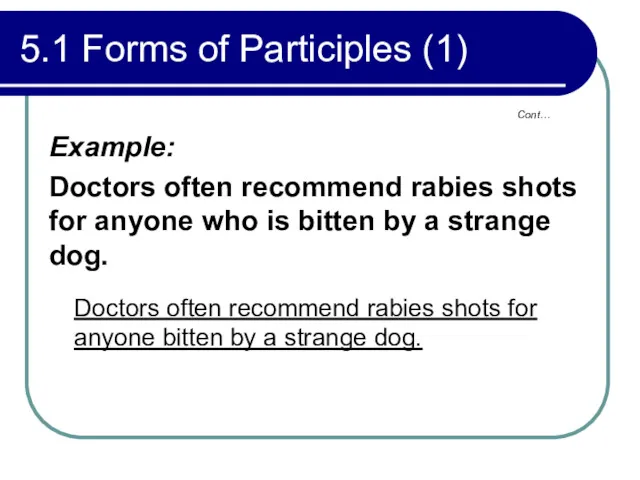
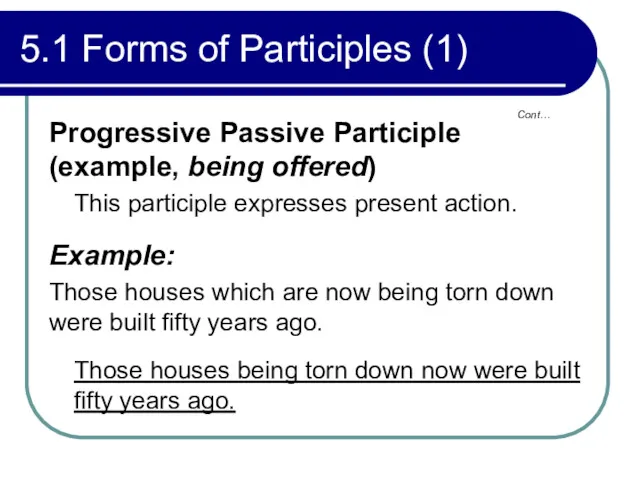
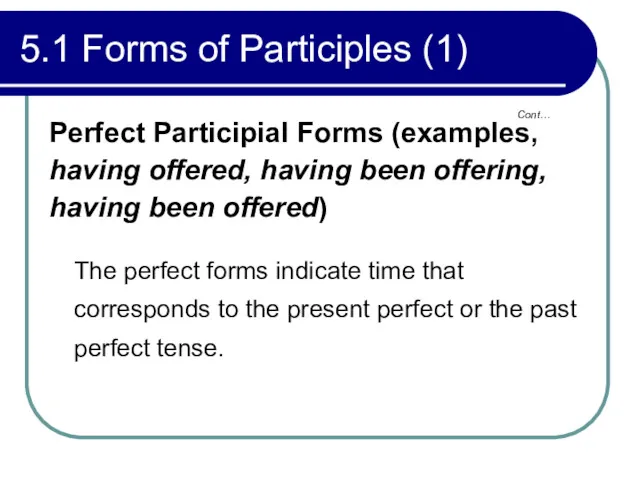
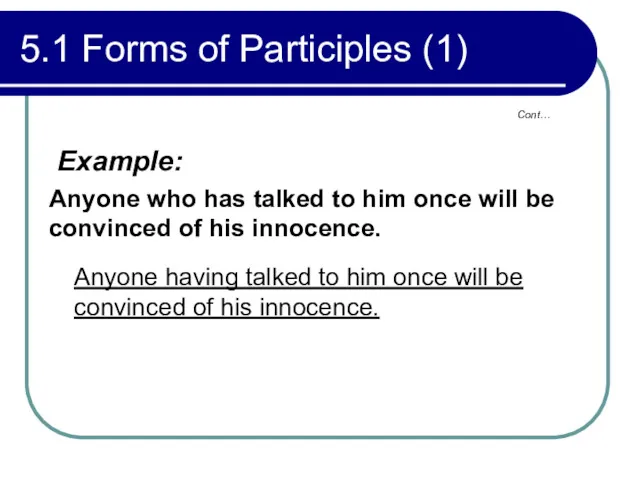
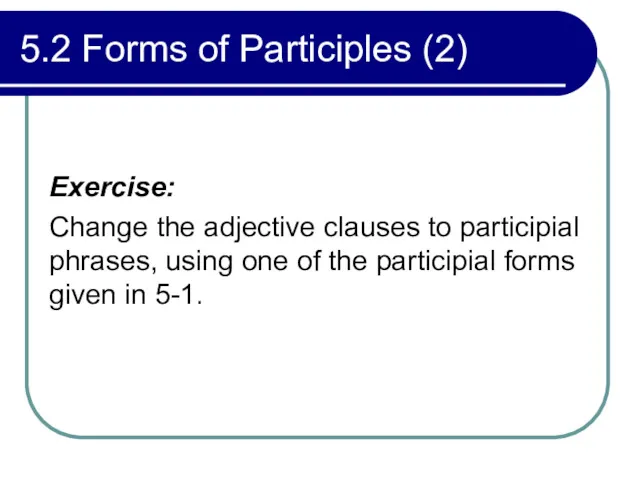
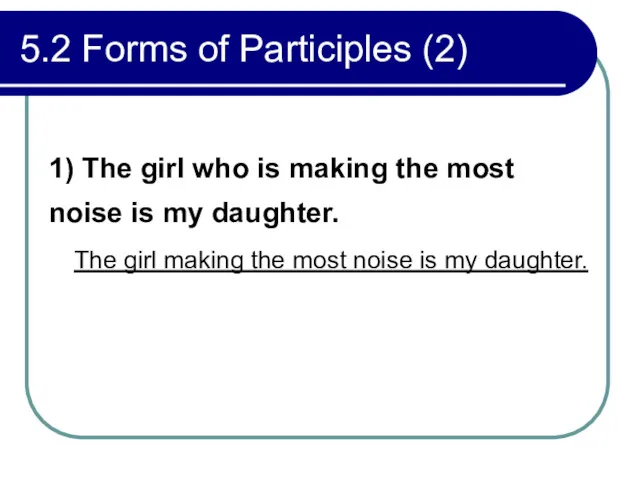
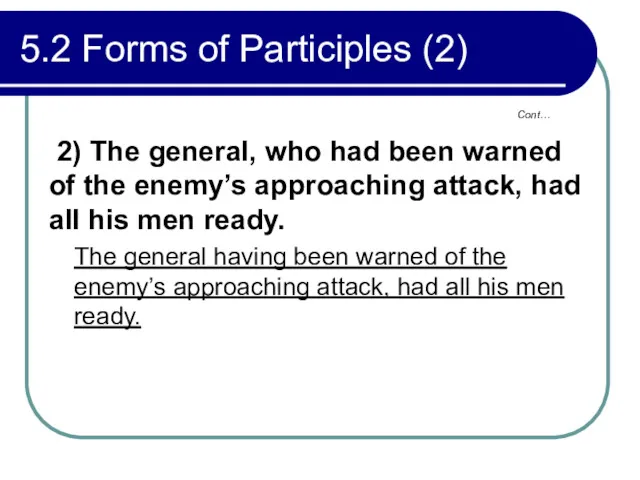
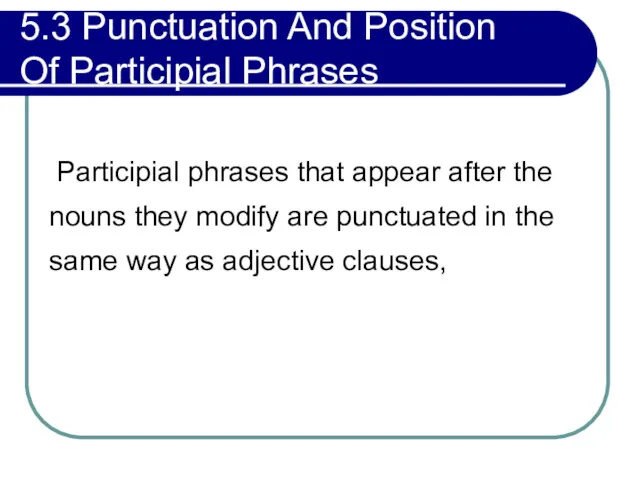
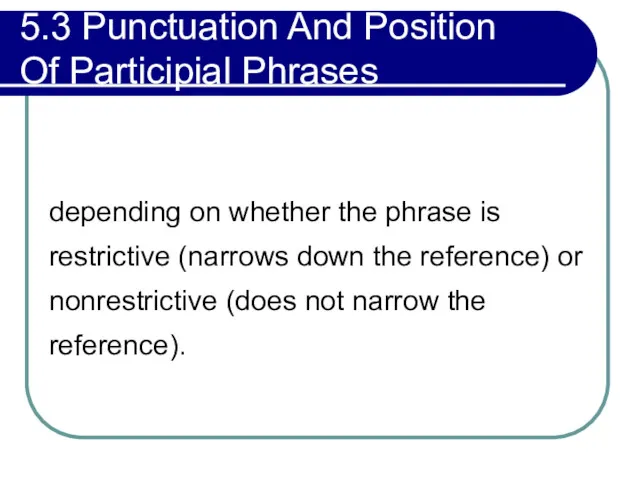
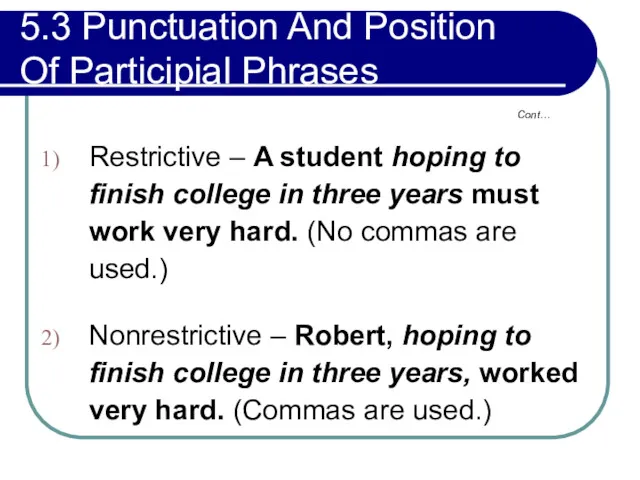
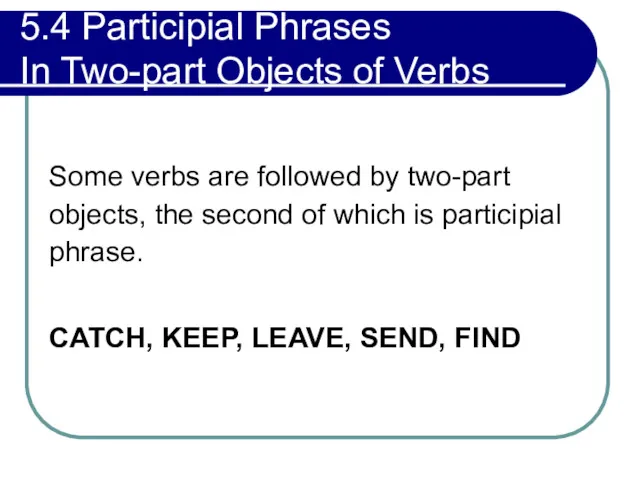
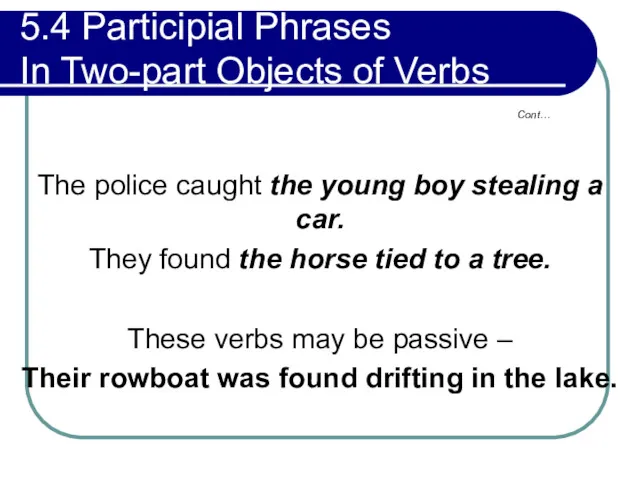
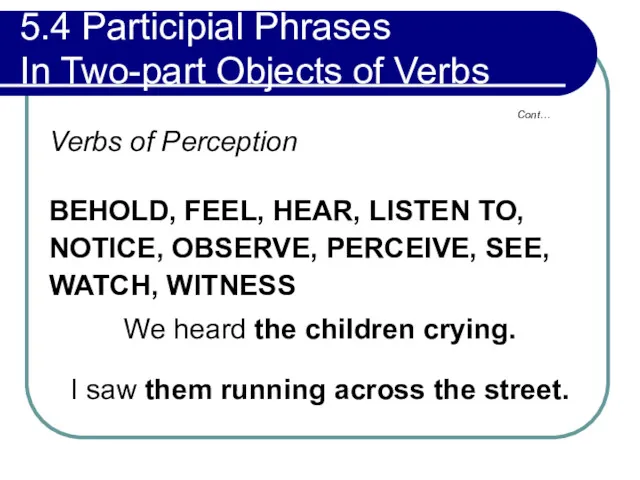
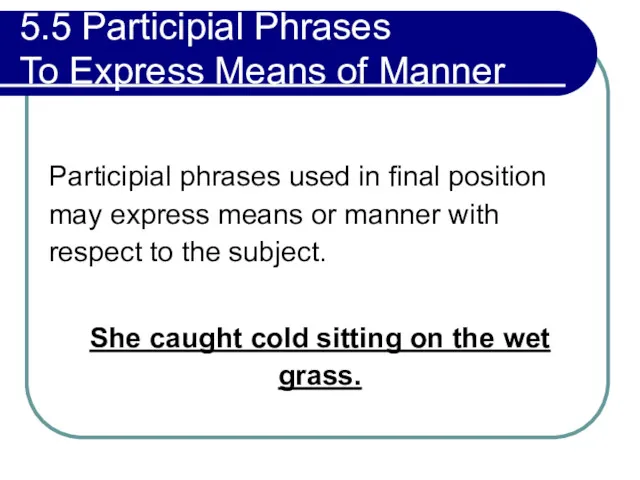
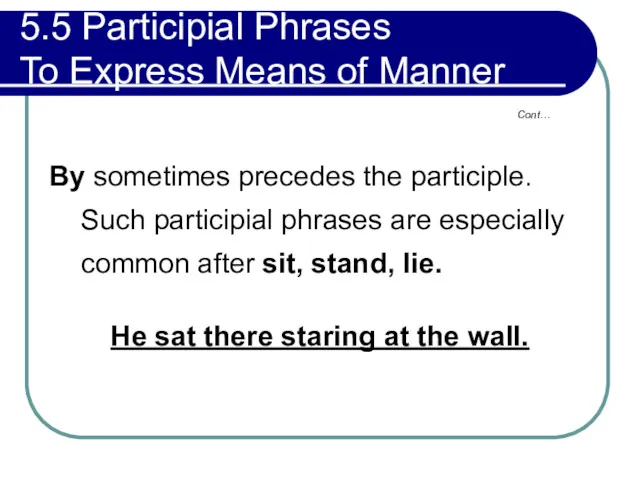
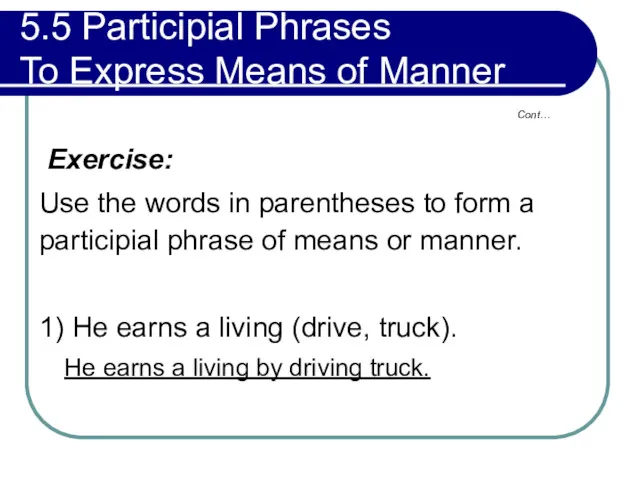
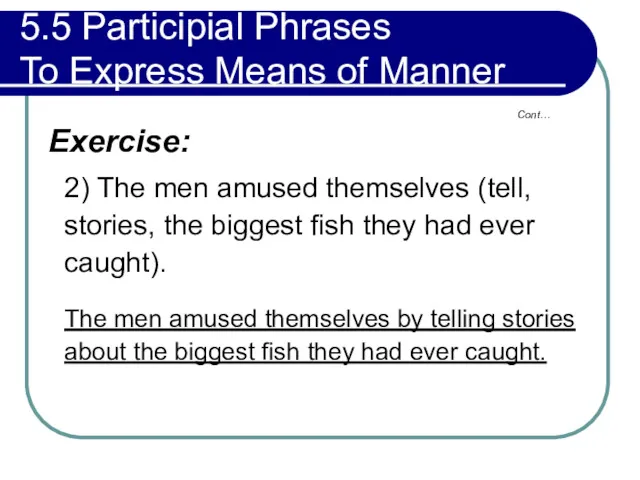
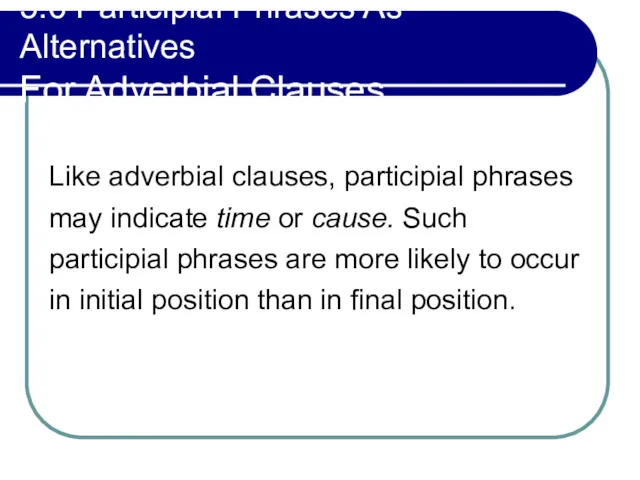
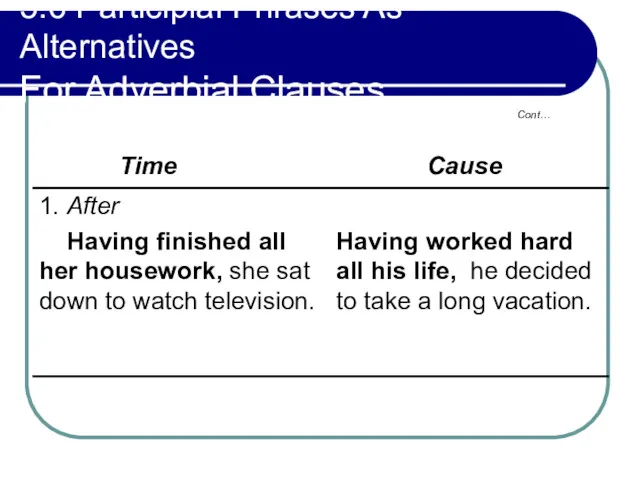
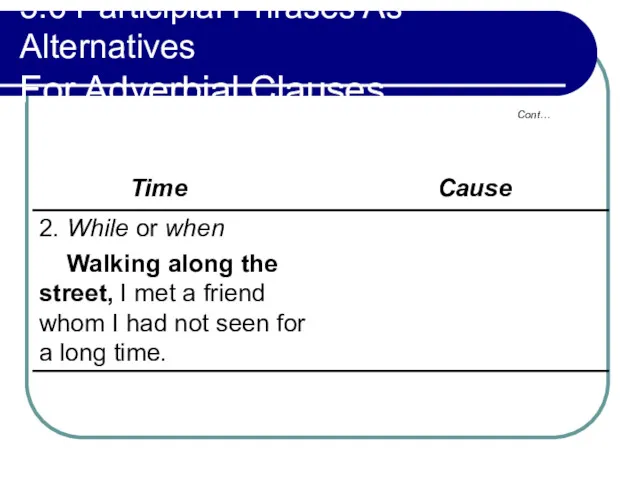
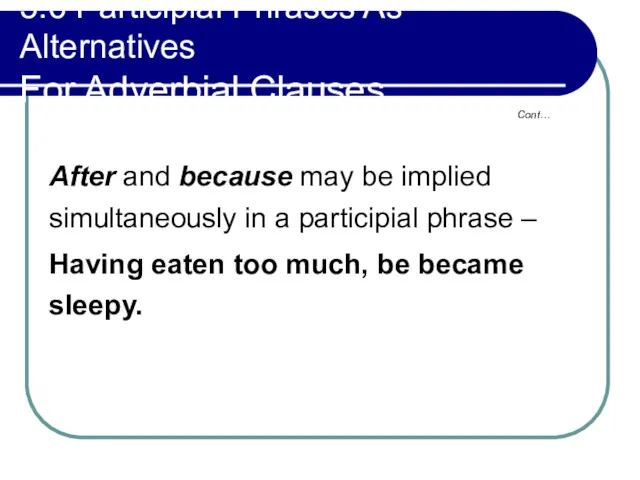
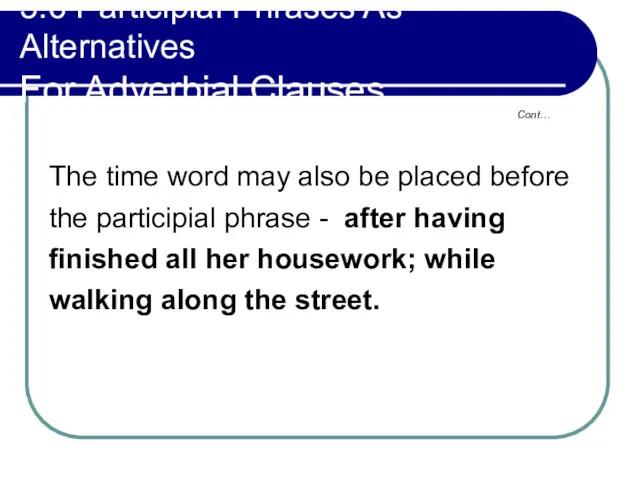
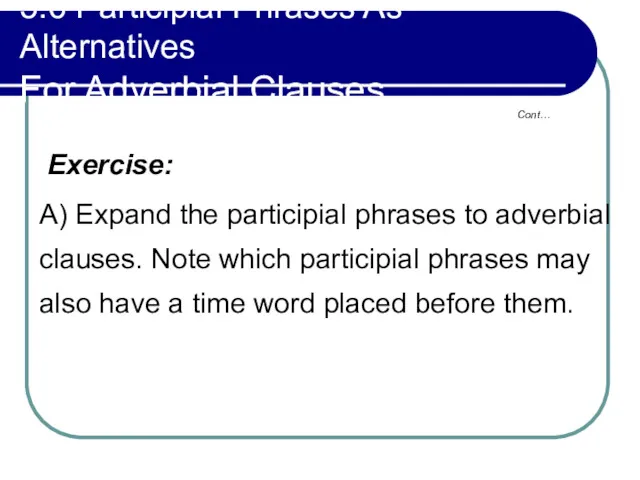
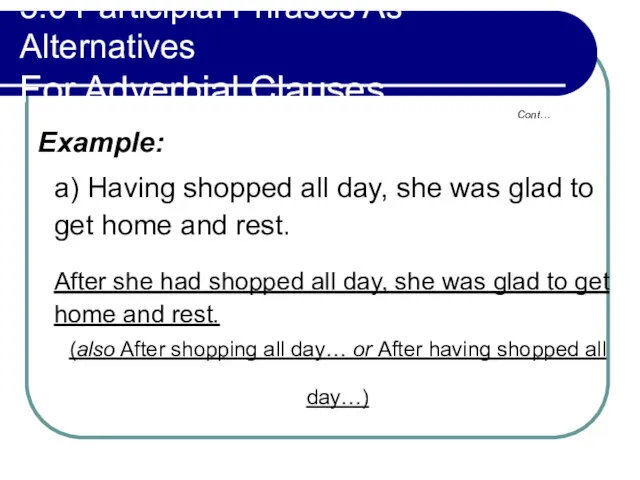
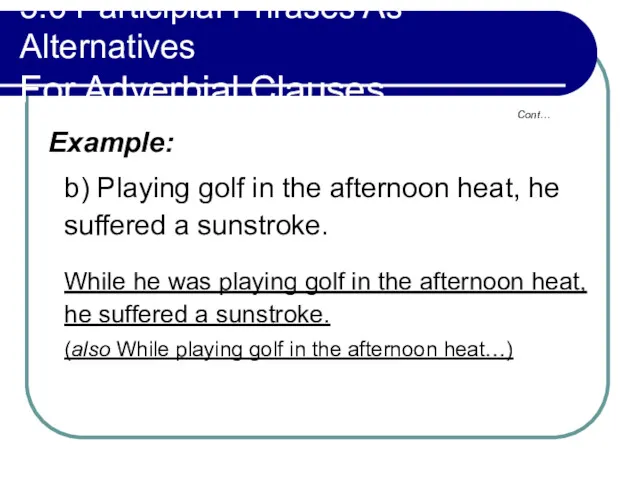
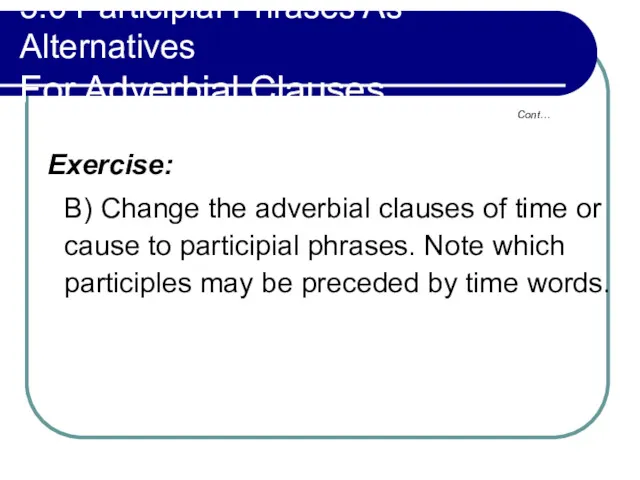
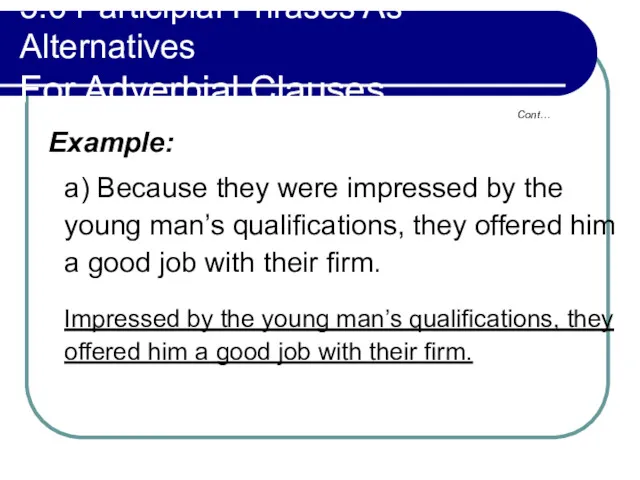
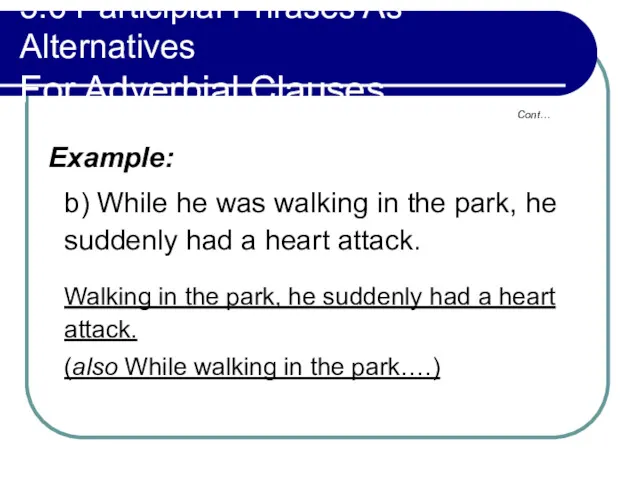
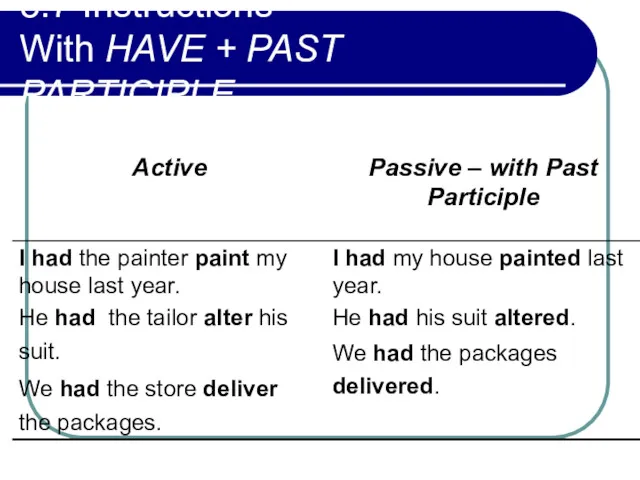
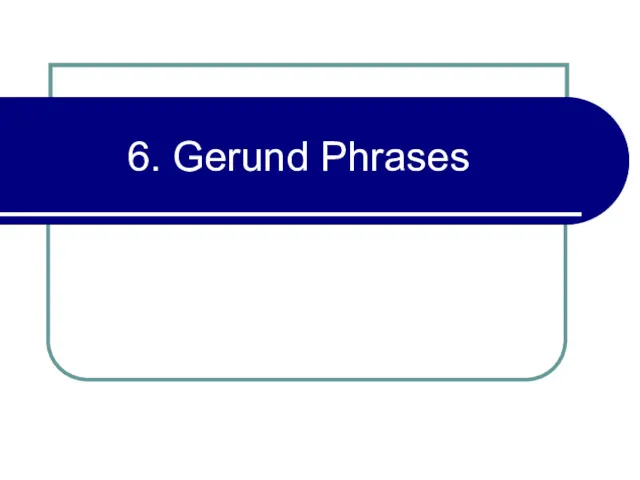
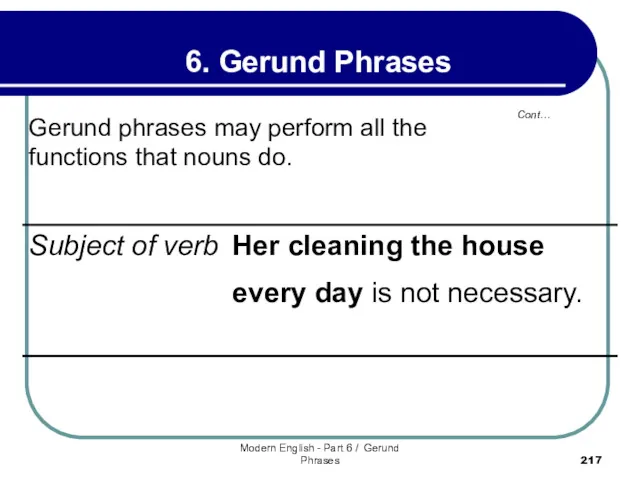
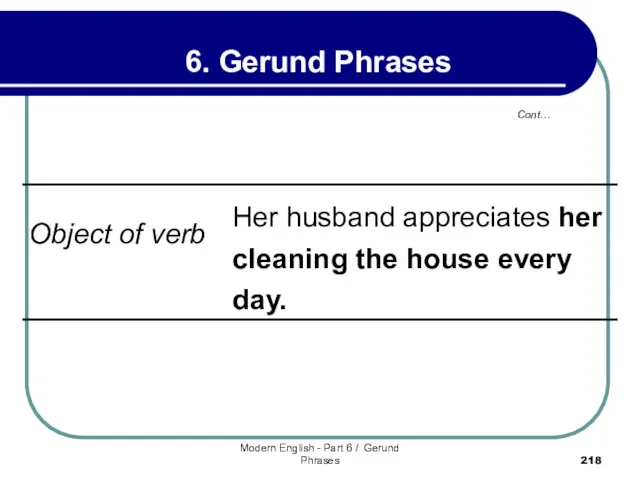
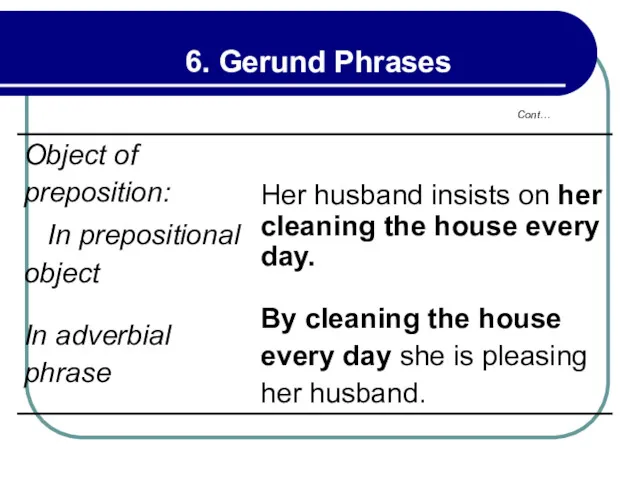
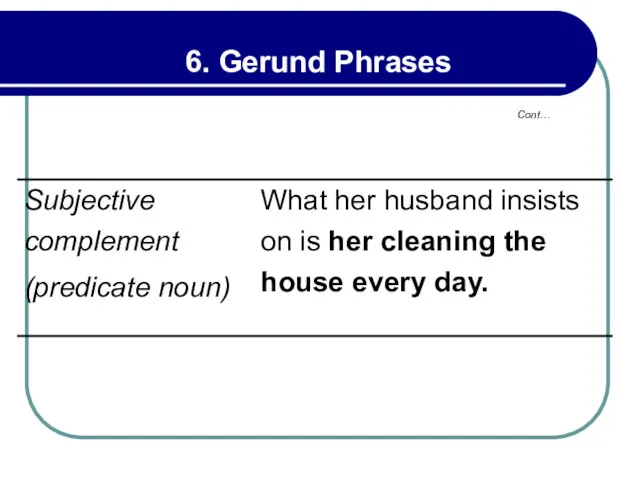
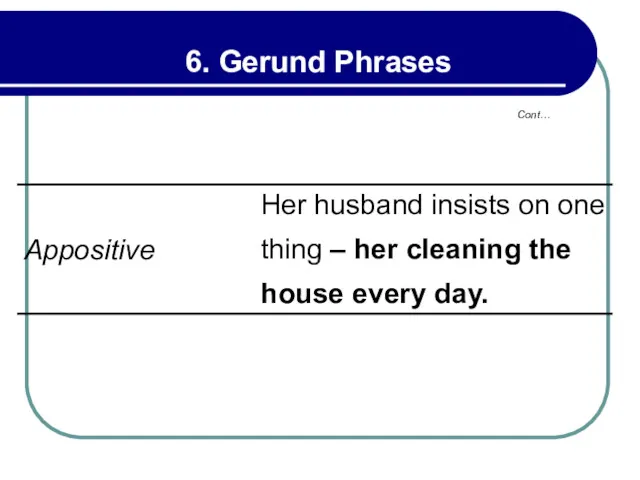
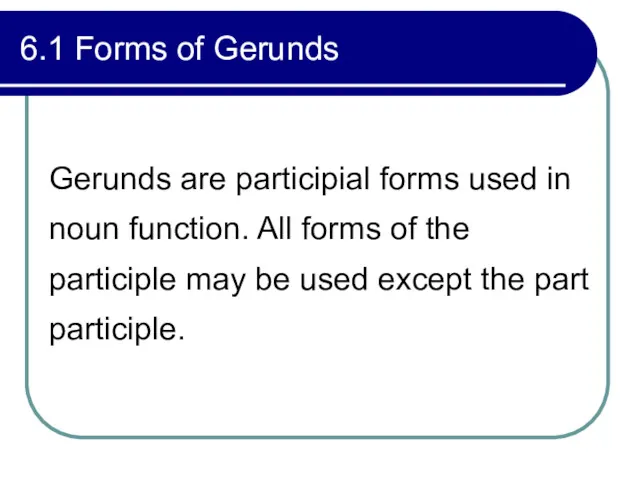
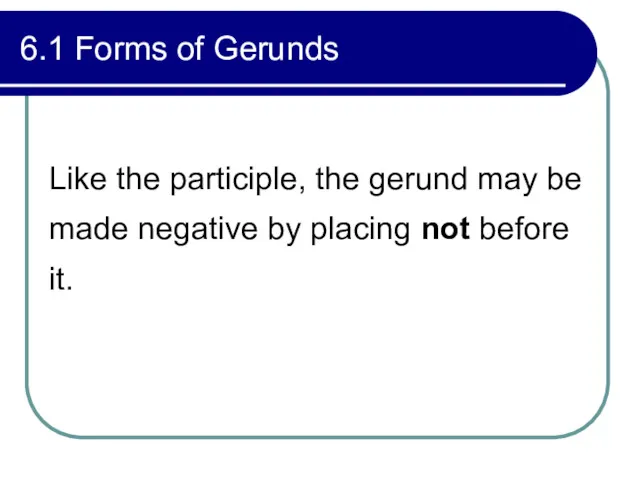
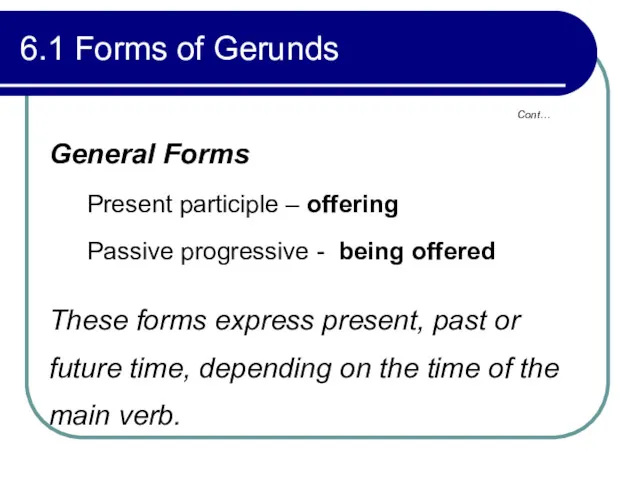
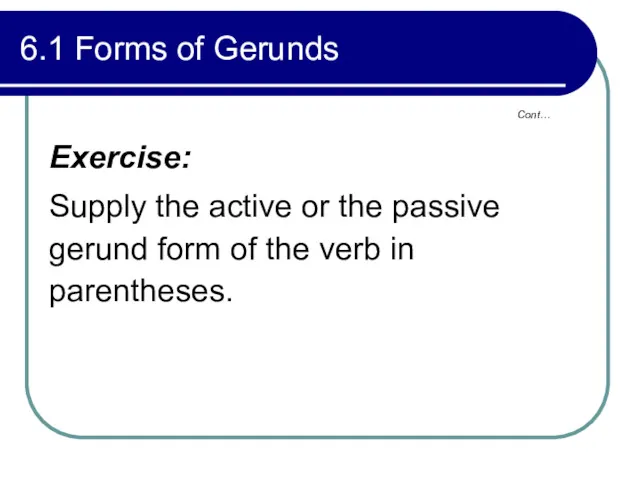
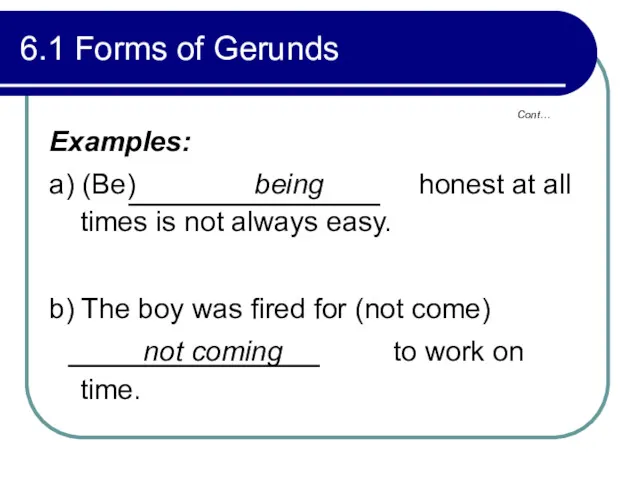
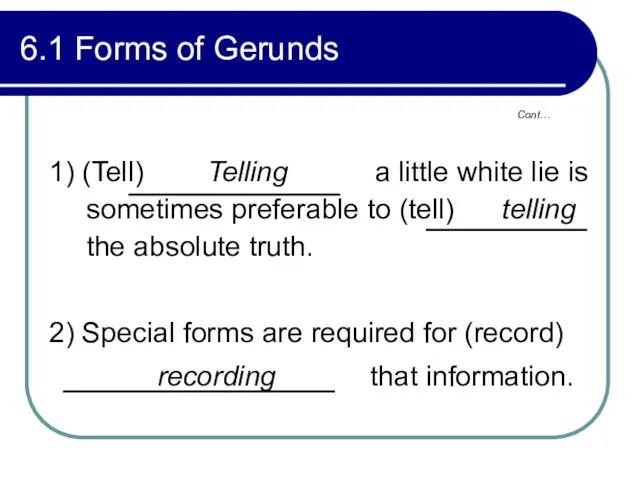
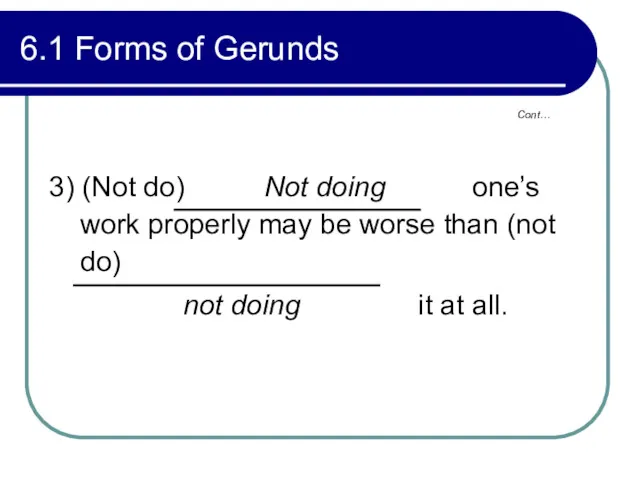
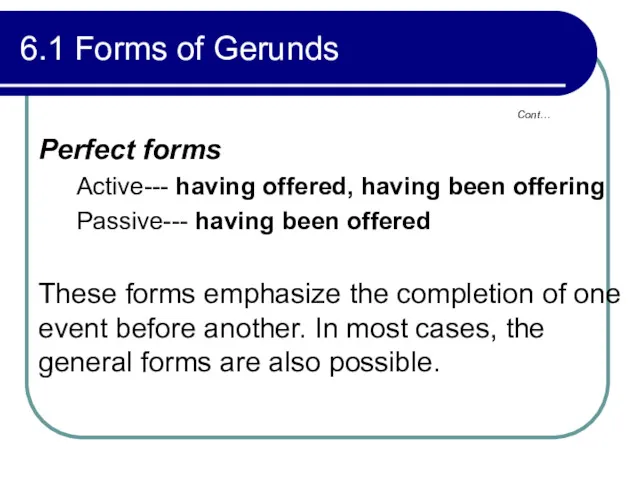
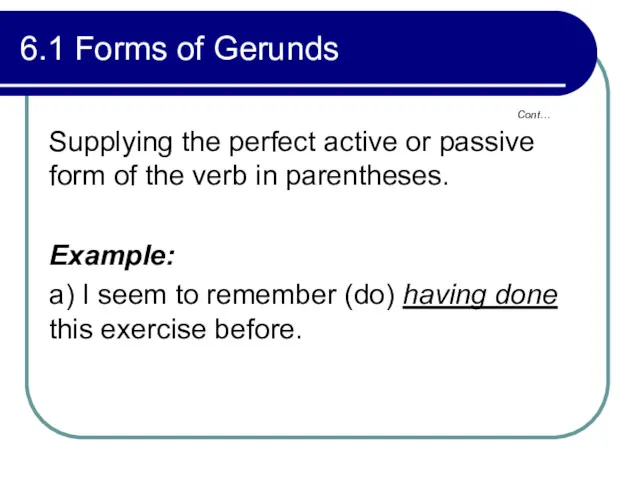
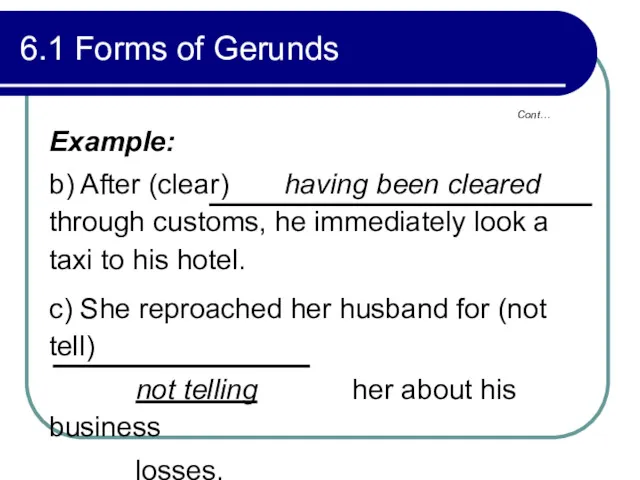
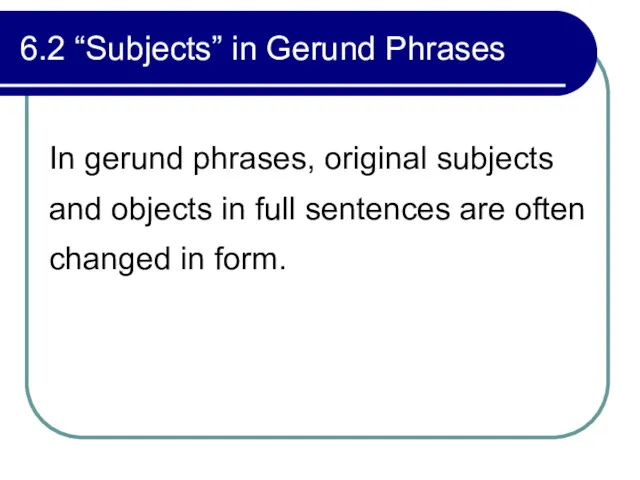
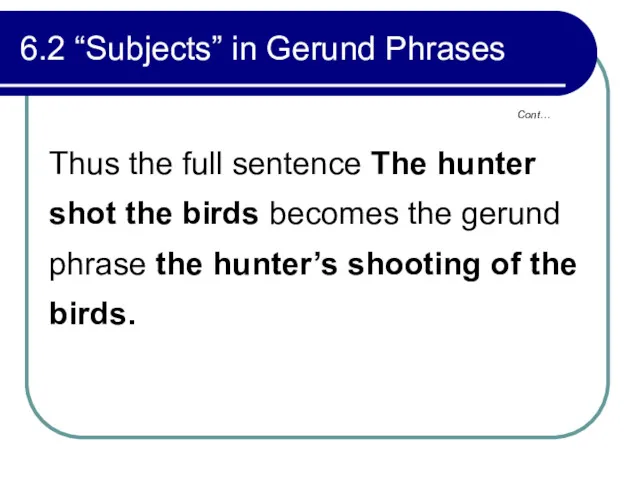
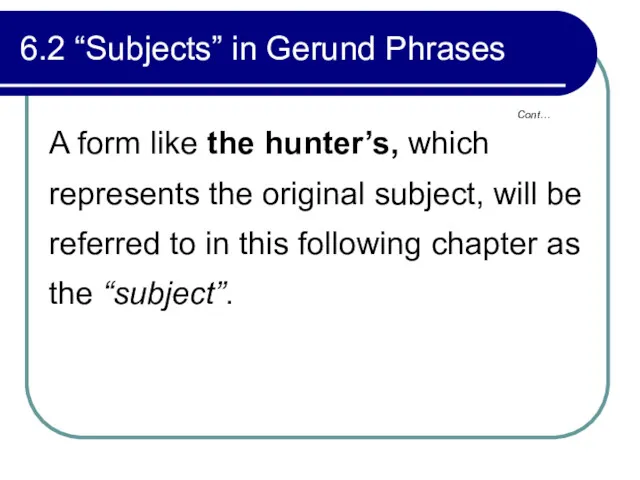
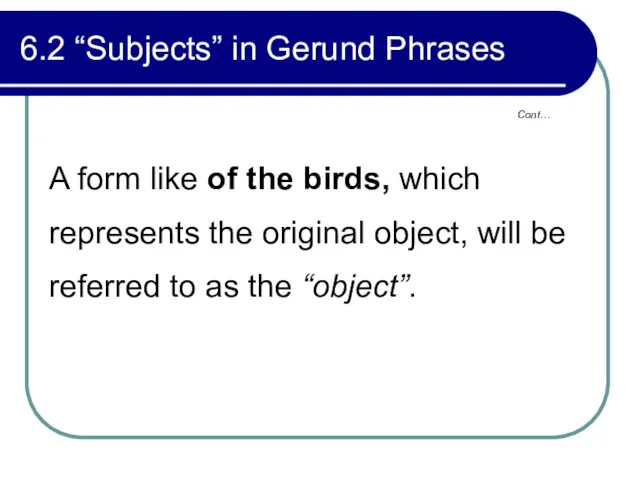
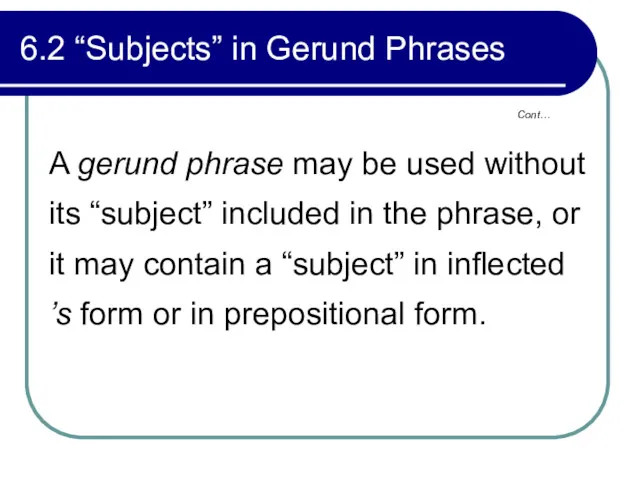
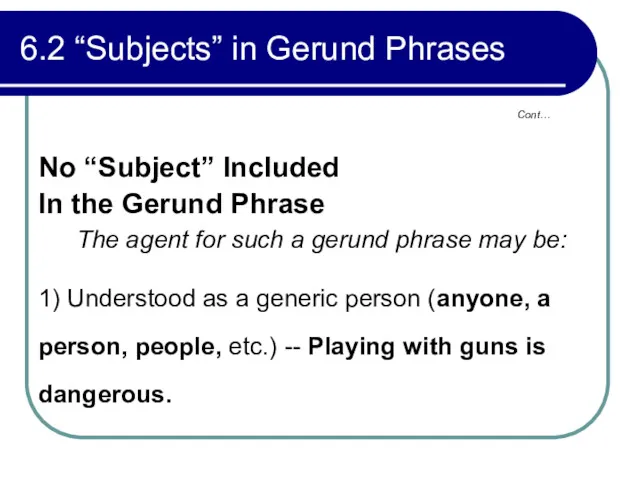
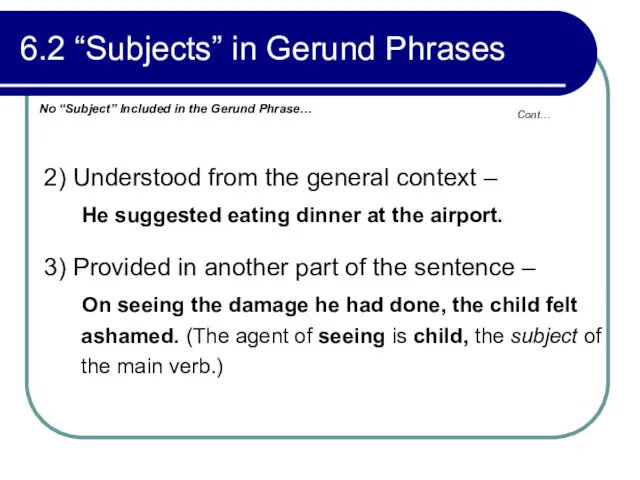
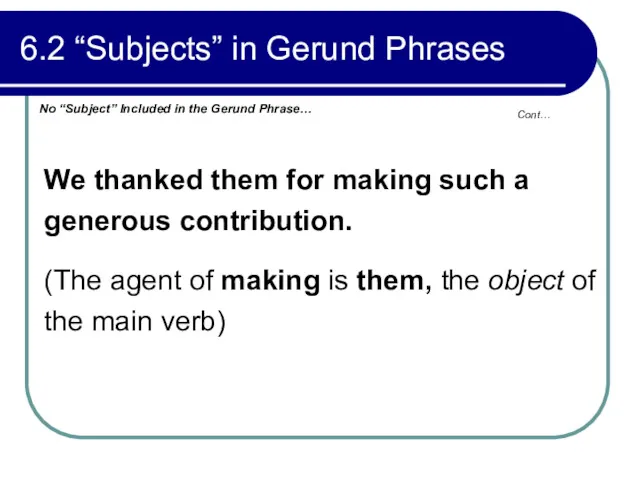
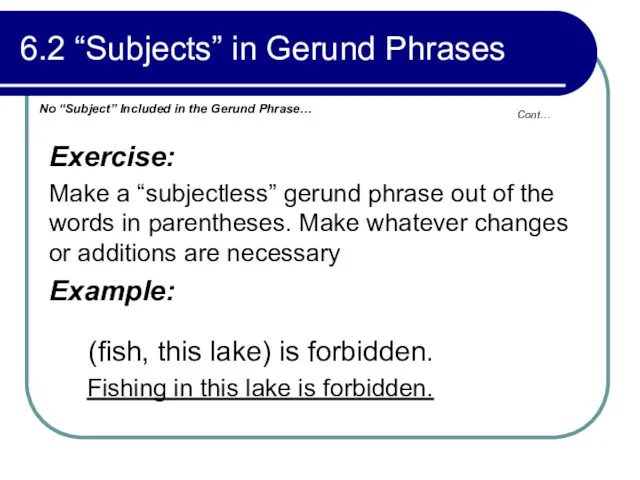
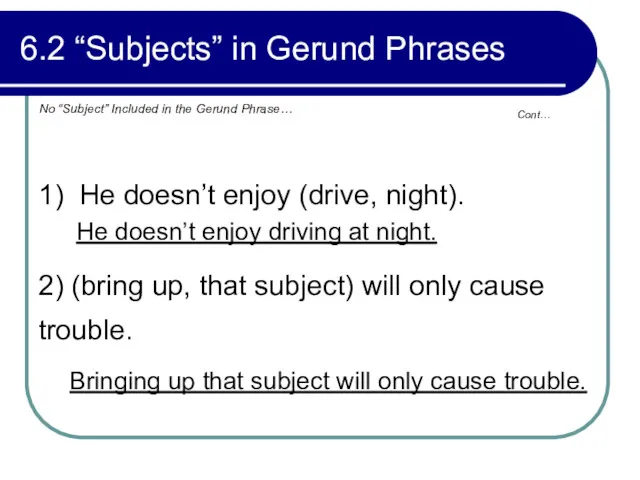
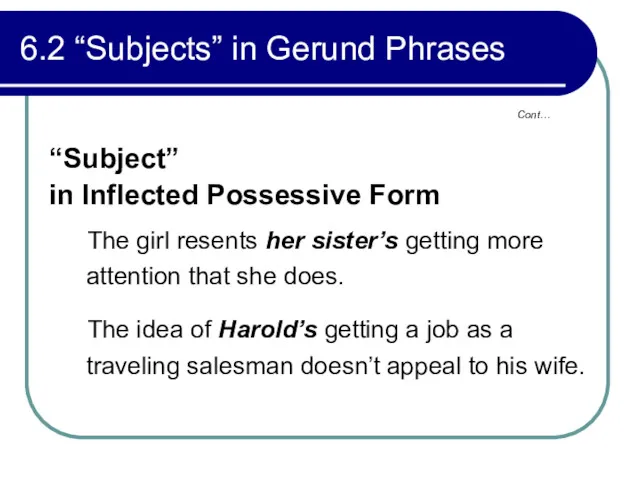
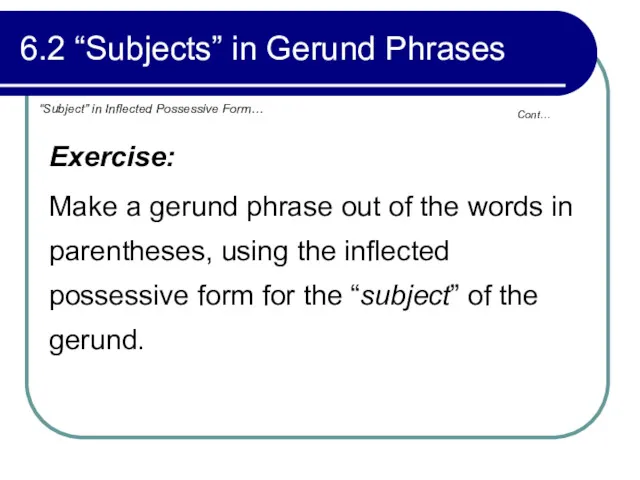
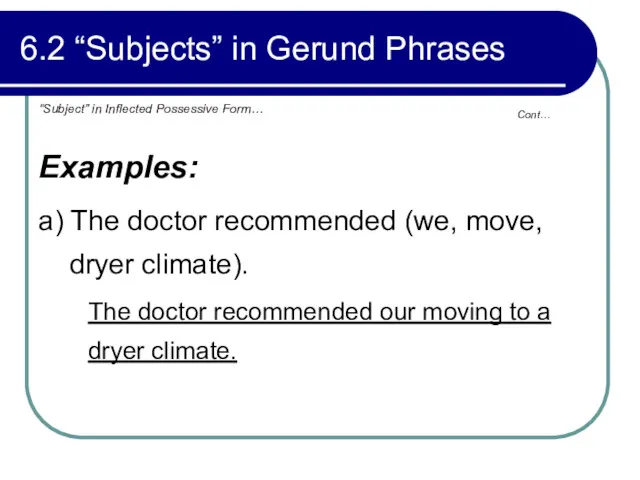
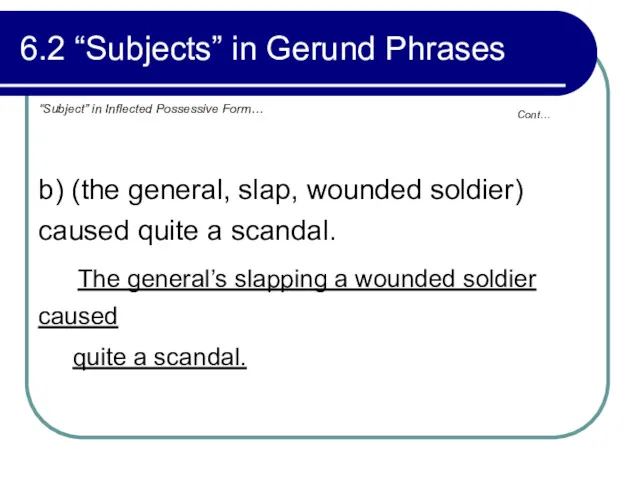
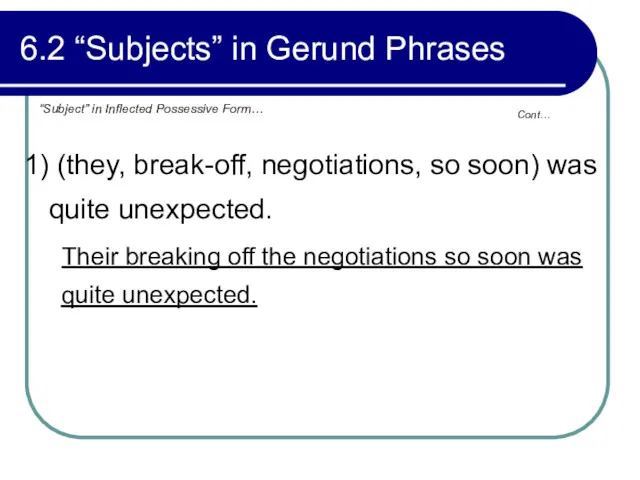
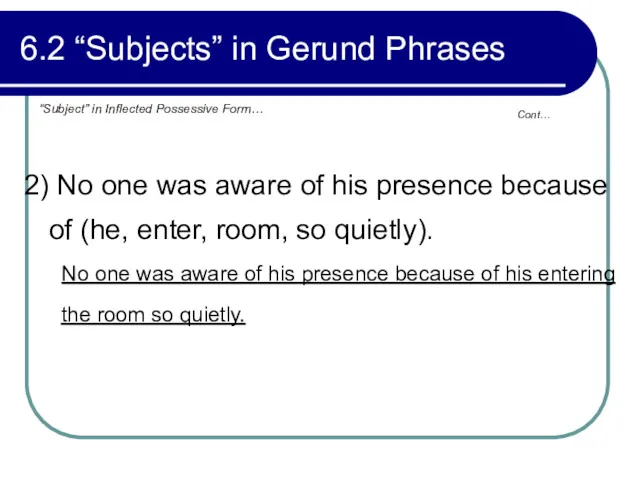
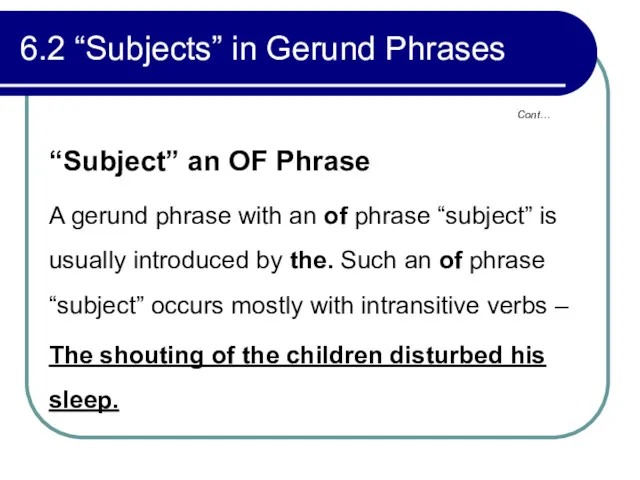
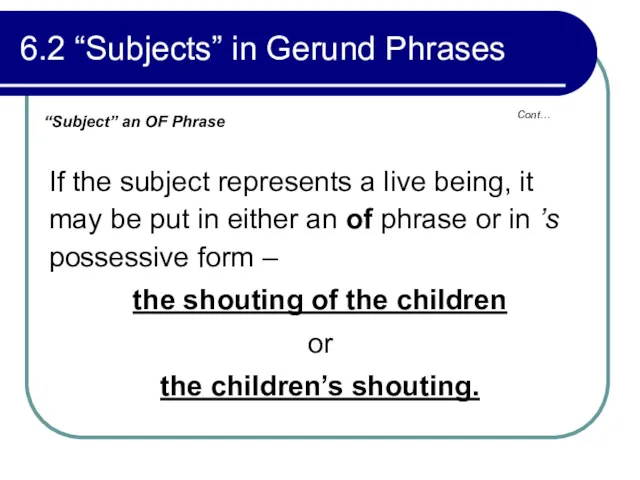
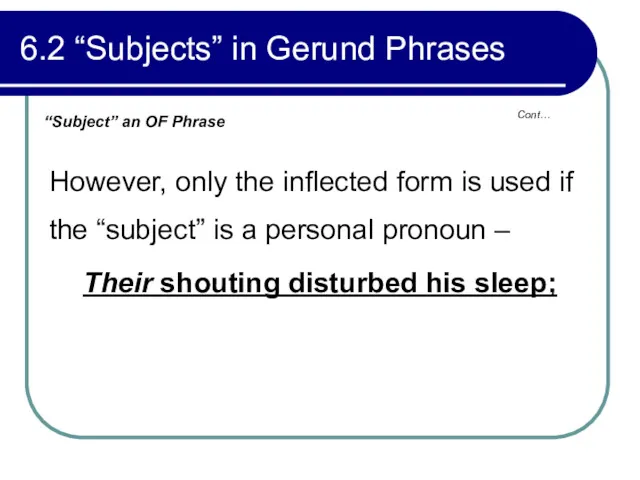
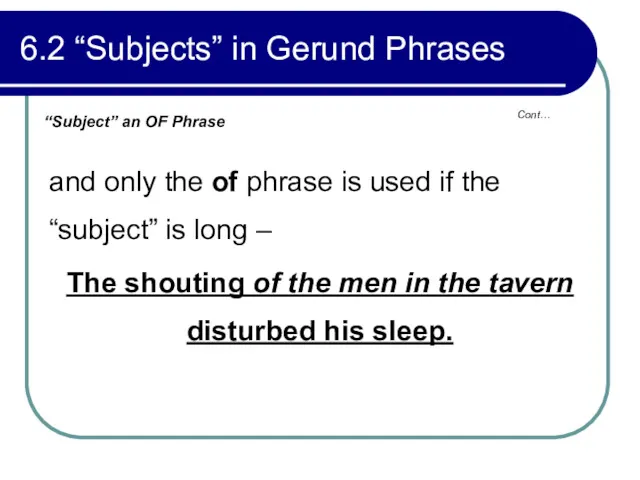
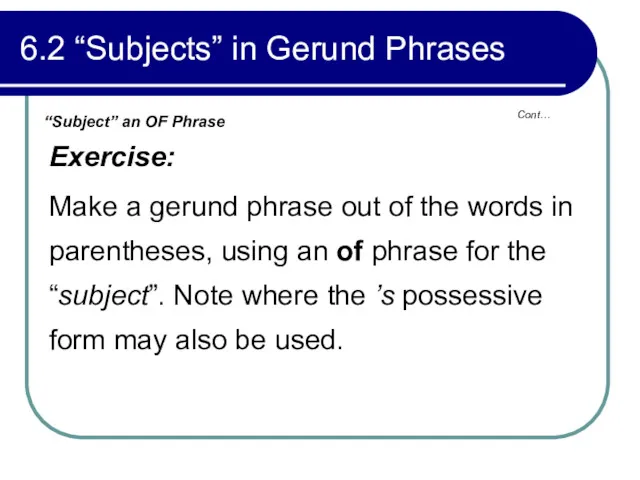
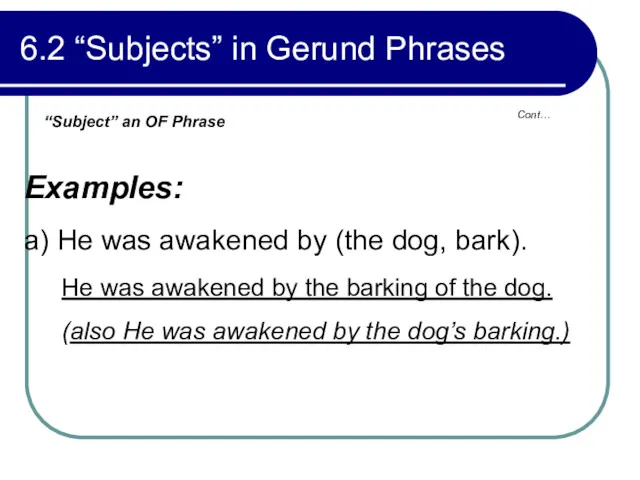
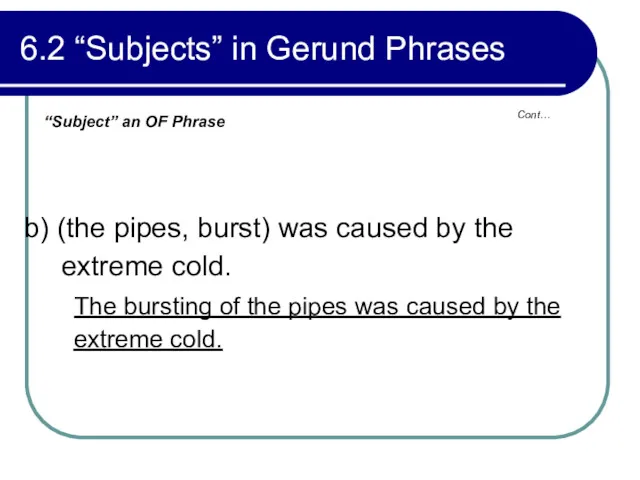
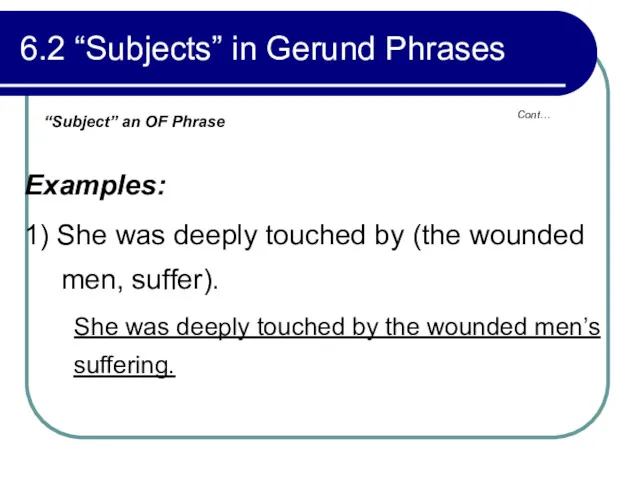
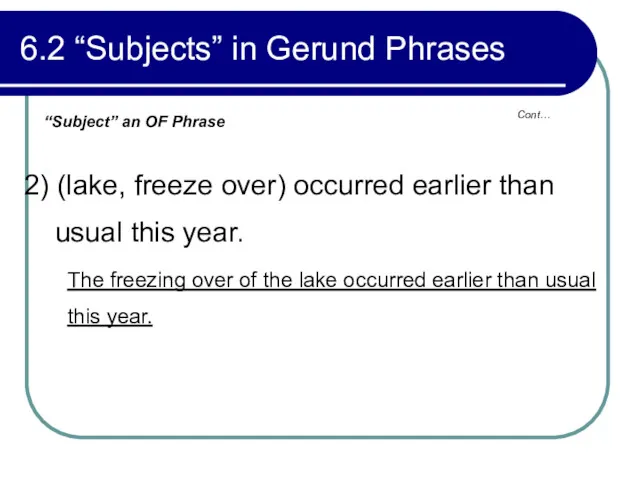
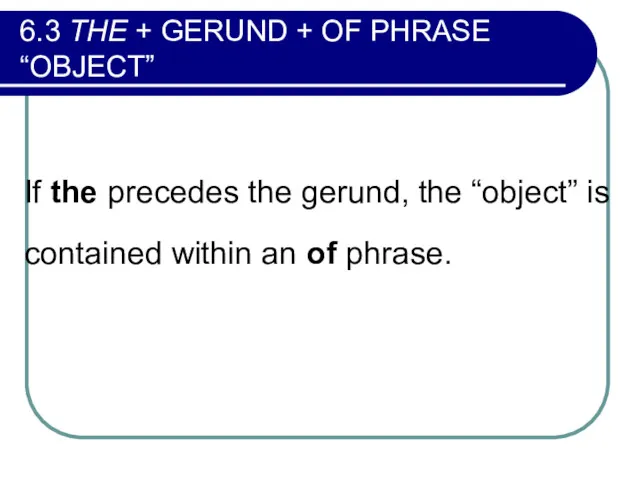
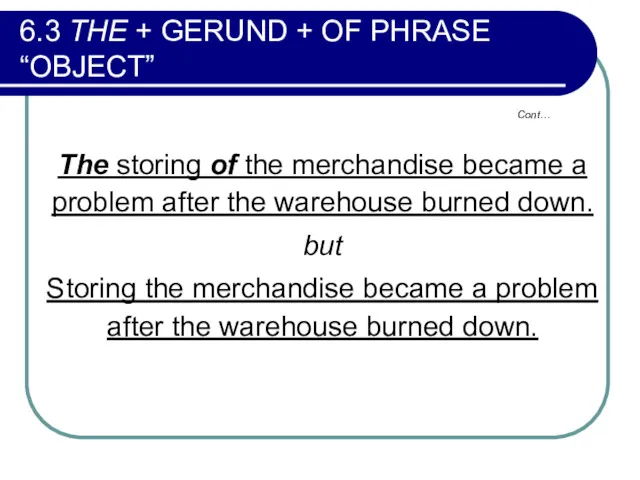
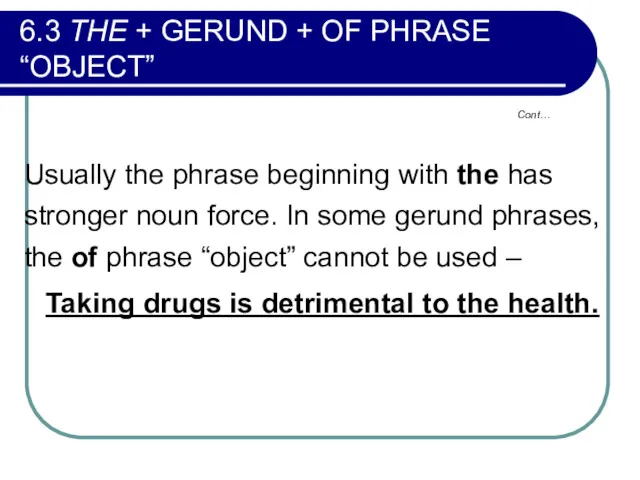
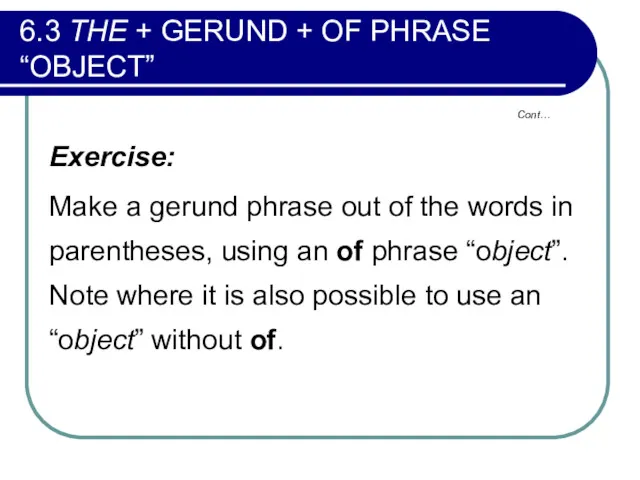
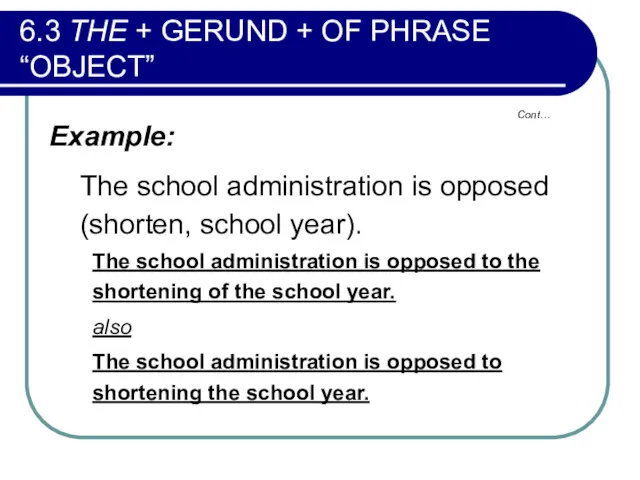
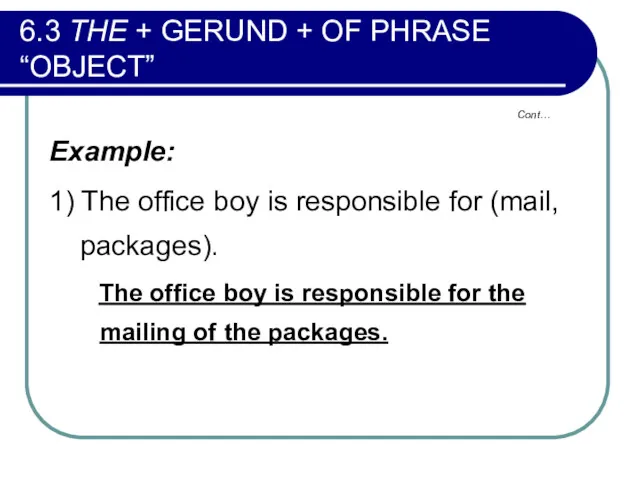
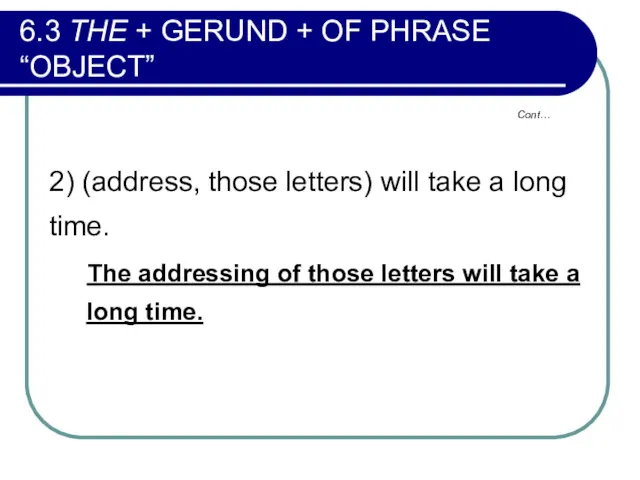
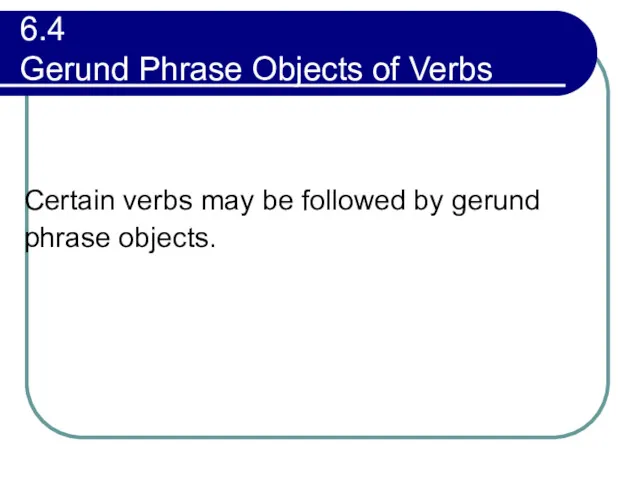
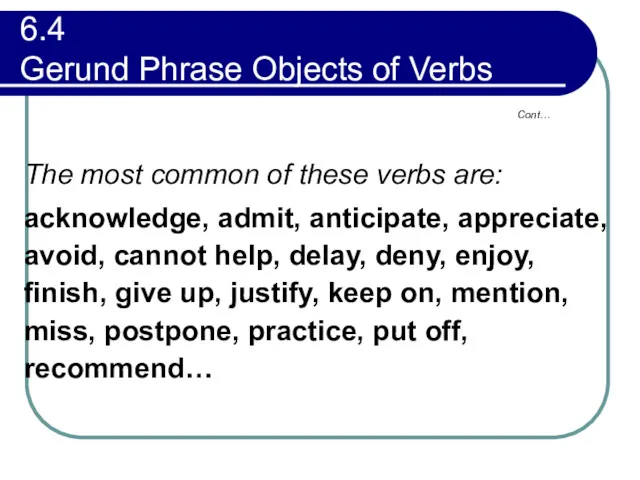
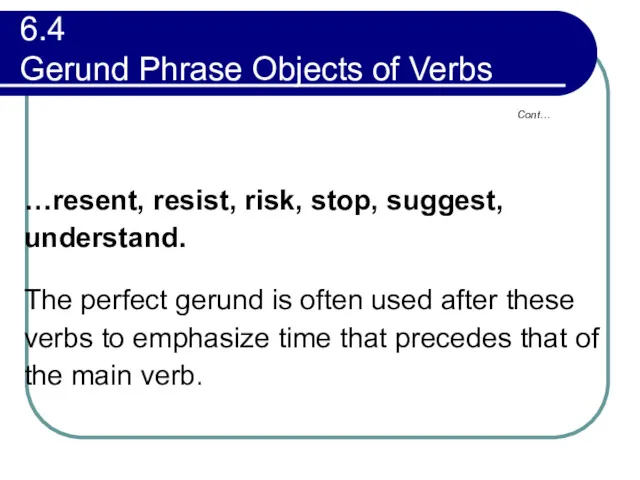
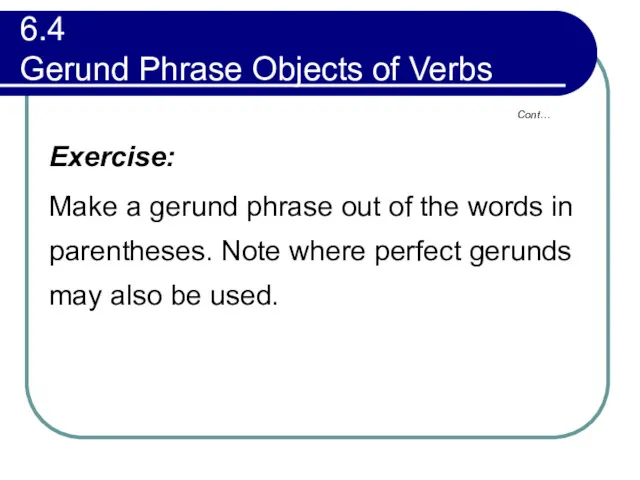
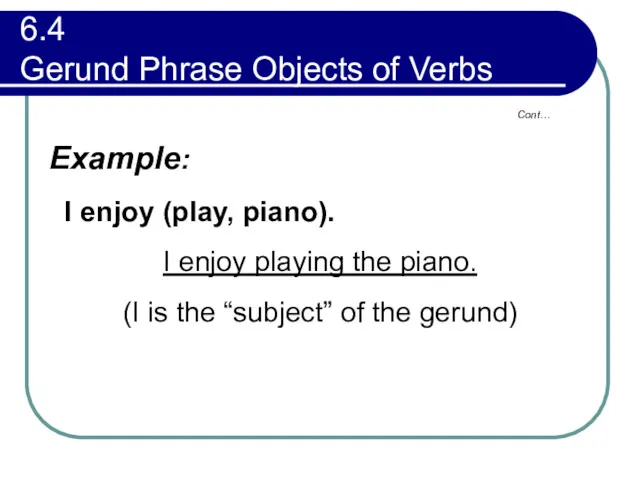
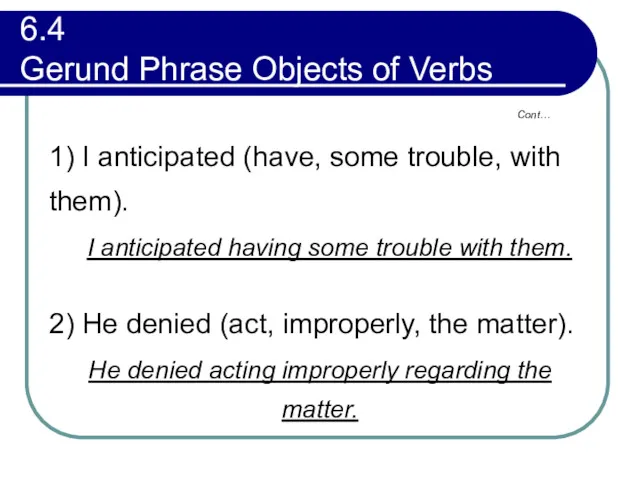
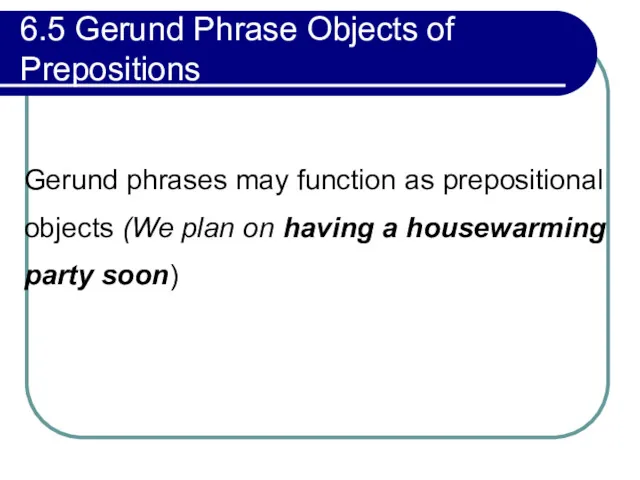
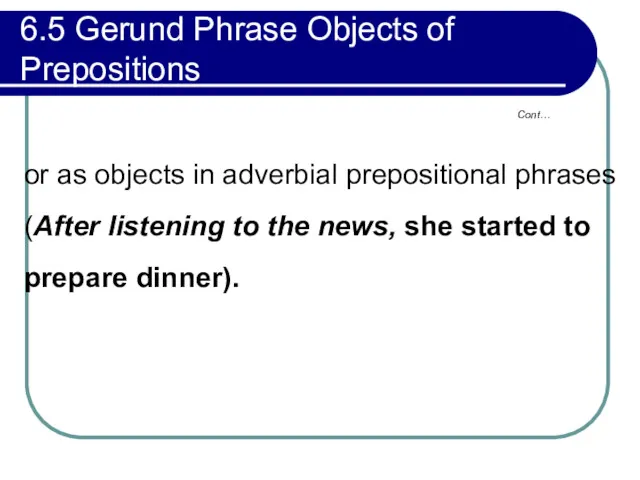
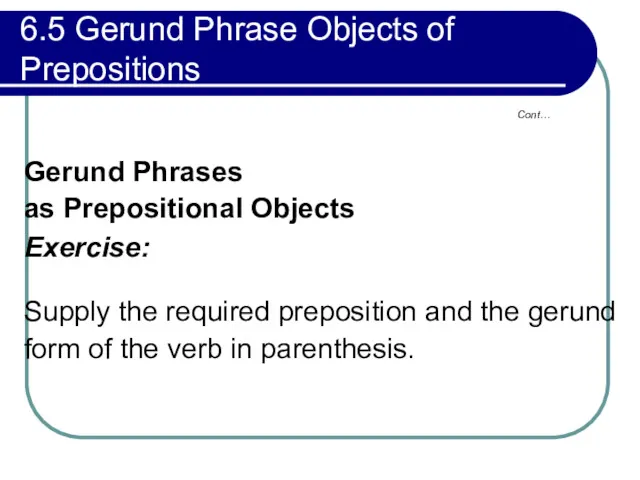
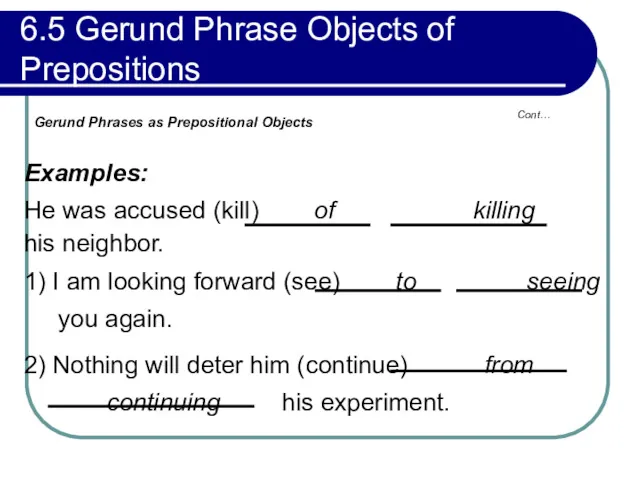
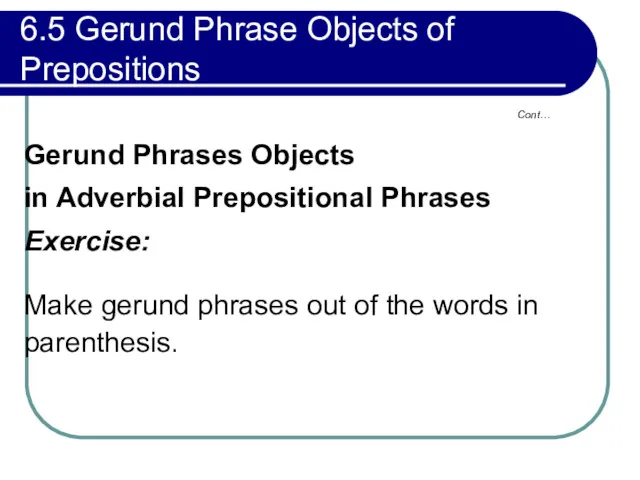
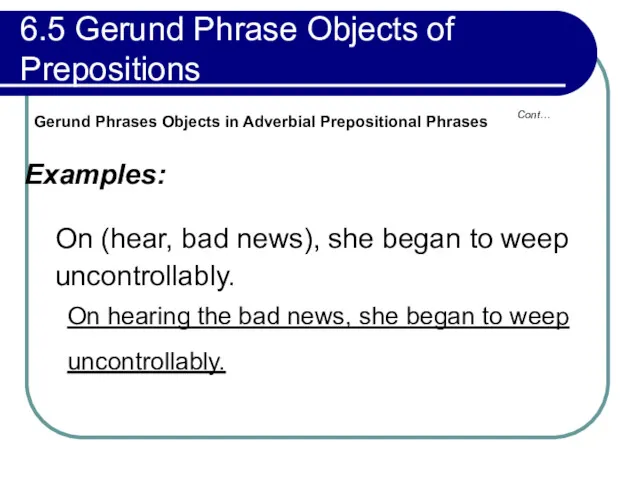
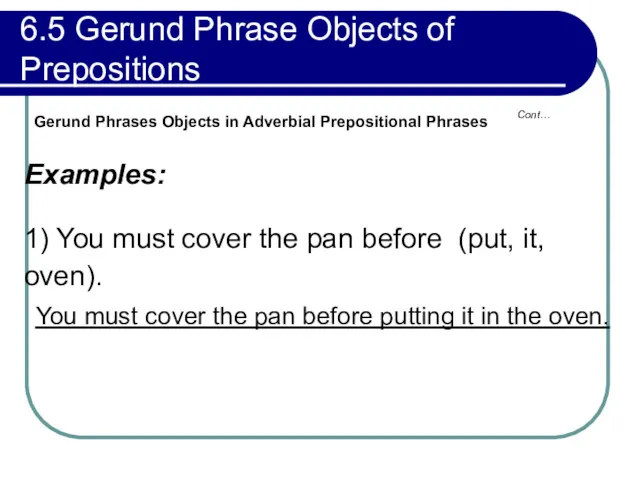
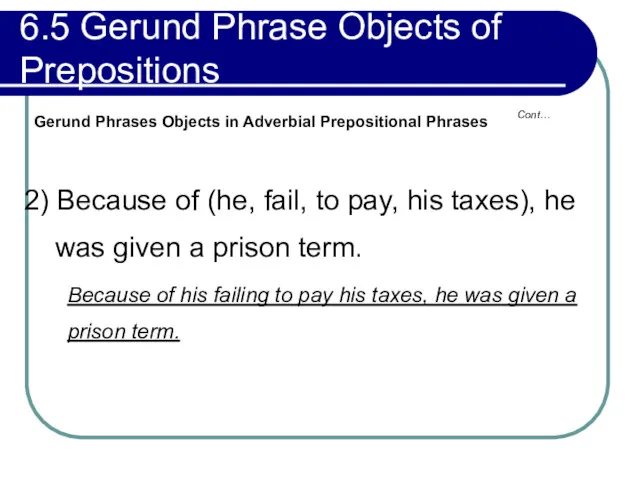
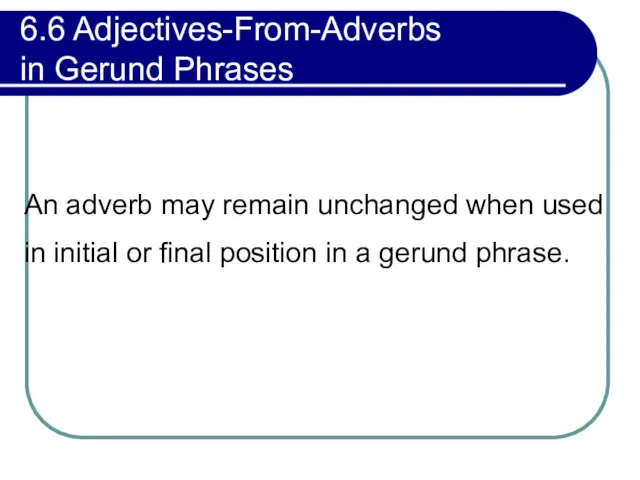
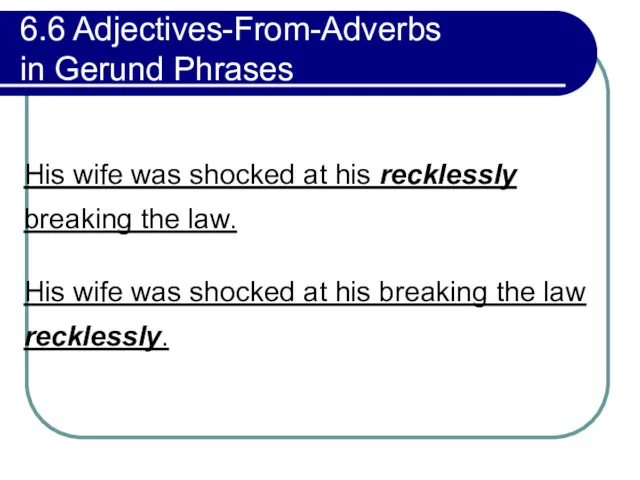
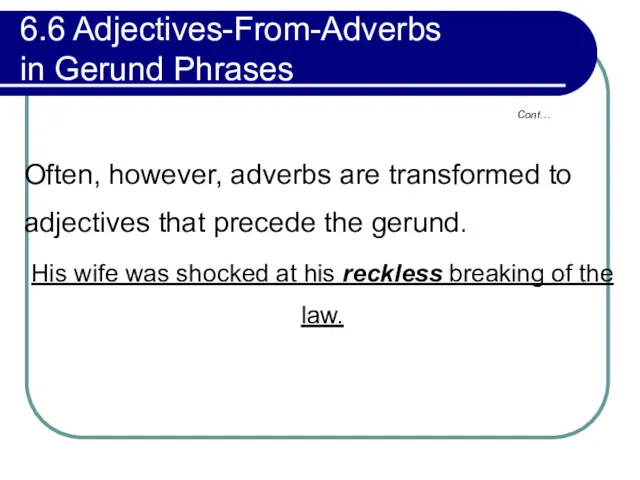
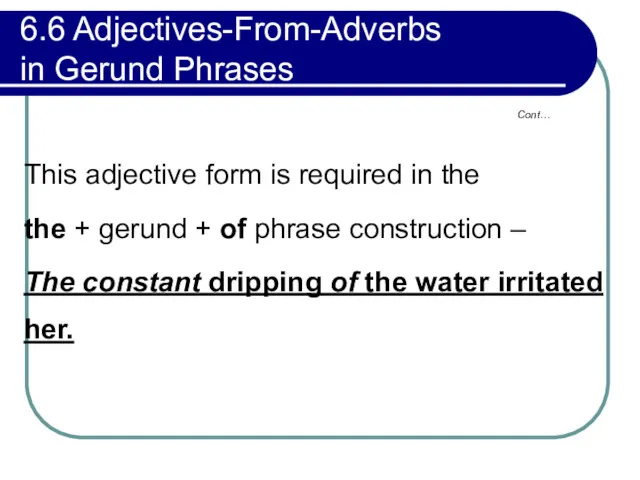
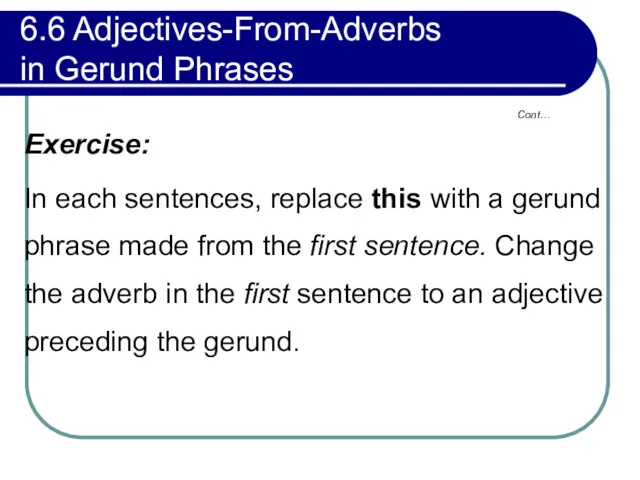
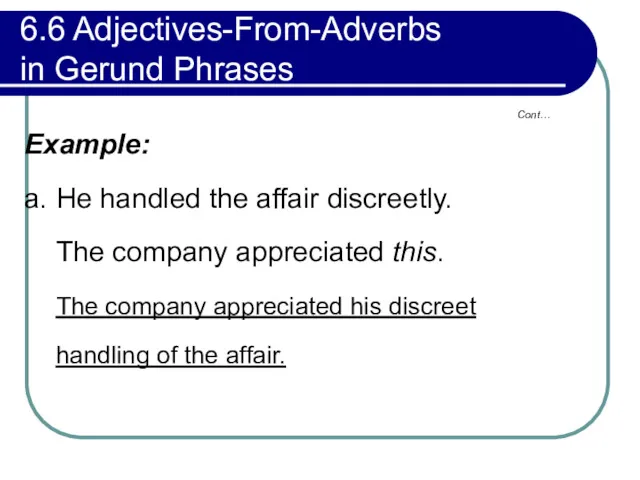
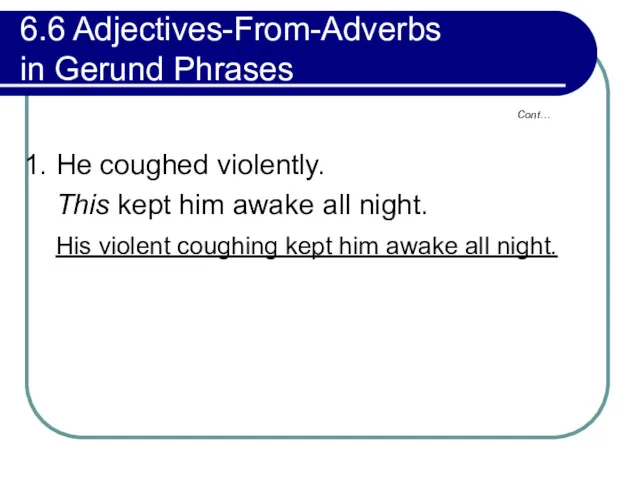
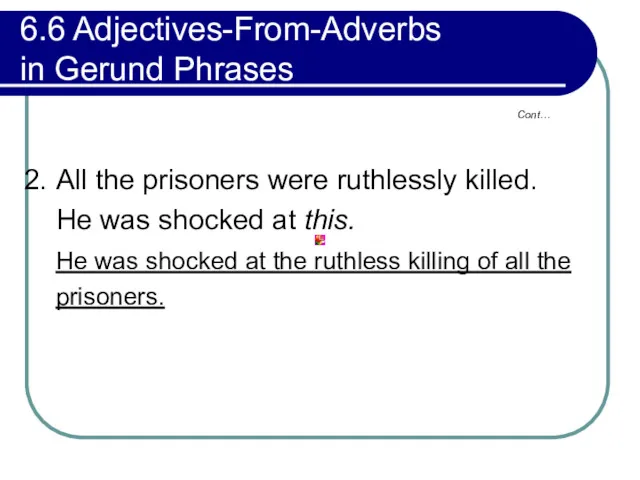
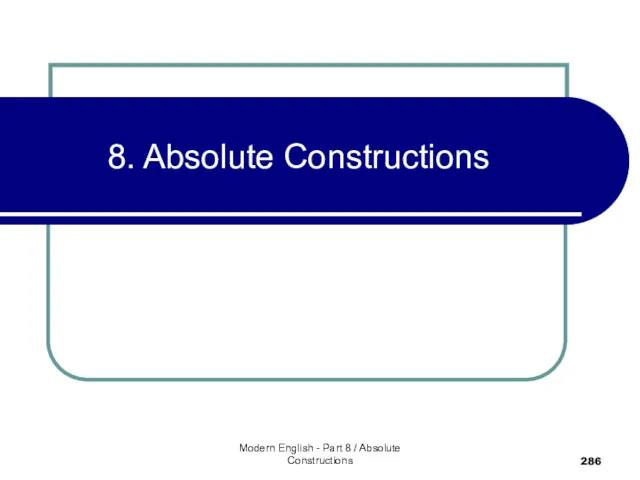
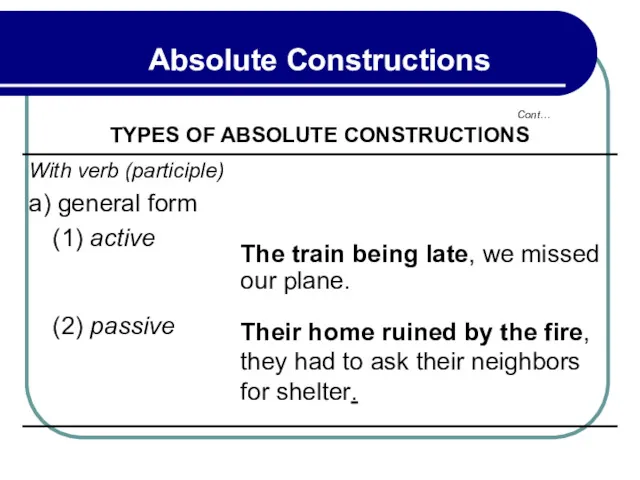
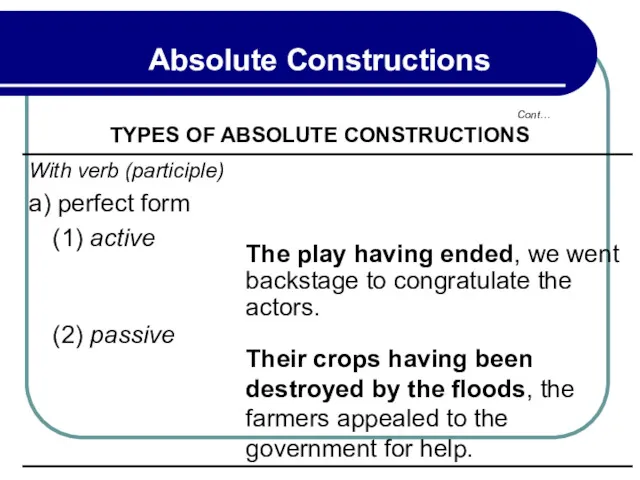
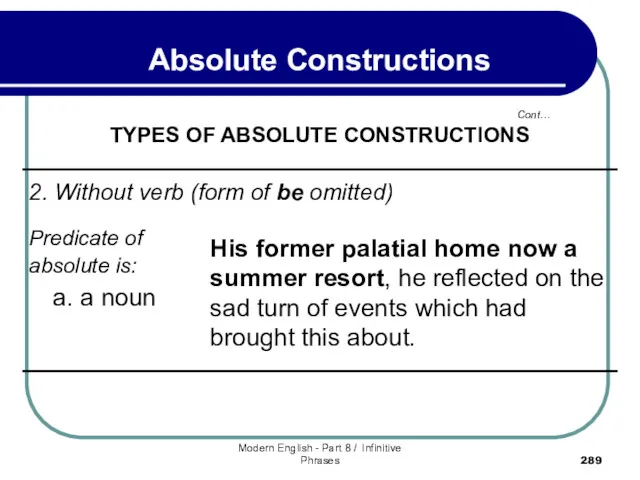
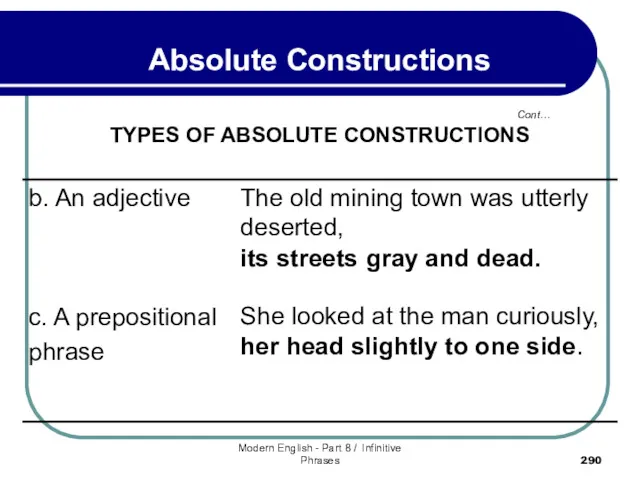
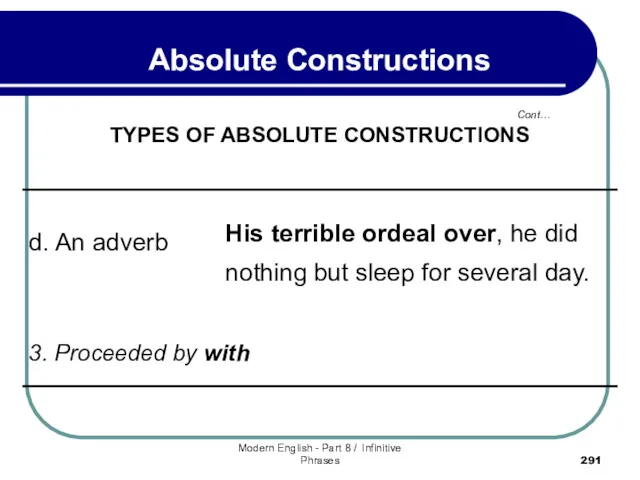
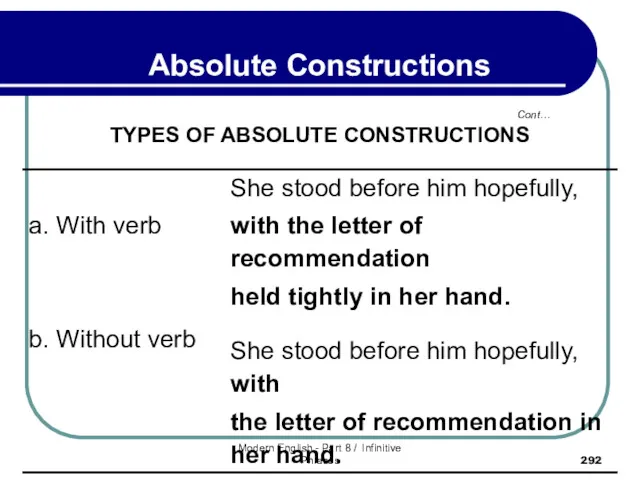
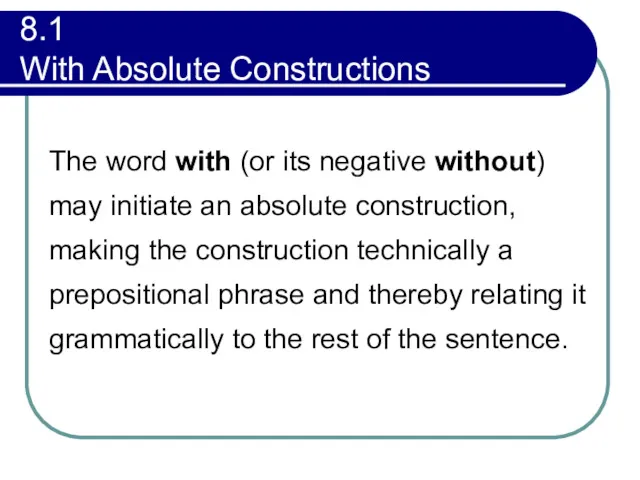
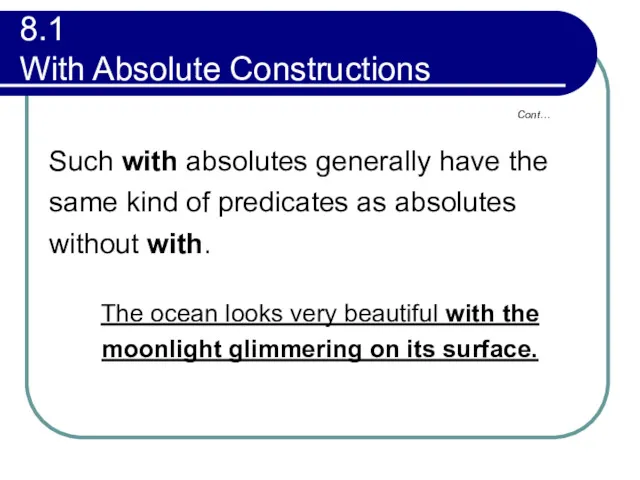
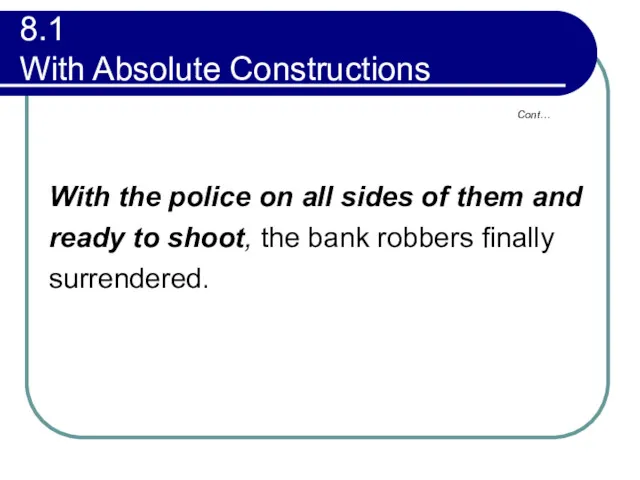
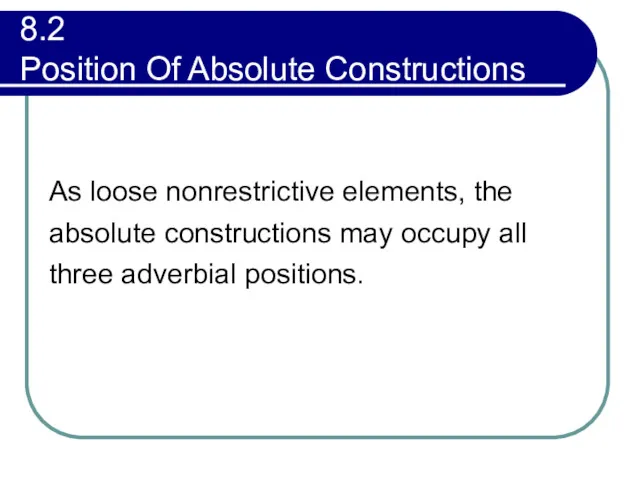
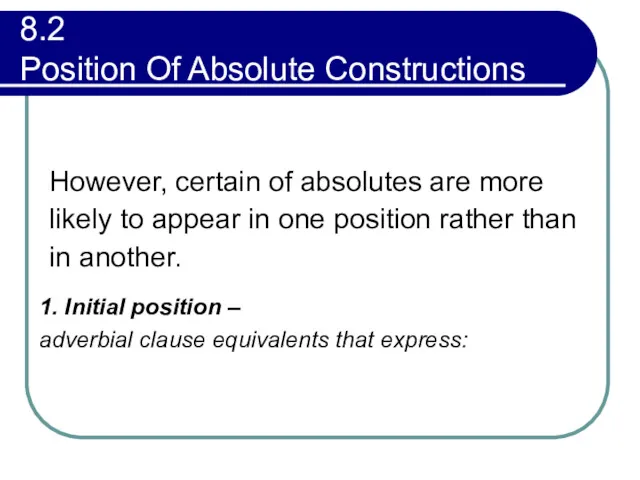
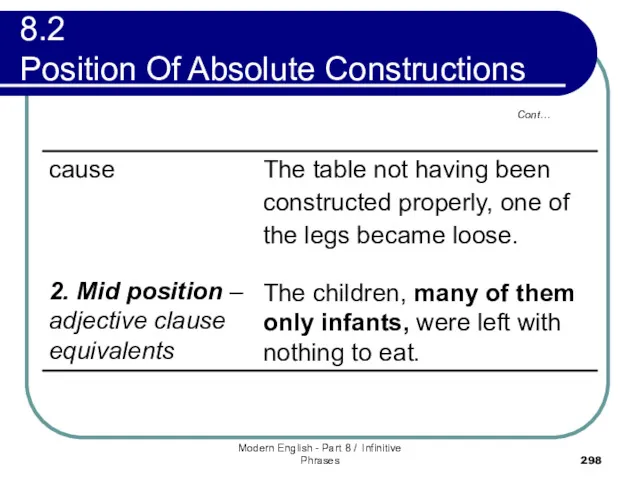
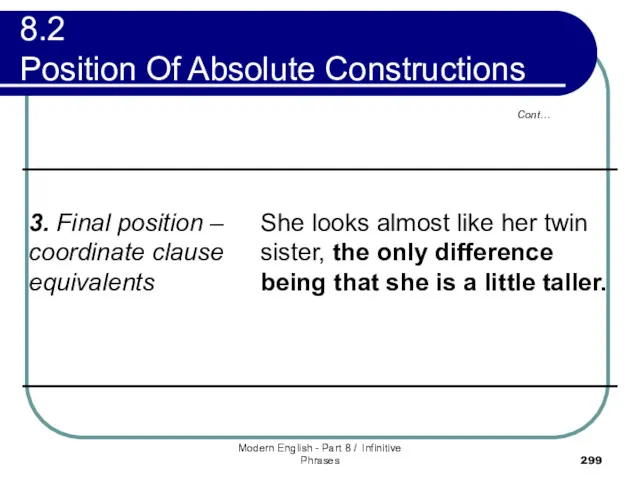
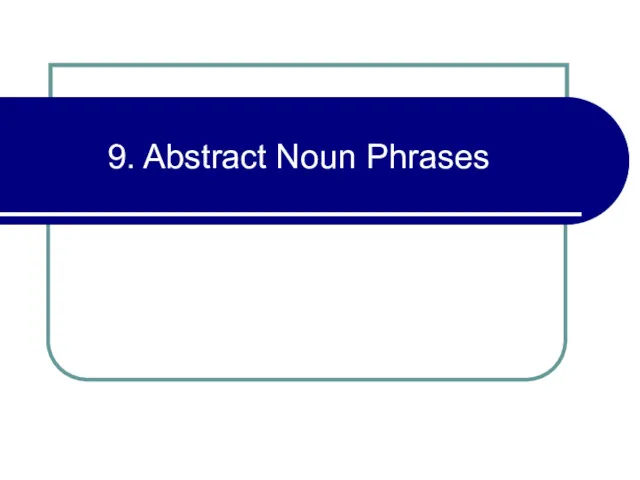
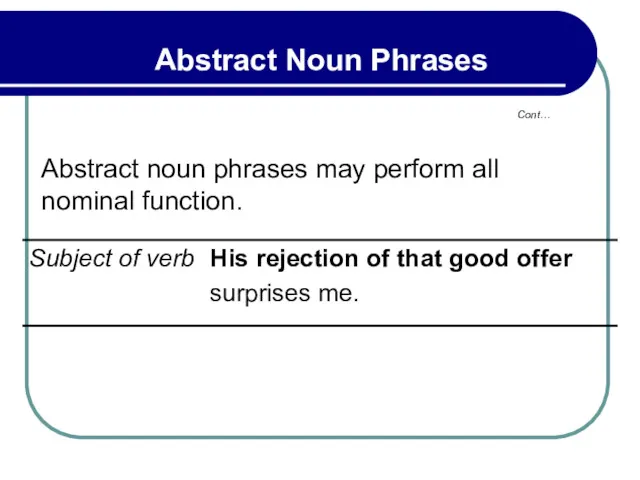
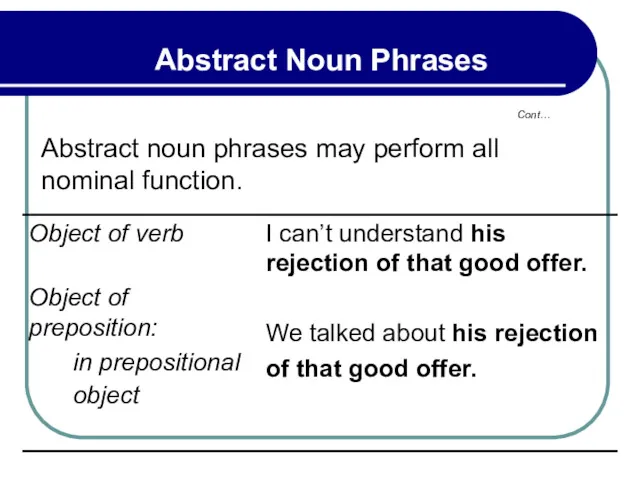
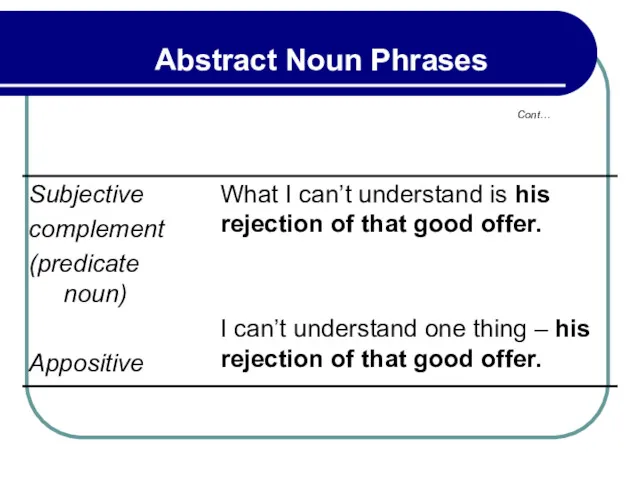
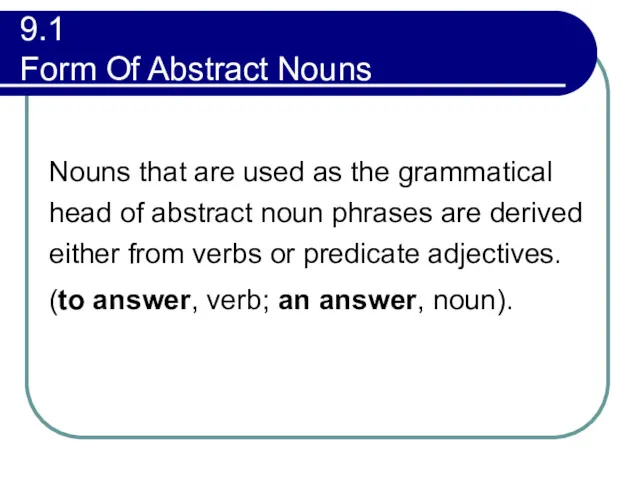
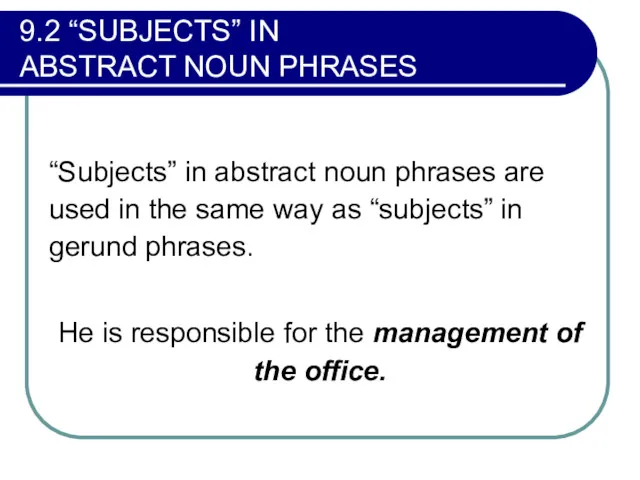
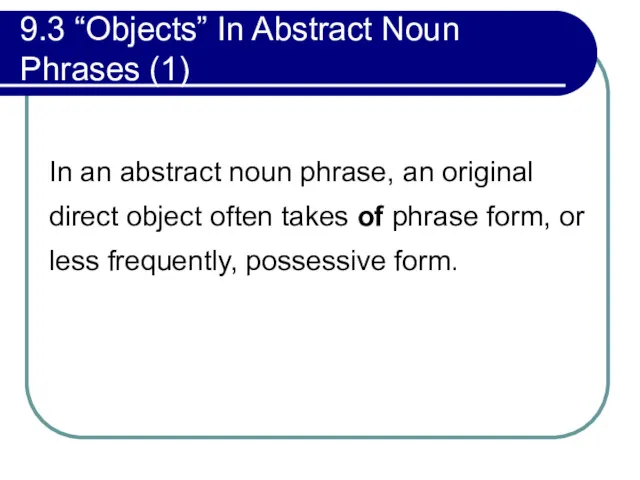
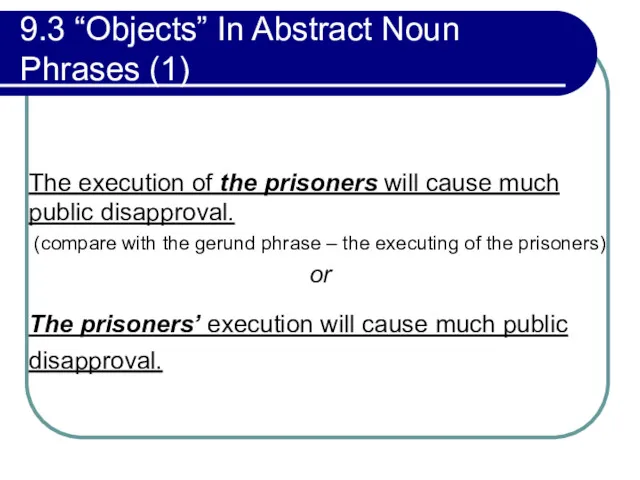
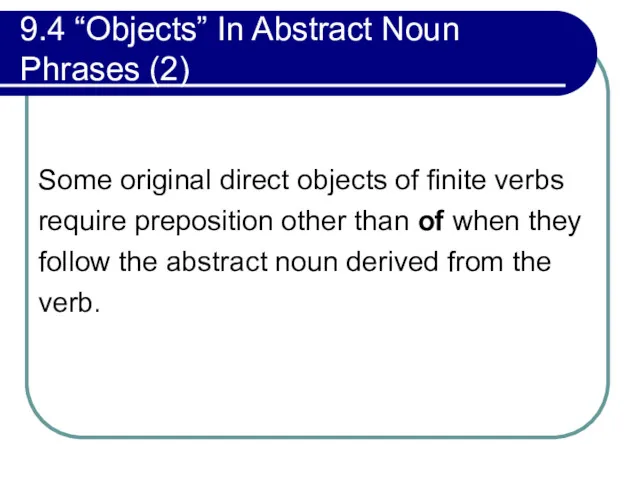
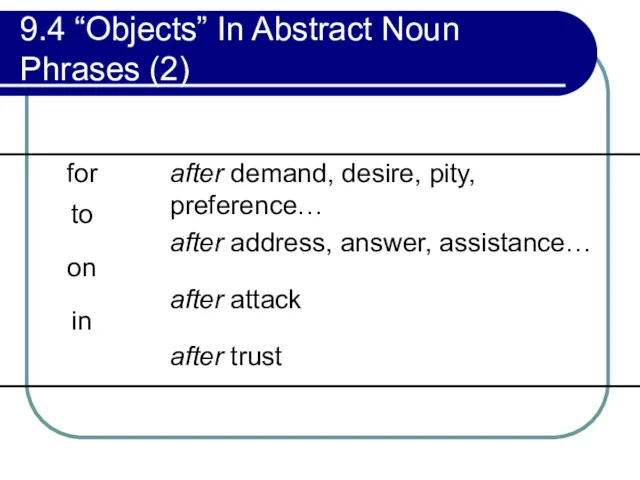
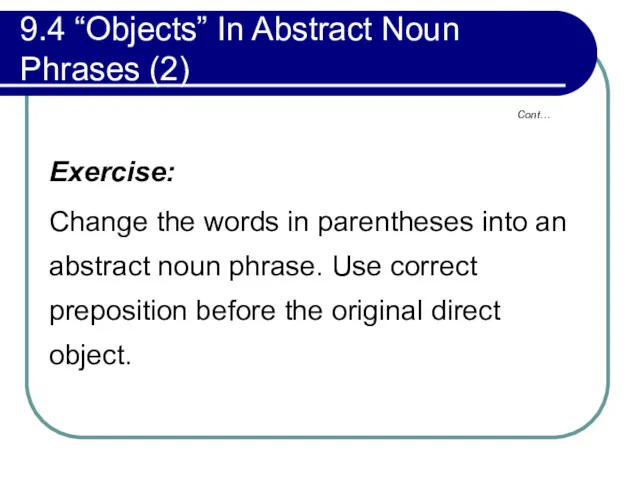
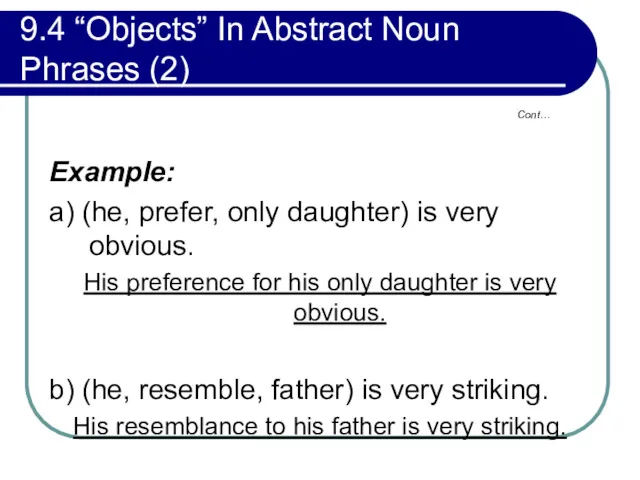
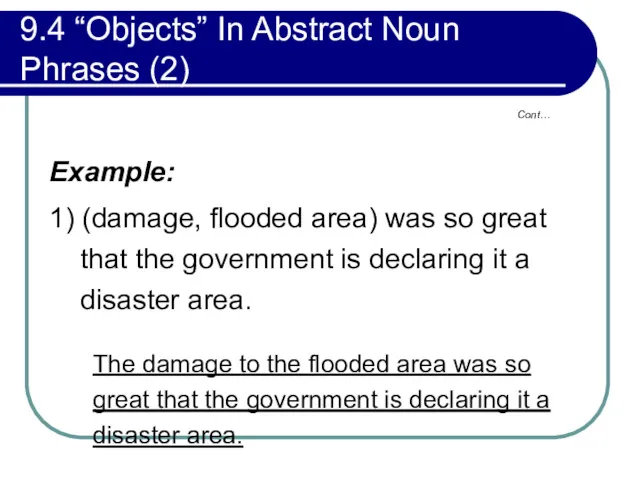
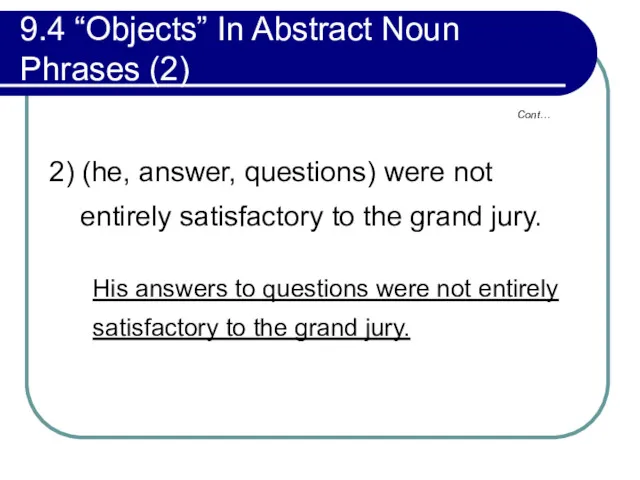
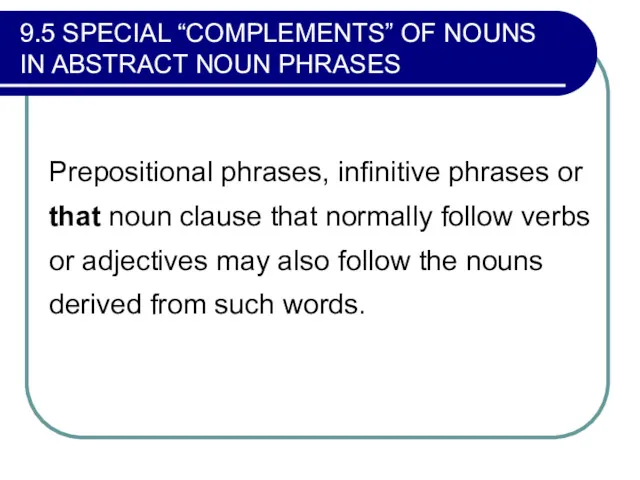
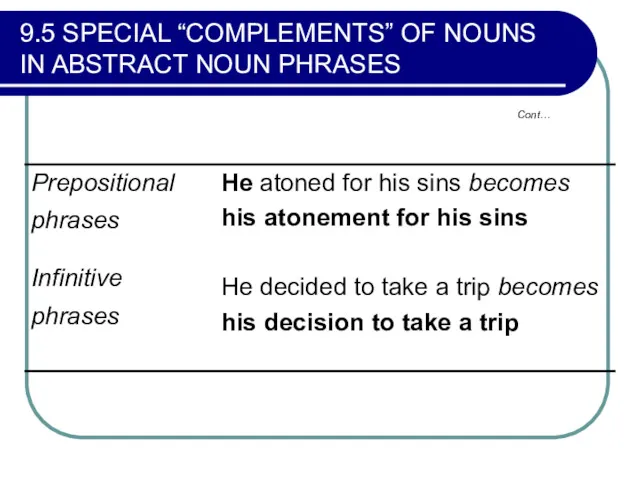
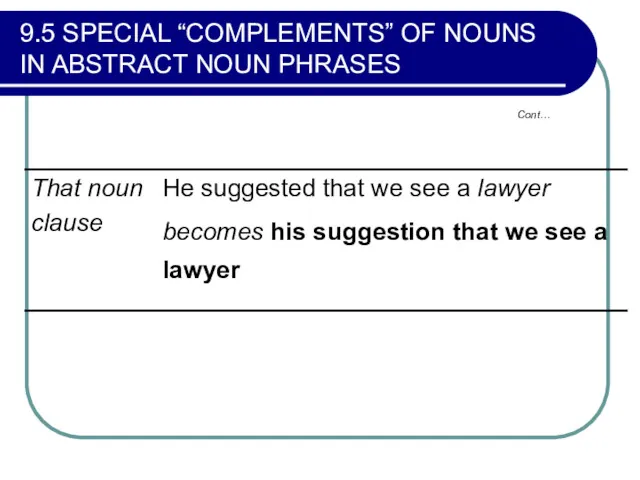
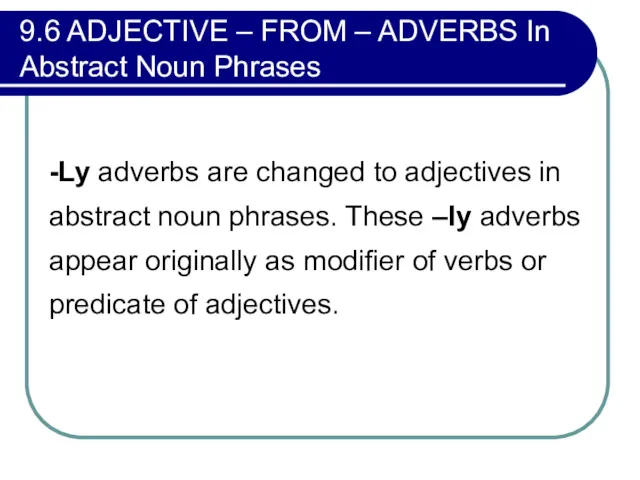
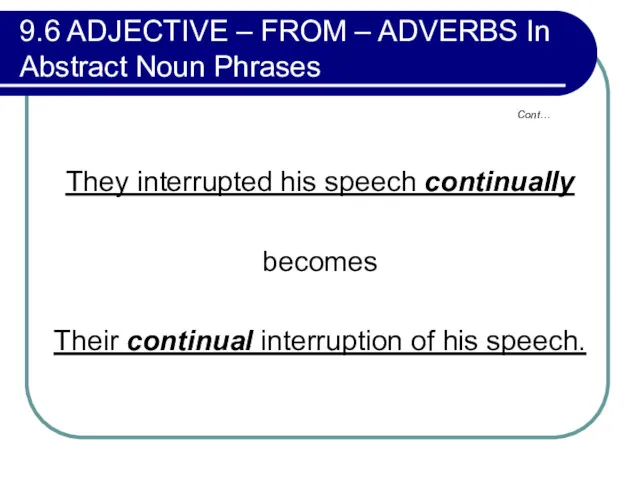
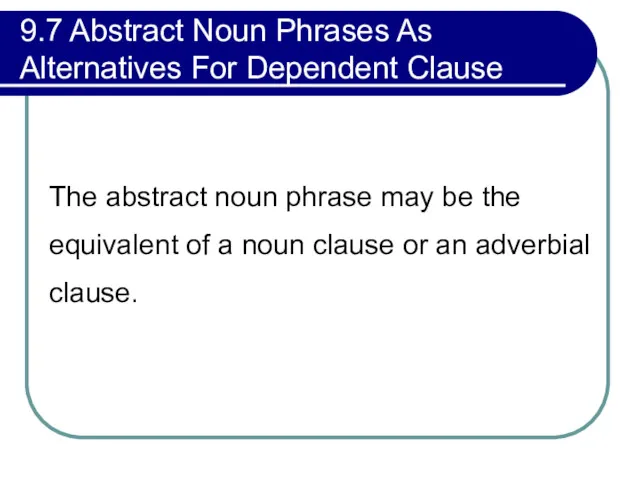
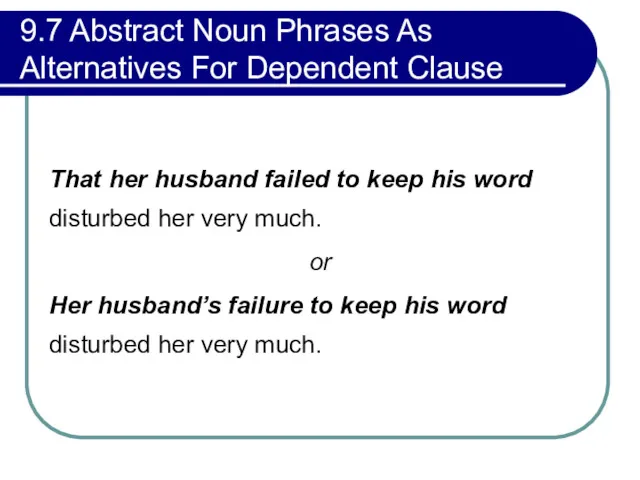
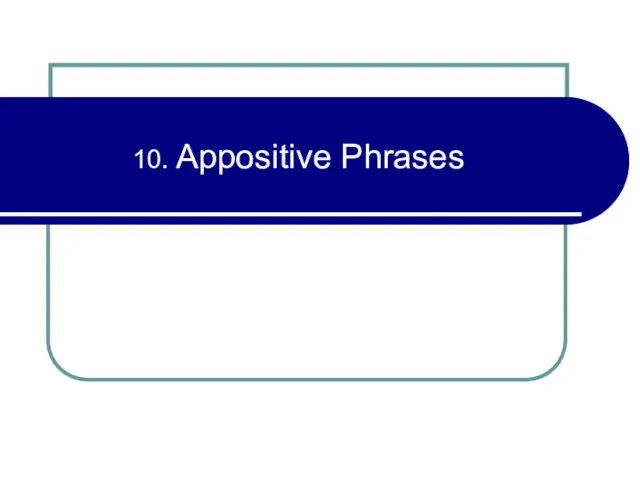
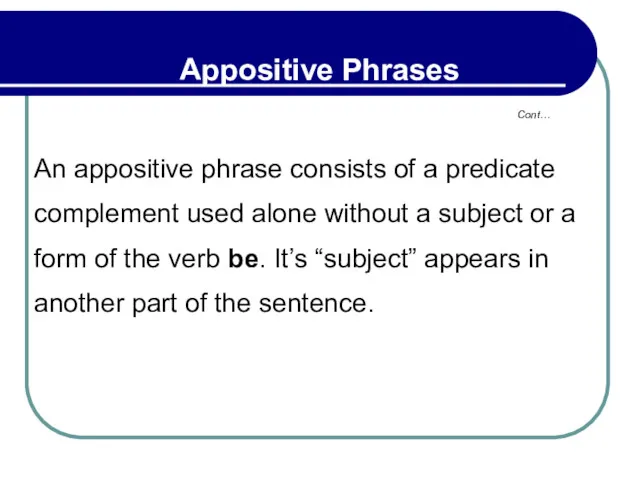
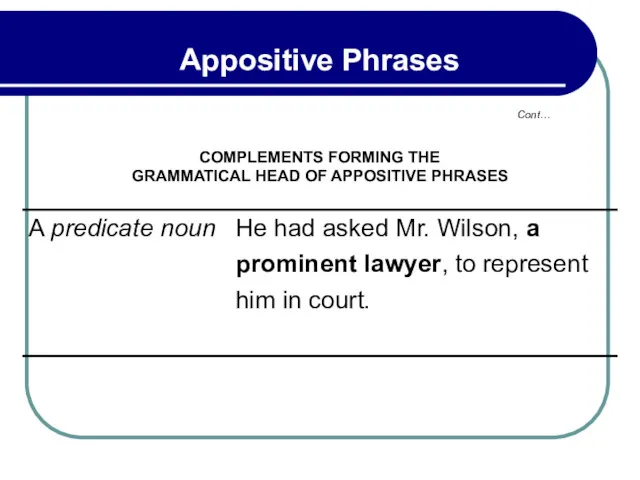
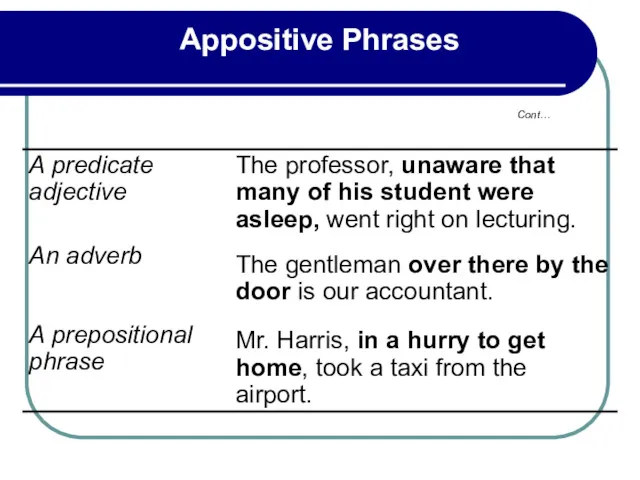
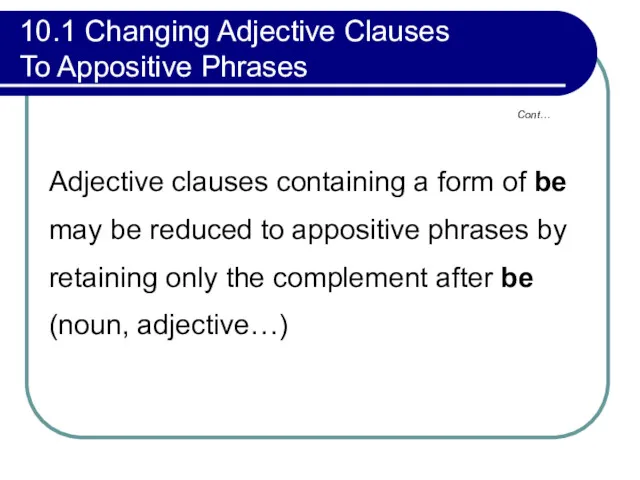
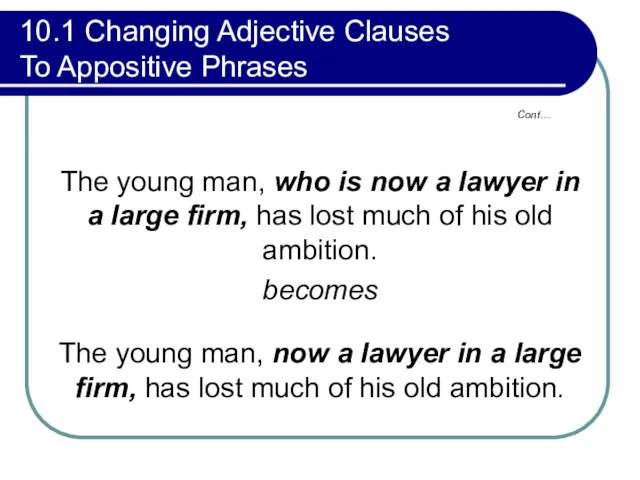
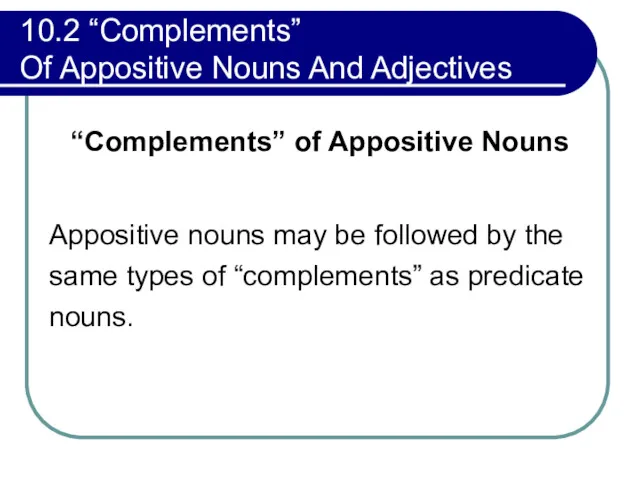
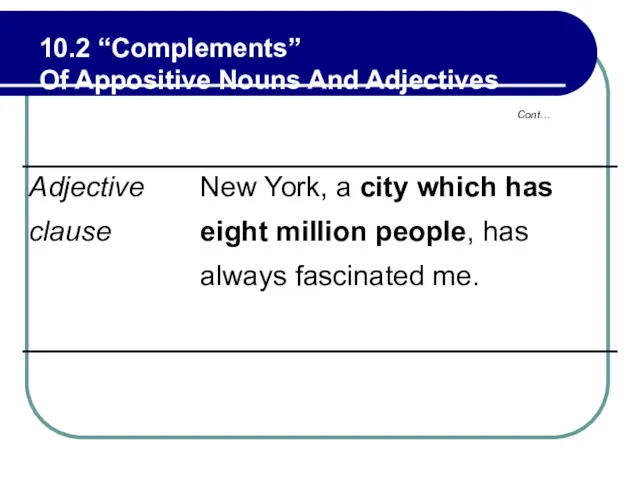
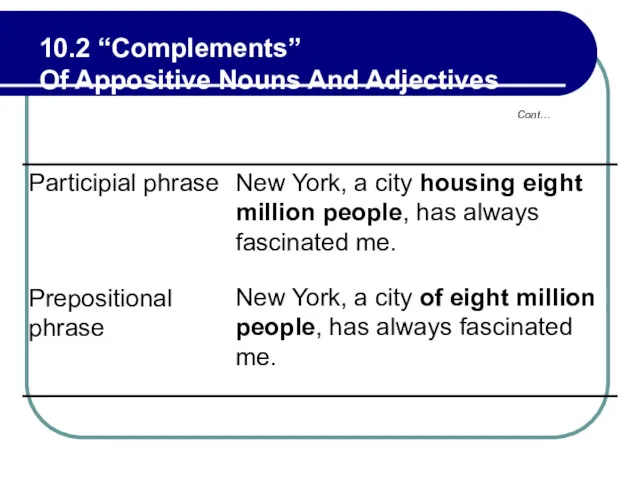
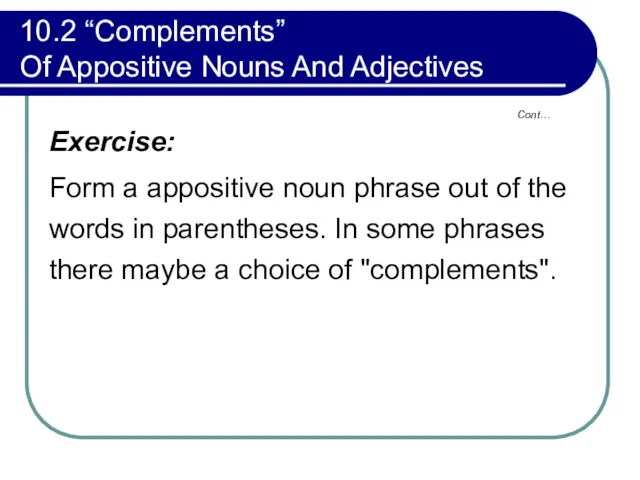
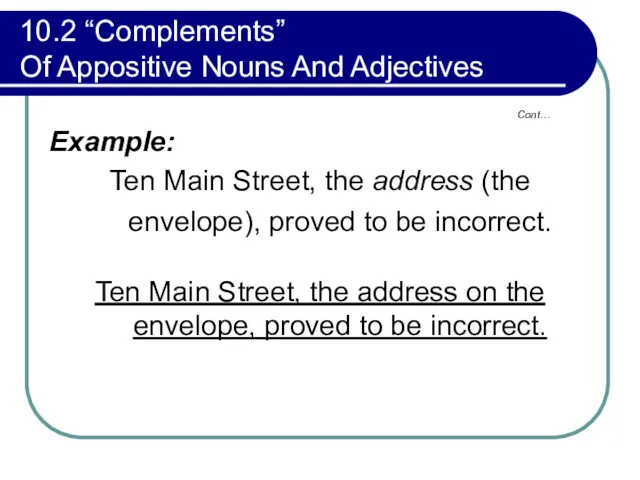
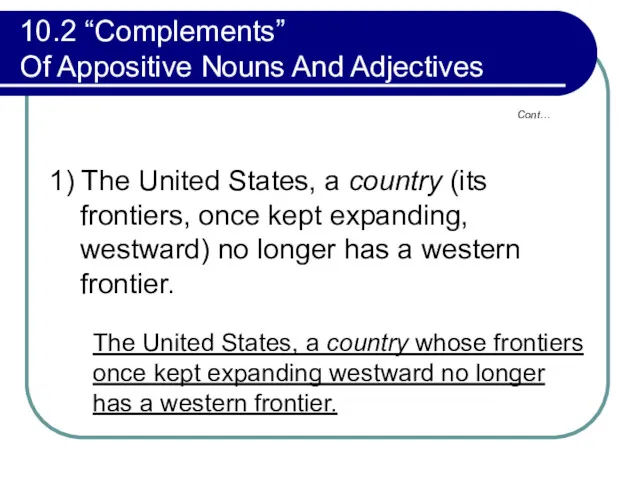
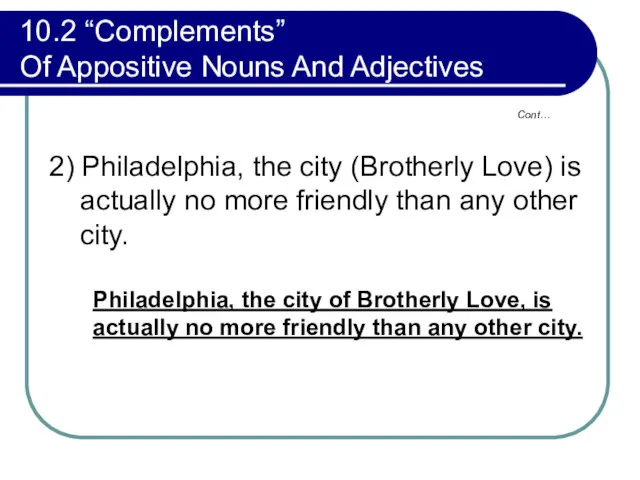
 Своя игра. Спорт. Числа и игрушки. Профессия. Грамматика
Своя игра. Спорт. Числа и игрушки. Профессия. Грамматика Reading and writing
Reading and writing Sport equipment
Sport equipment My personality and choice of future profession
My personality and choice of future profession Halloween
Halloween Managing challenging feedback
Managing challenging feedback Christmas in England
Christmas in England Environmental pollution
Environmental pollution Out of the ordinary
Out of the ordinary МЦКО Английский язык 2021
МЦКО Английский язык 2021 Preparing a report
Preparing a report My favourite food
My favourite food Newts
Newts Random questions. What is where
Random questions. What is where -ing form, to-infinitive, bare infinitive
-ing form, to-infinitive, bare infinitive Our faculty
Our faculty Avatar. About film
Avatar. About film What do they do in their free time
What do they do in their free time BMW is a German automobile, motorcycle and engine manufacturing company
BMW is a German automobile, motorcycle and engine manufacturing company Man-made and natural environmental disasters
Man-made and natural environmental disasters Device of the future. Oculus rift
Device of the future. Oculus rift Порядок слов в предложении. Общий вопрос. Специальный вопрос. Закрепление
Порядок слов в предложении. Общий вопрос. Специальный вопрос. Закрепление FIFA 2018
FIFA 2018 Present continuous
Present continuous Moscow is the capital of Russia
Moscow is the capital of Russia The United Kingdom
The United Kingdom Speaking tasks for intermediate oral exams
Speaking tasks for intermediate oral exams All About Pancake Day
All About Pancake Day